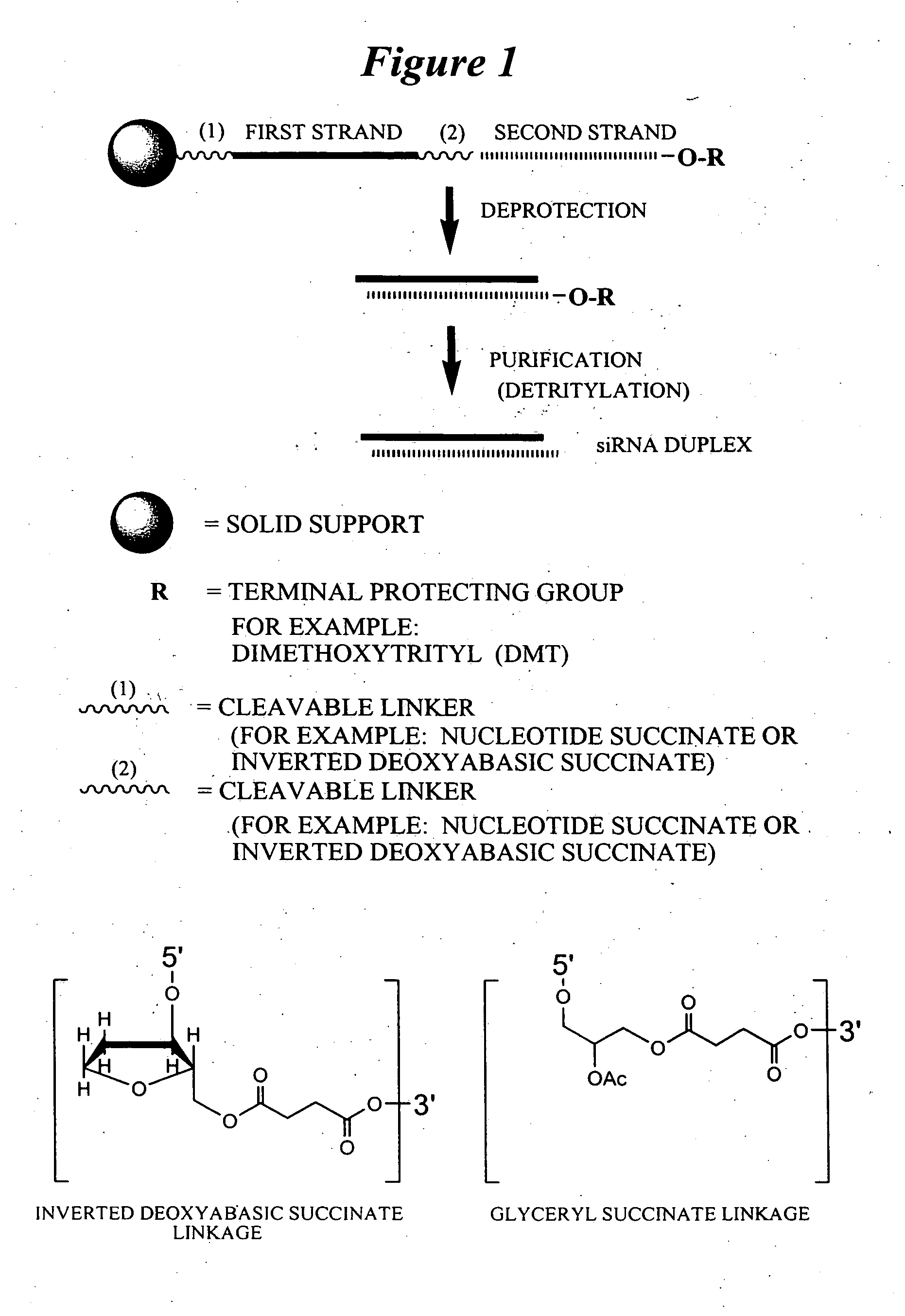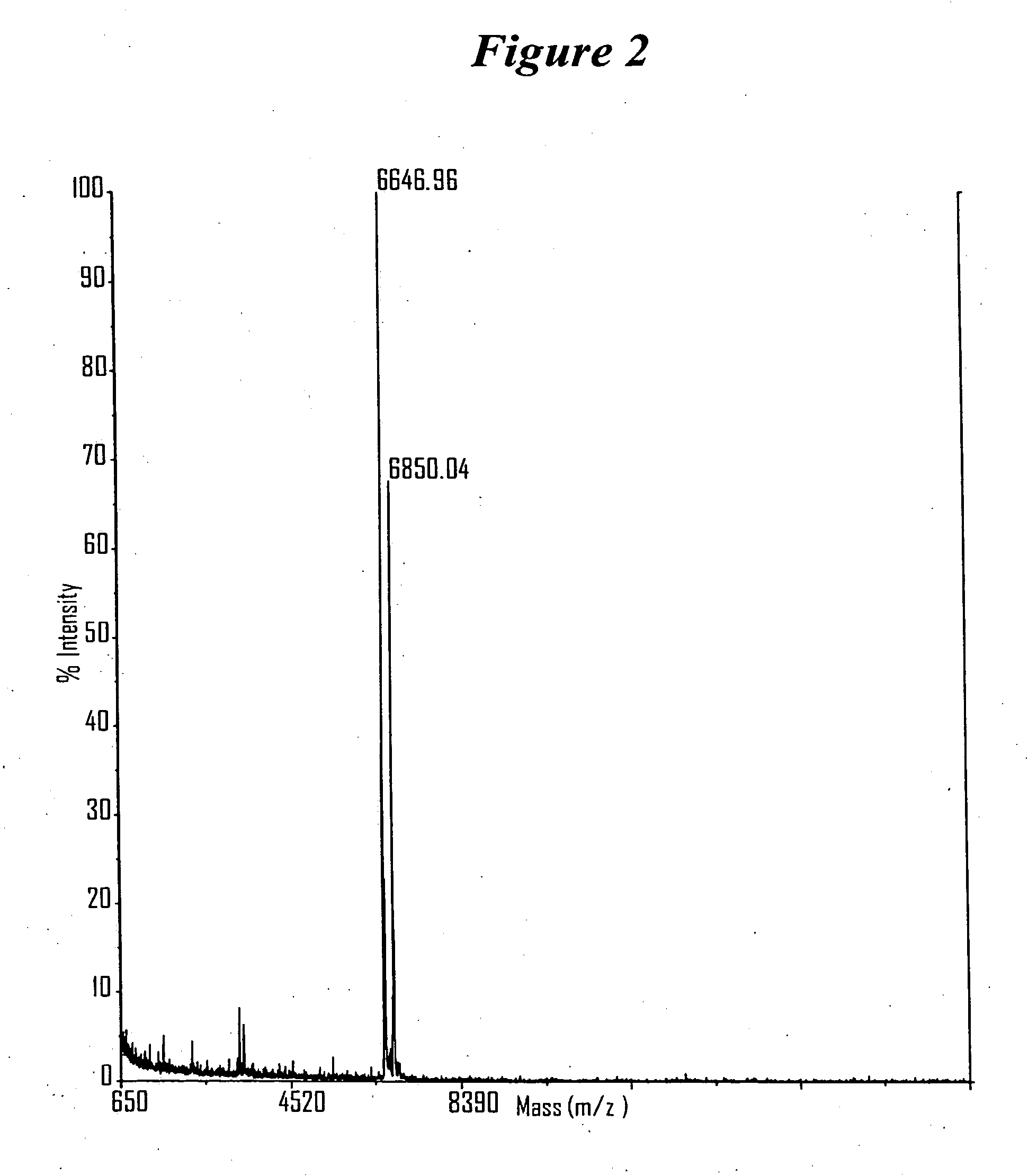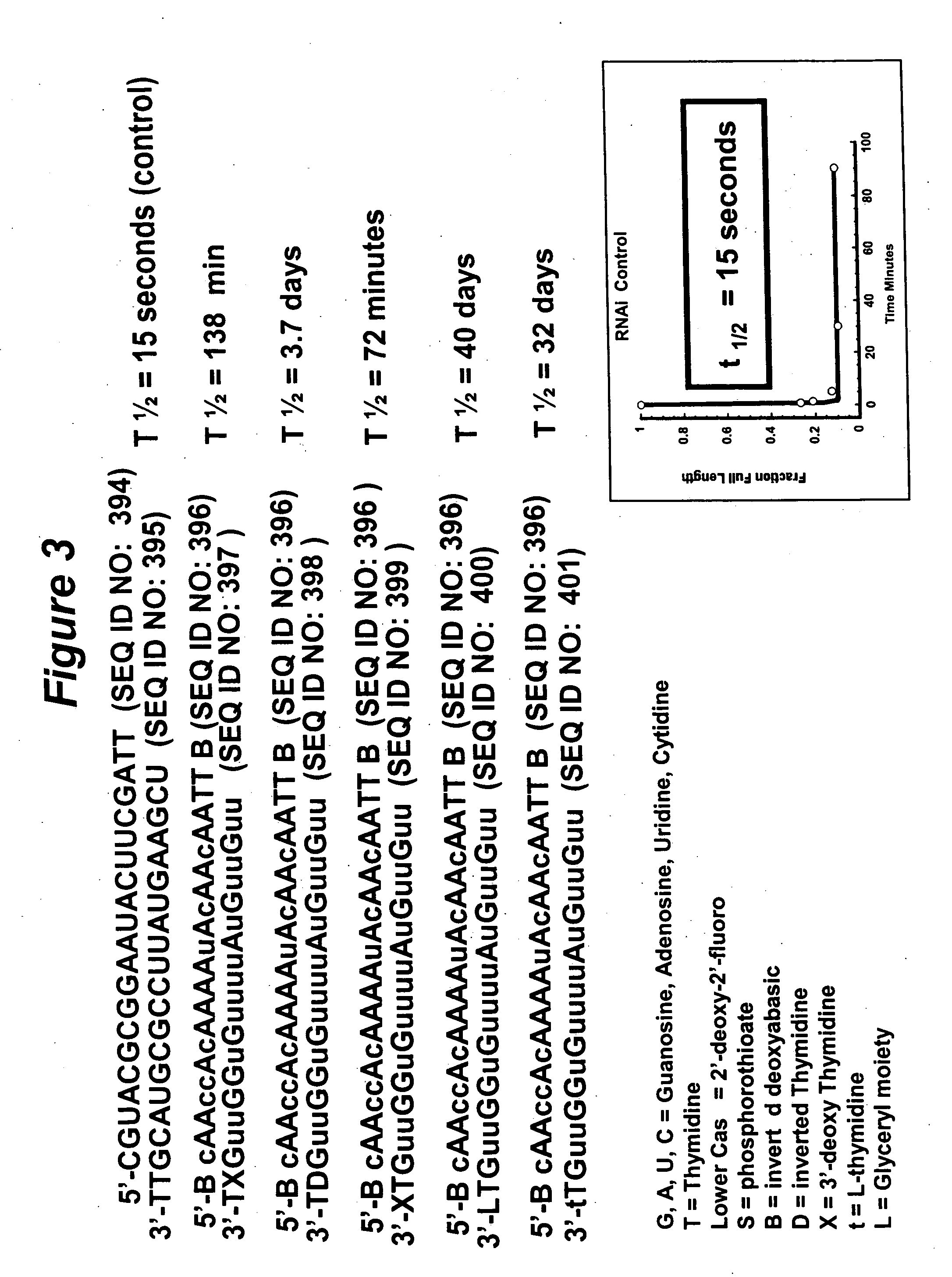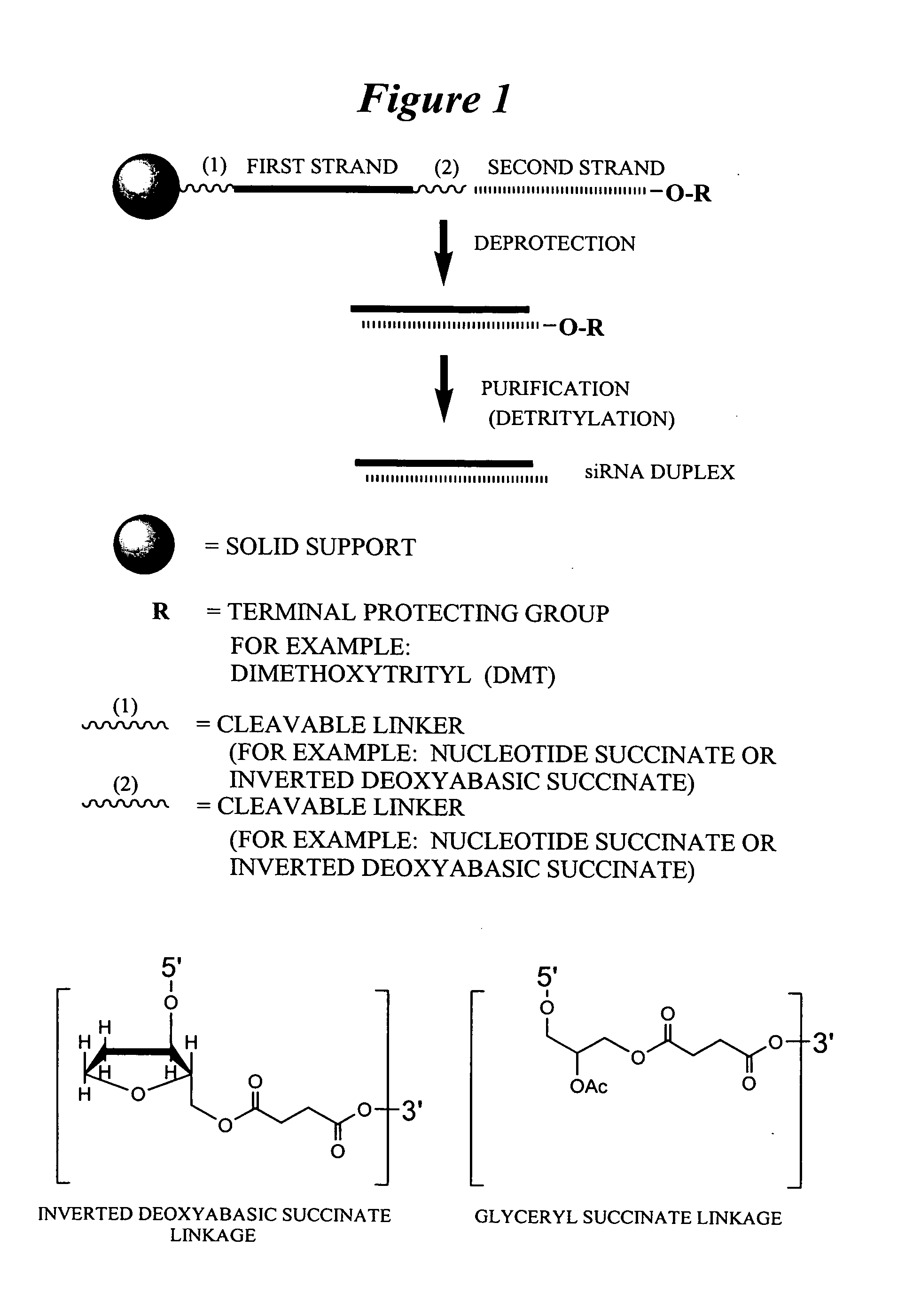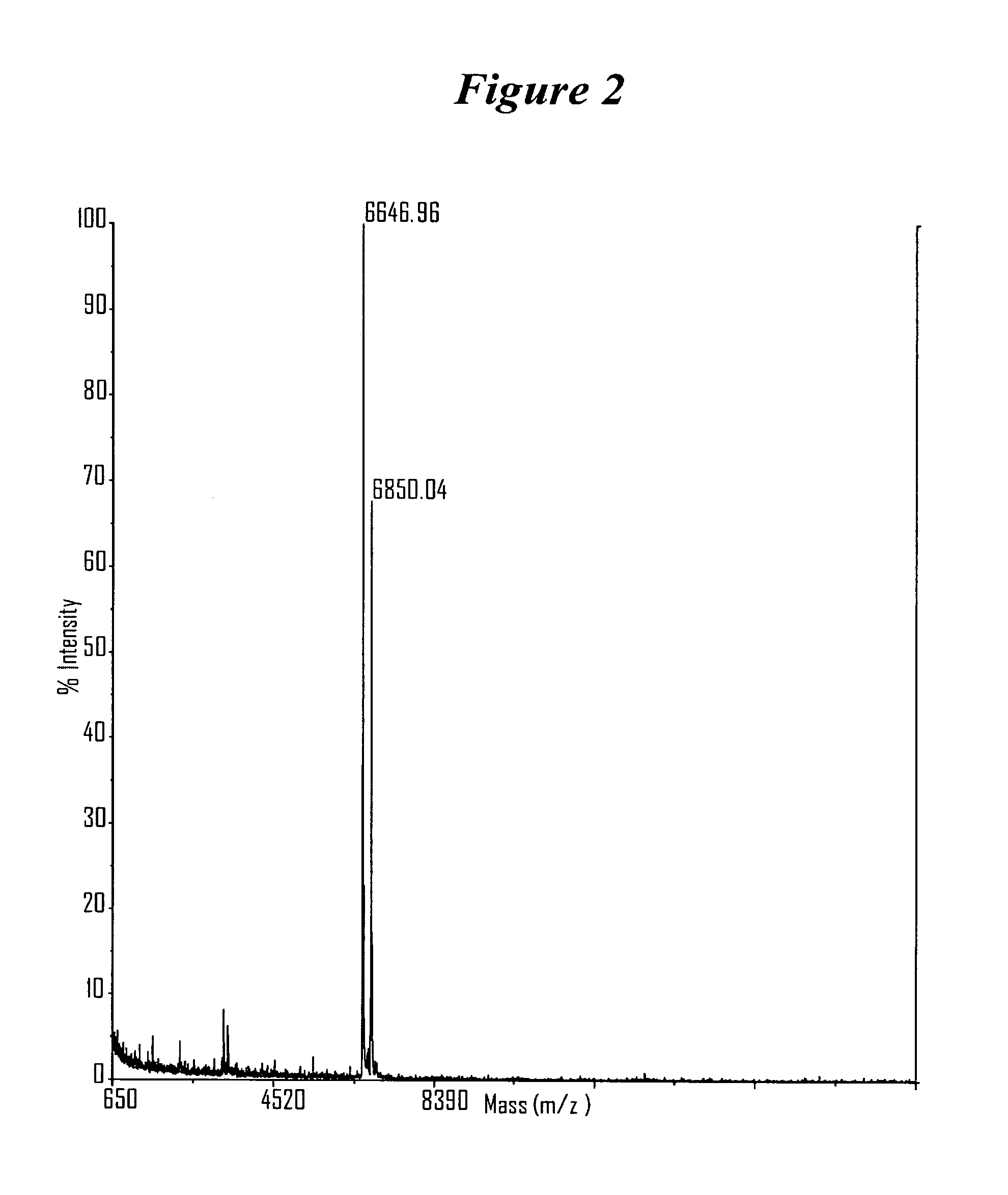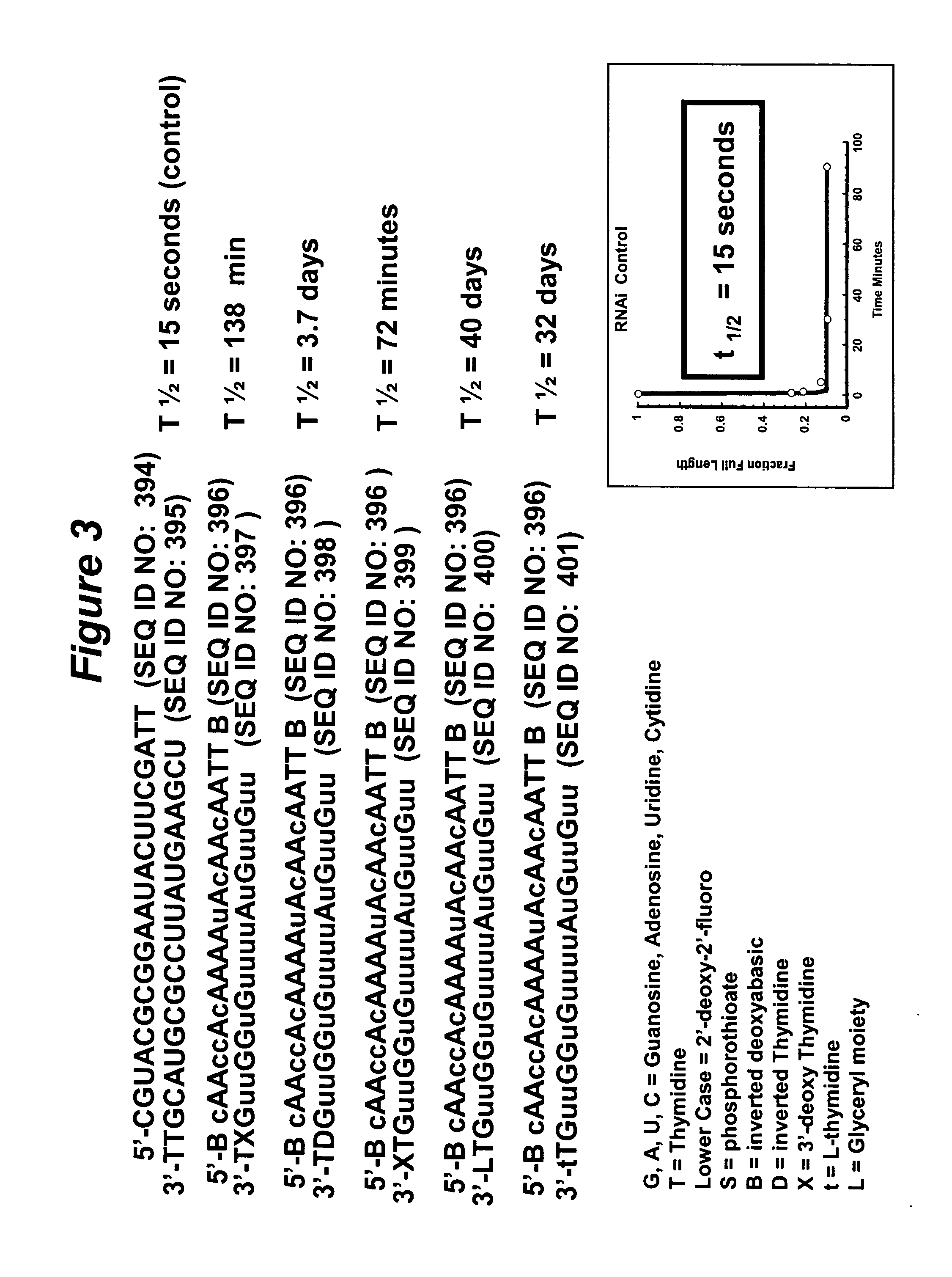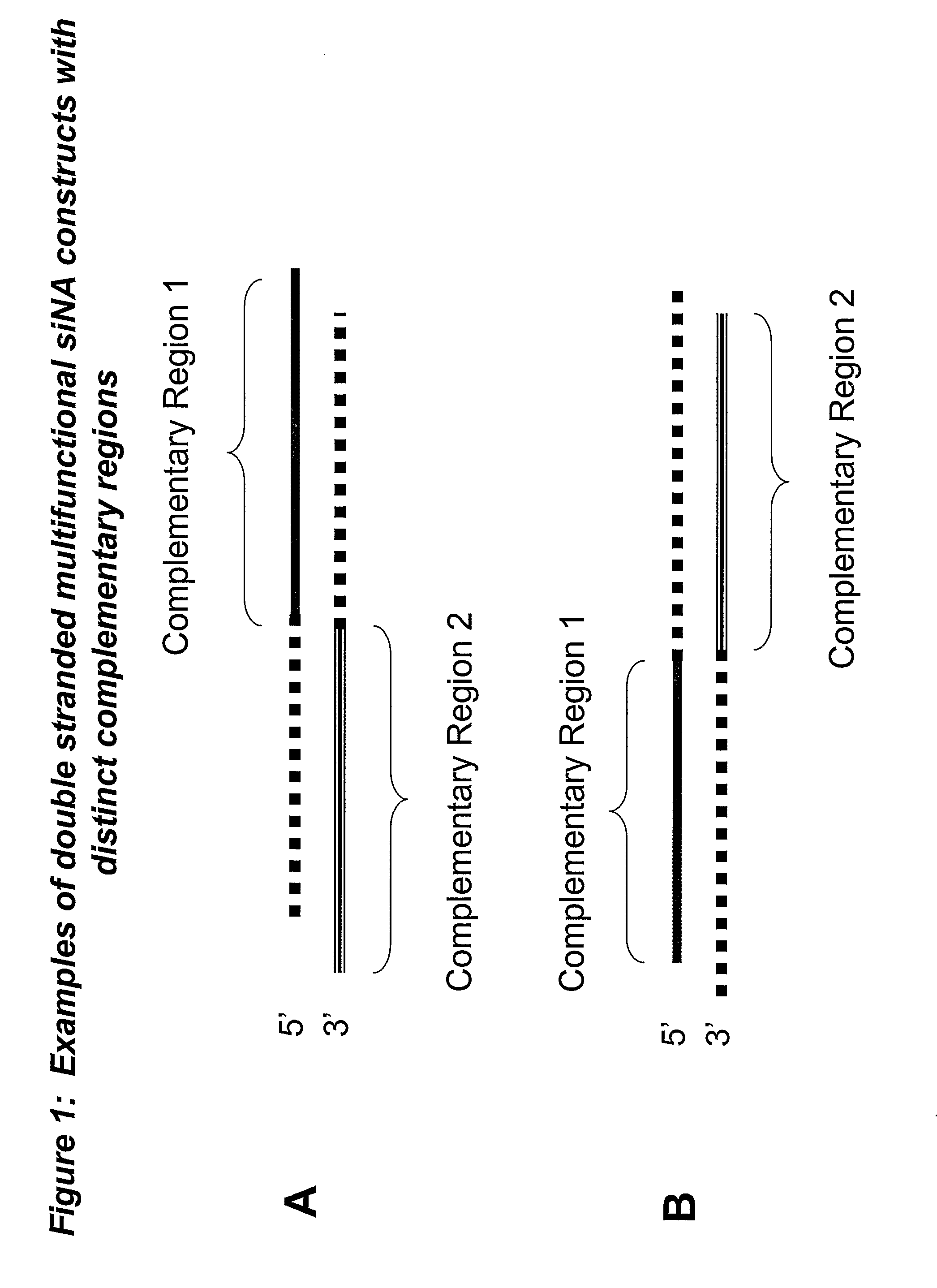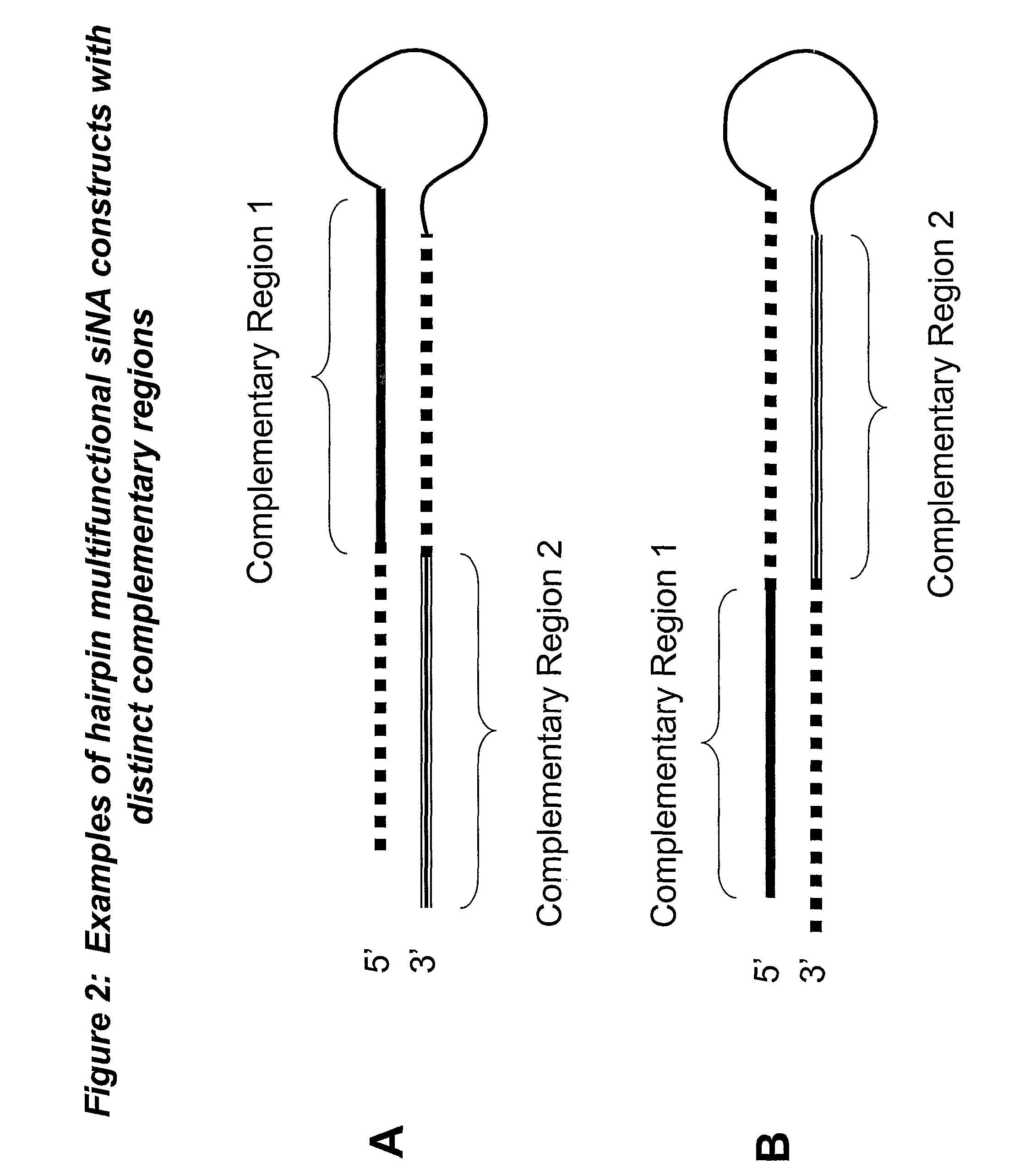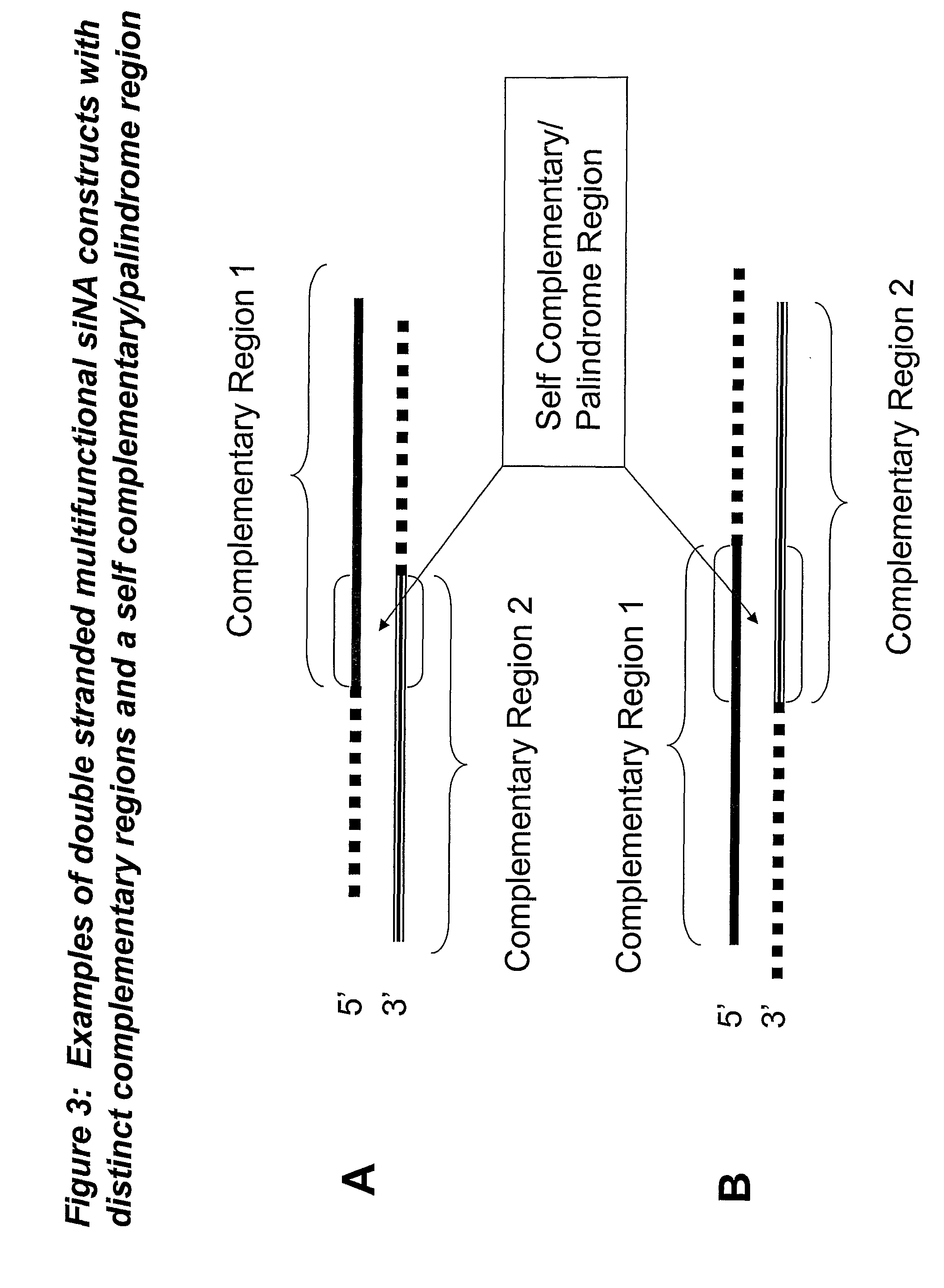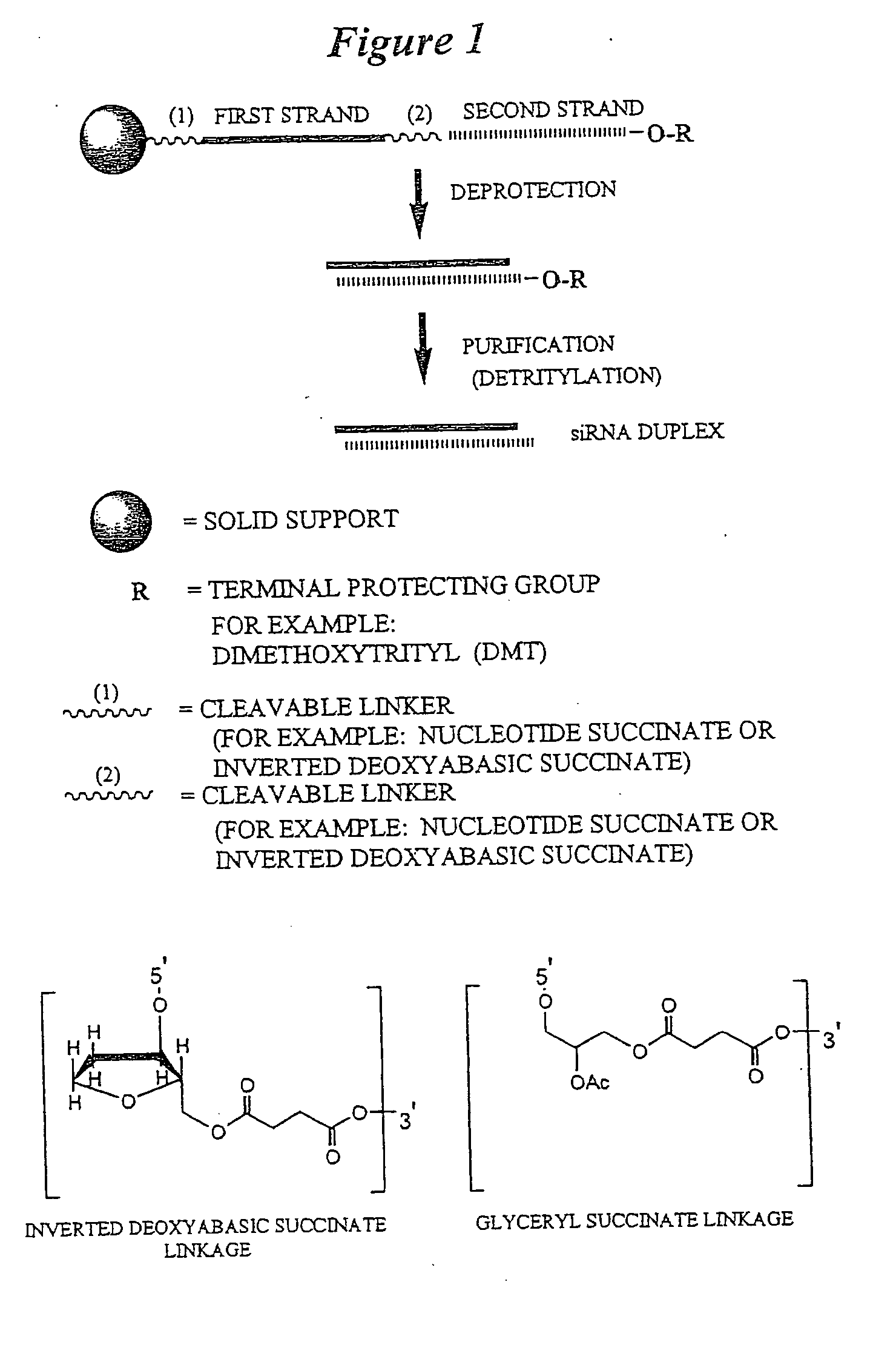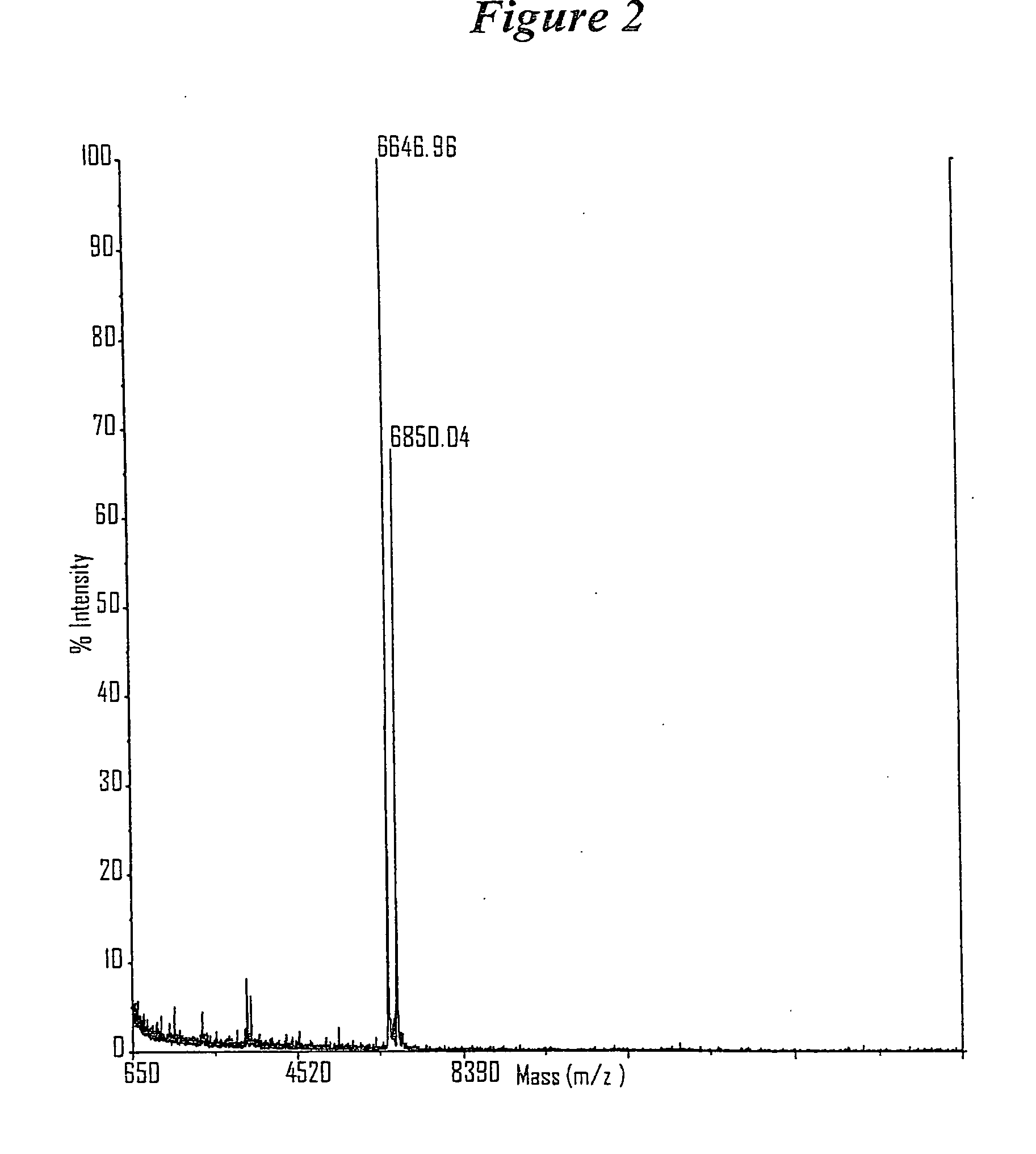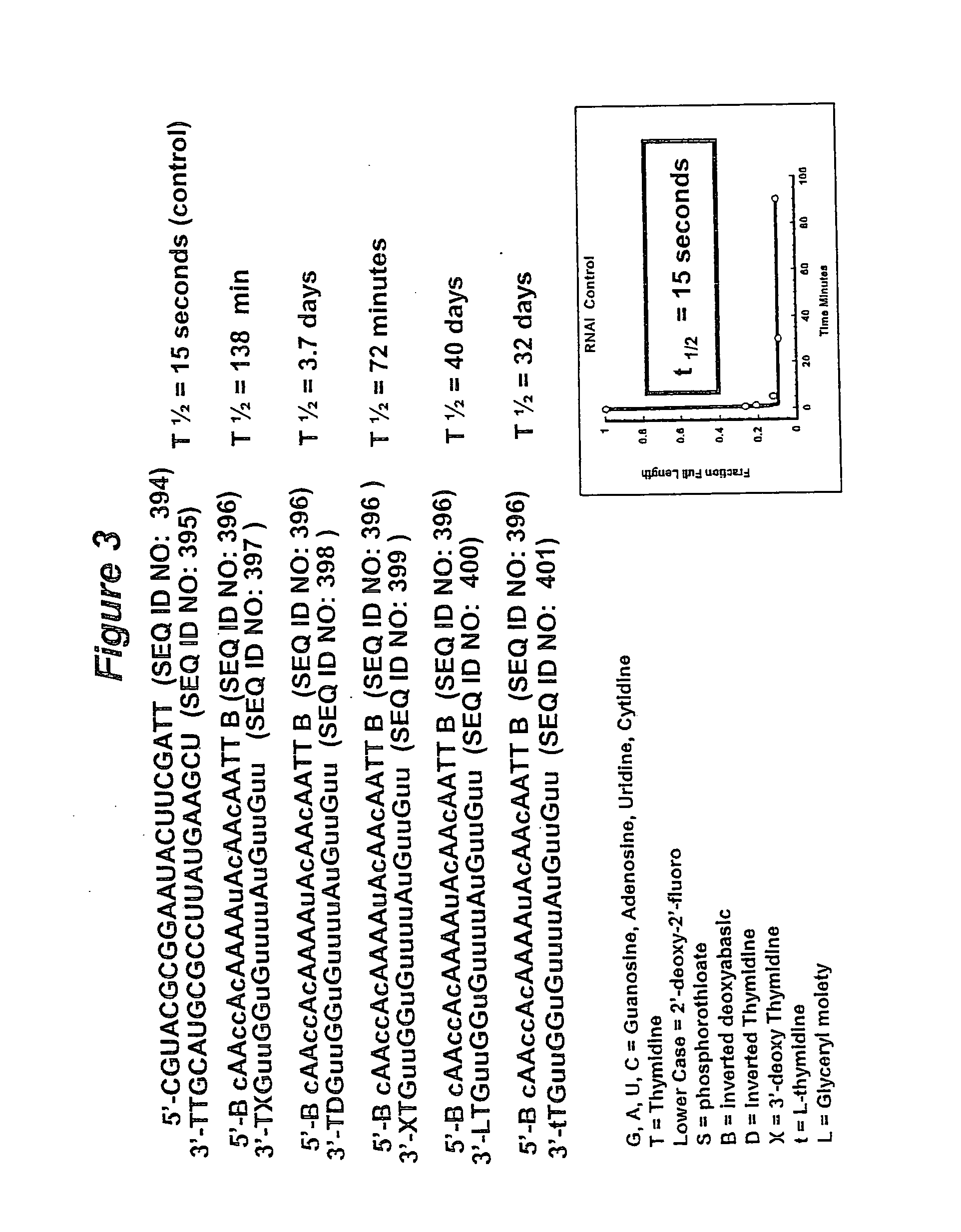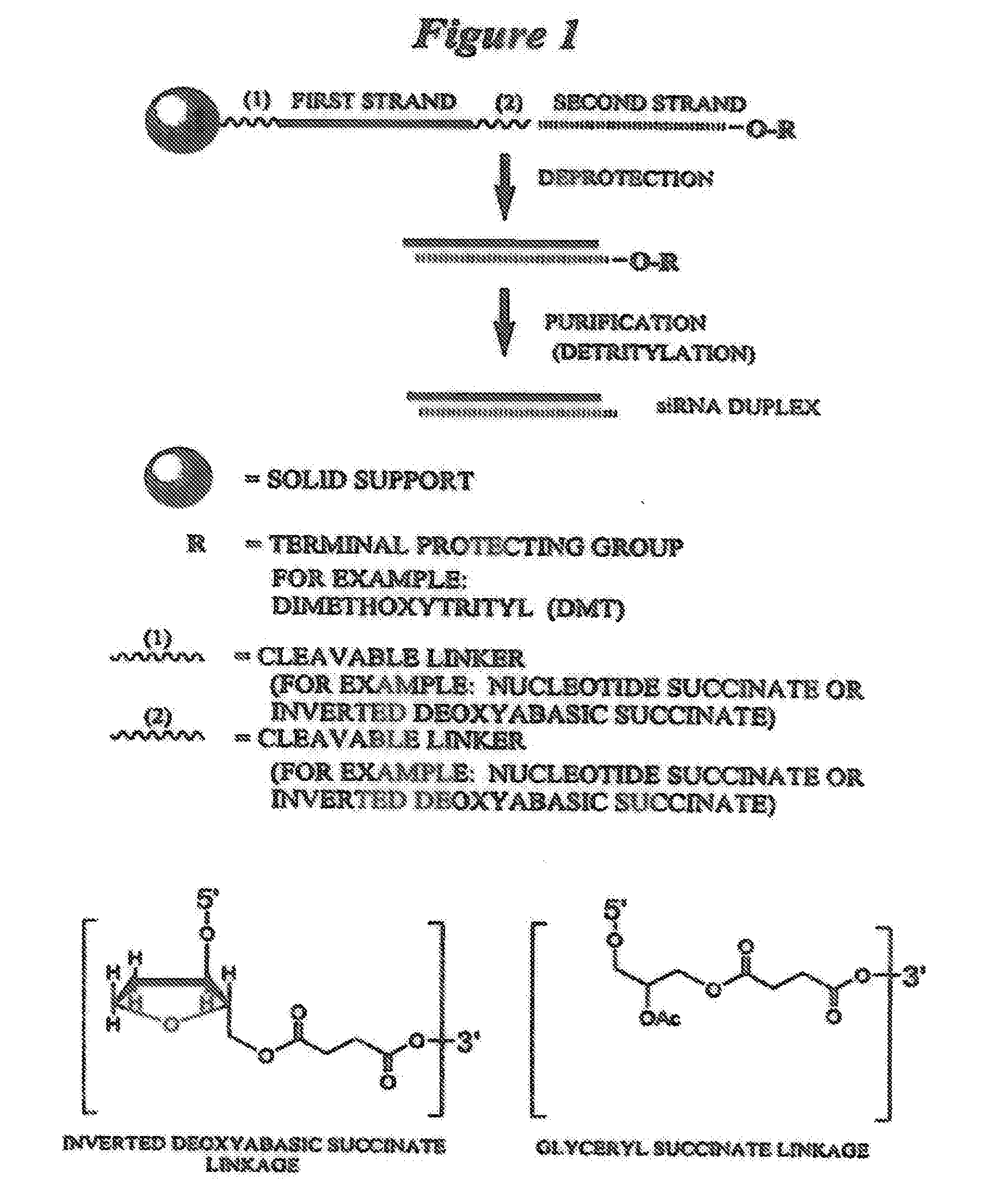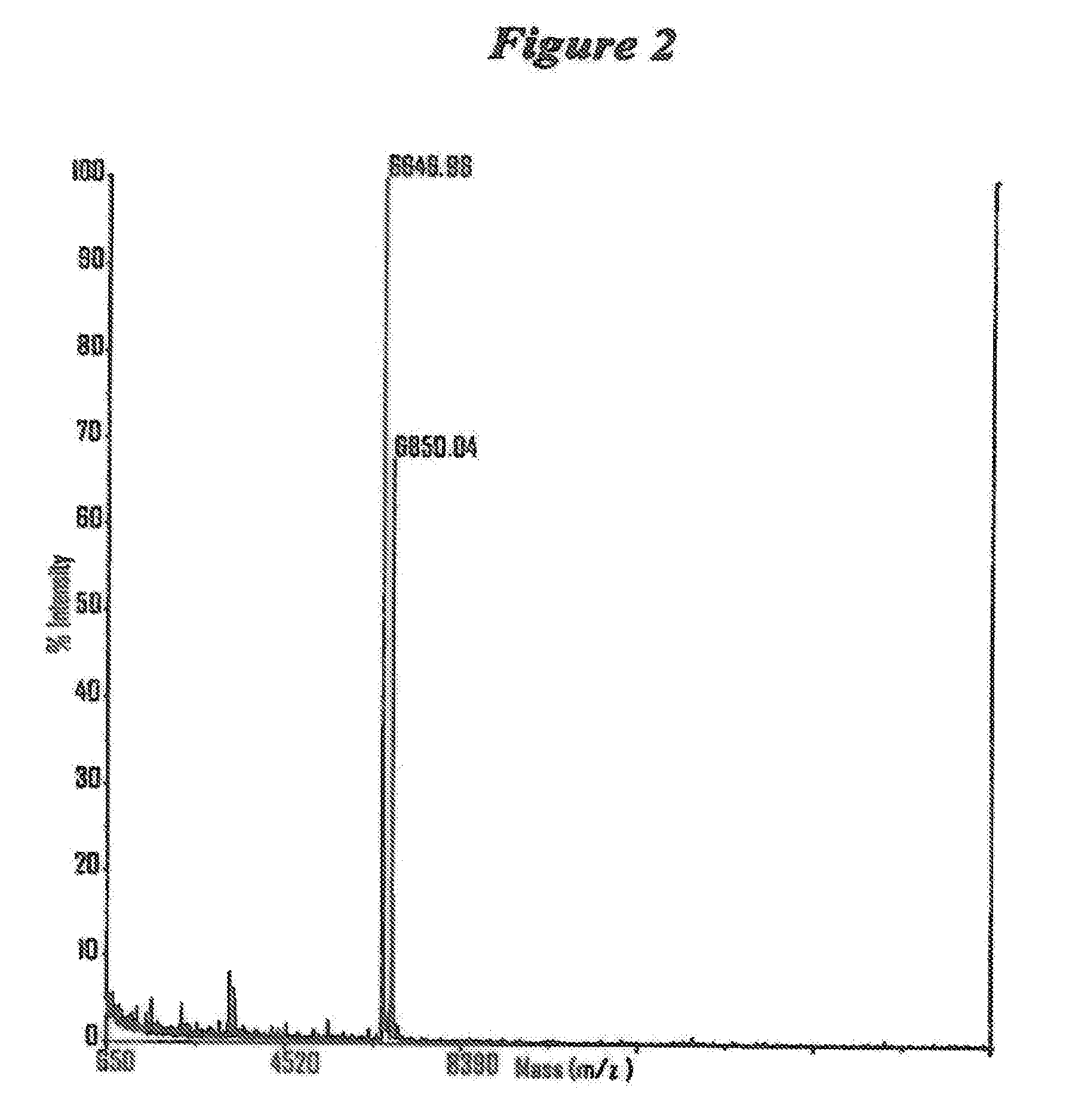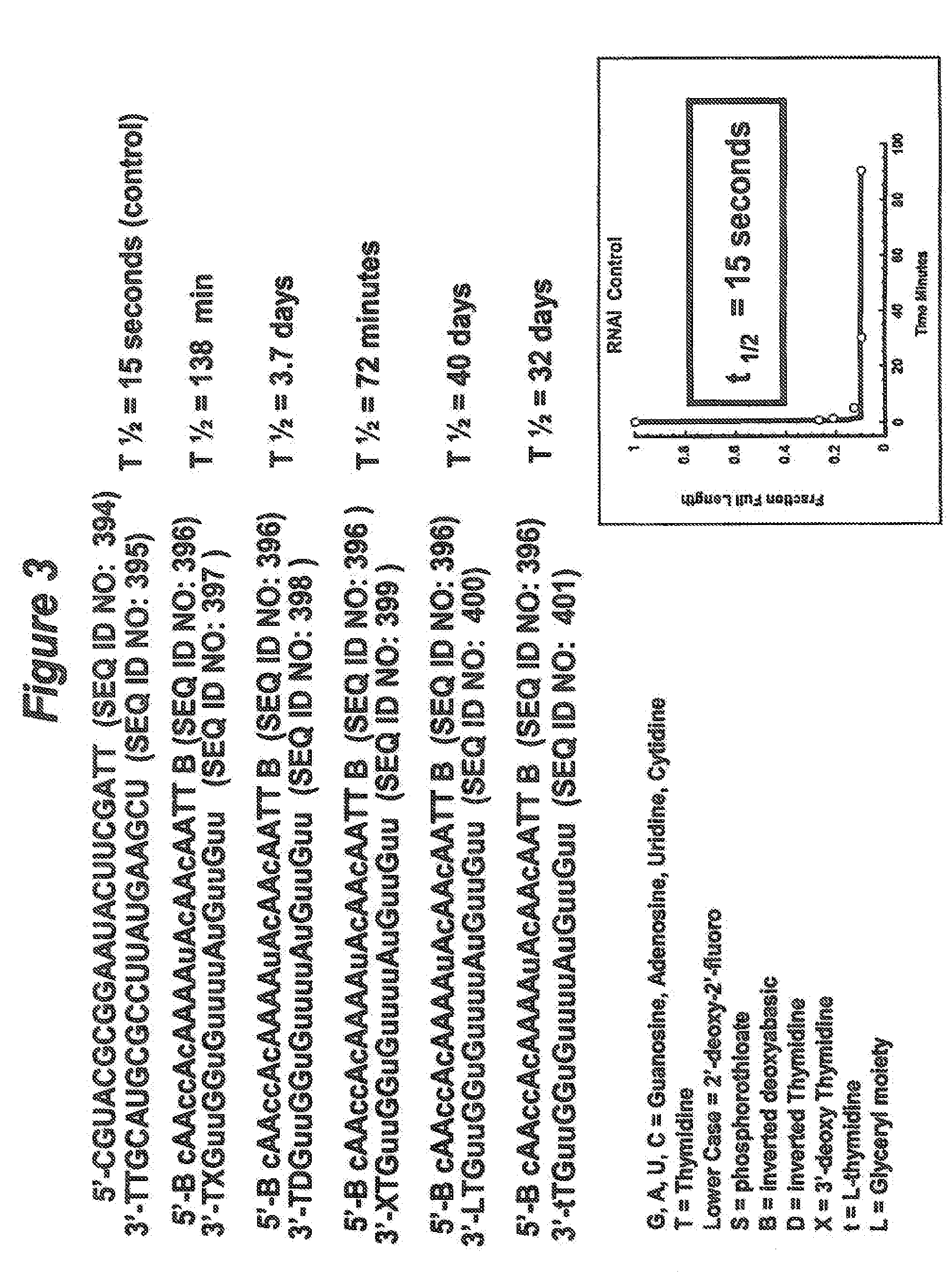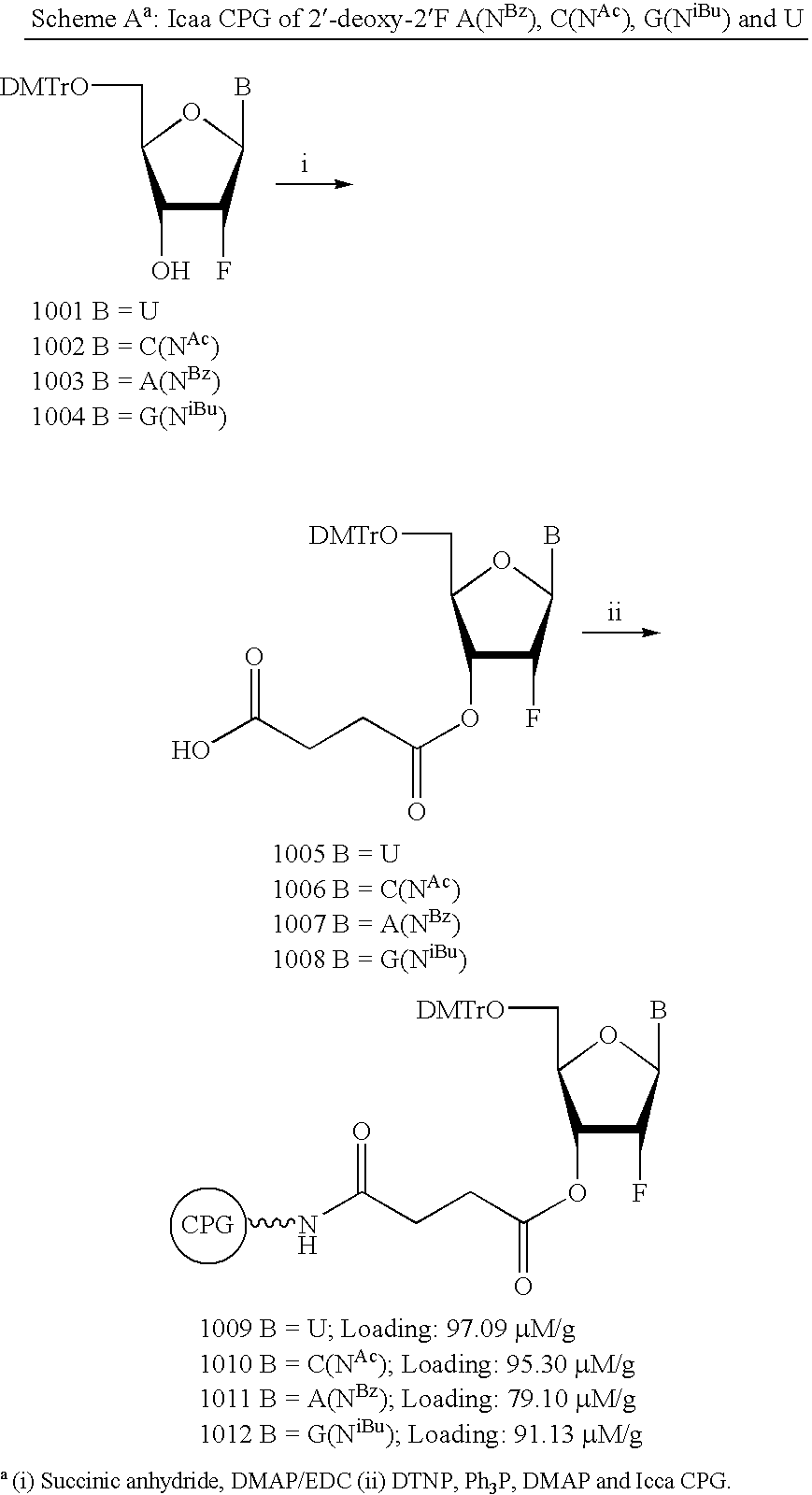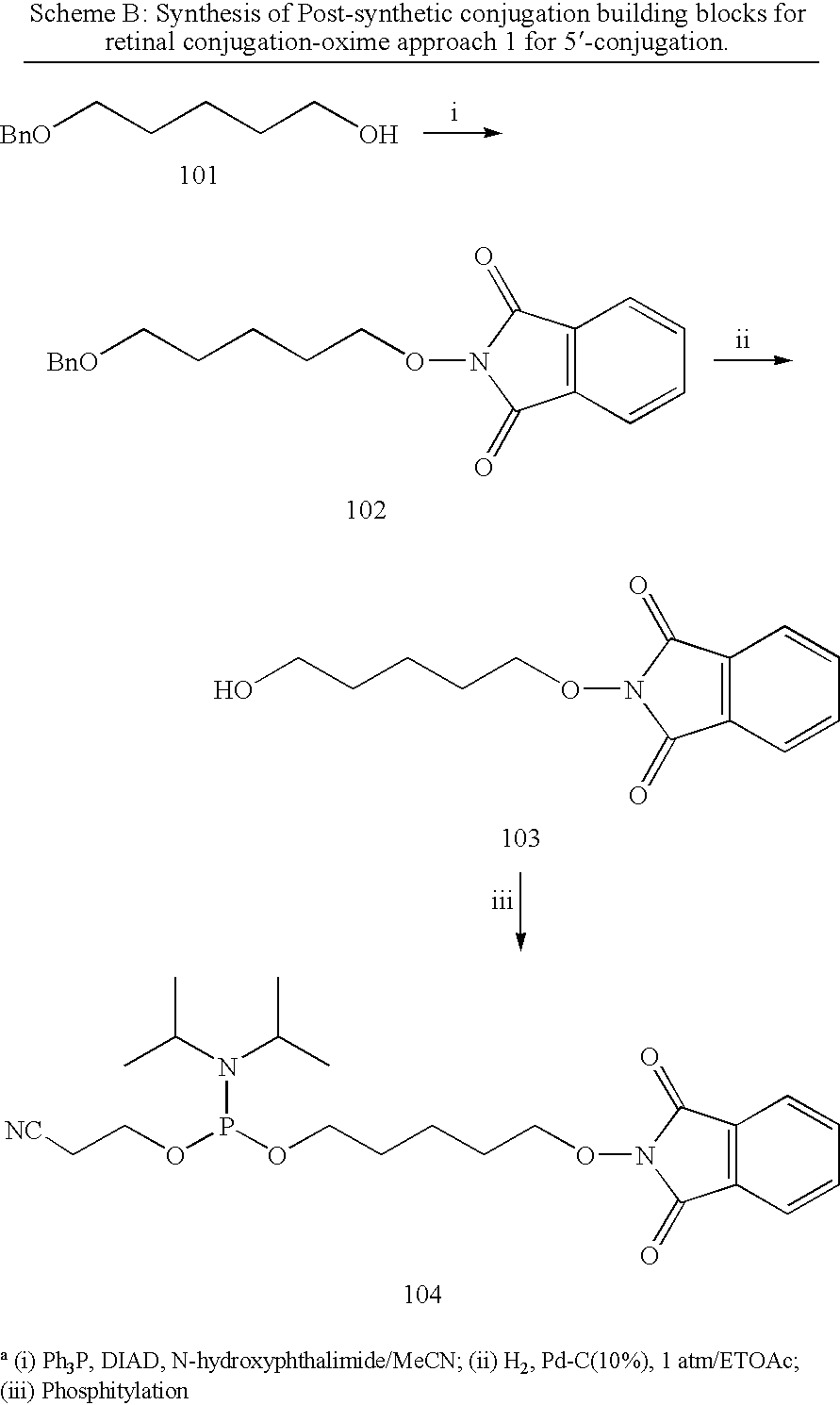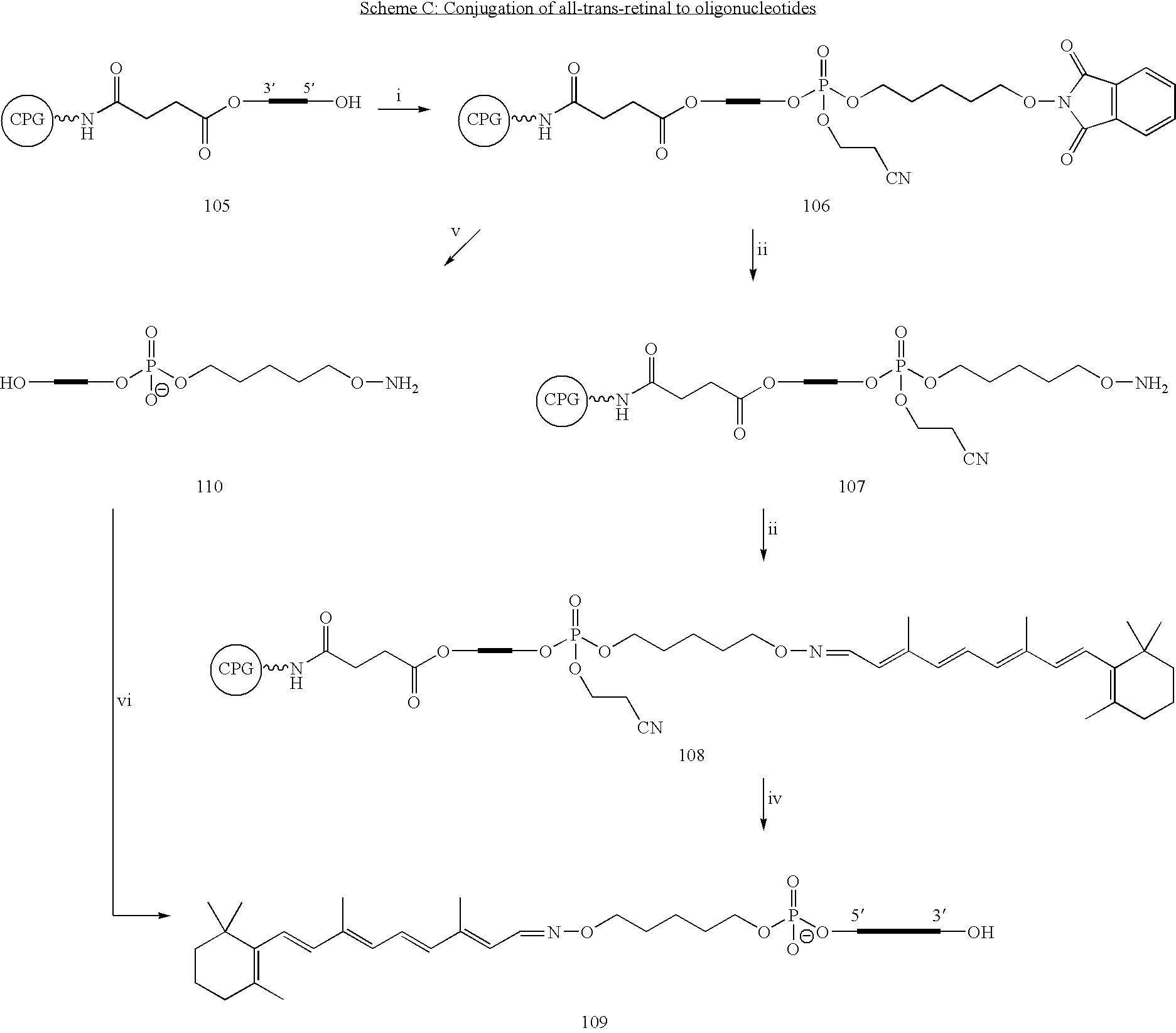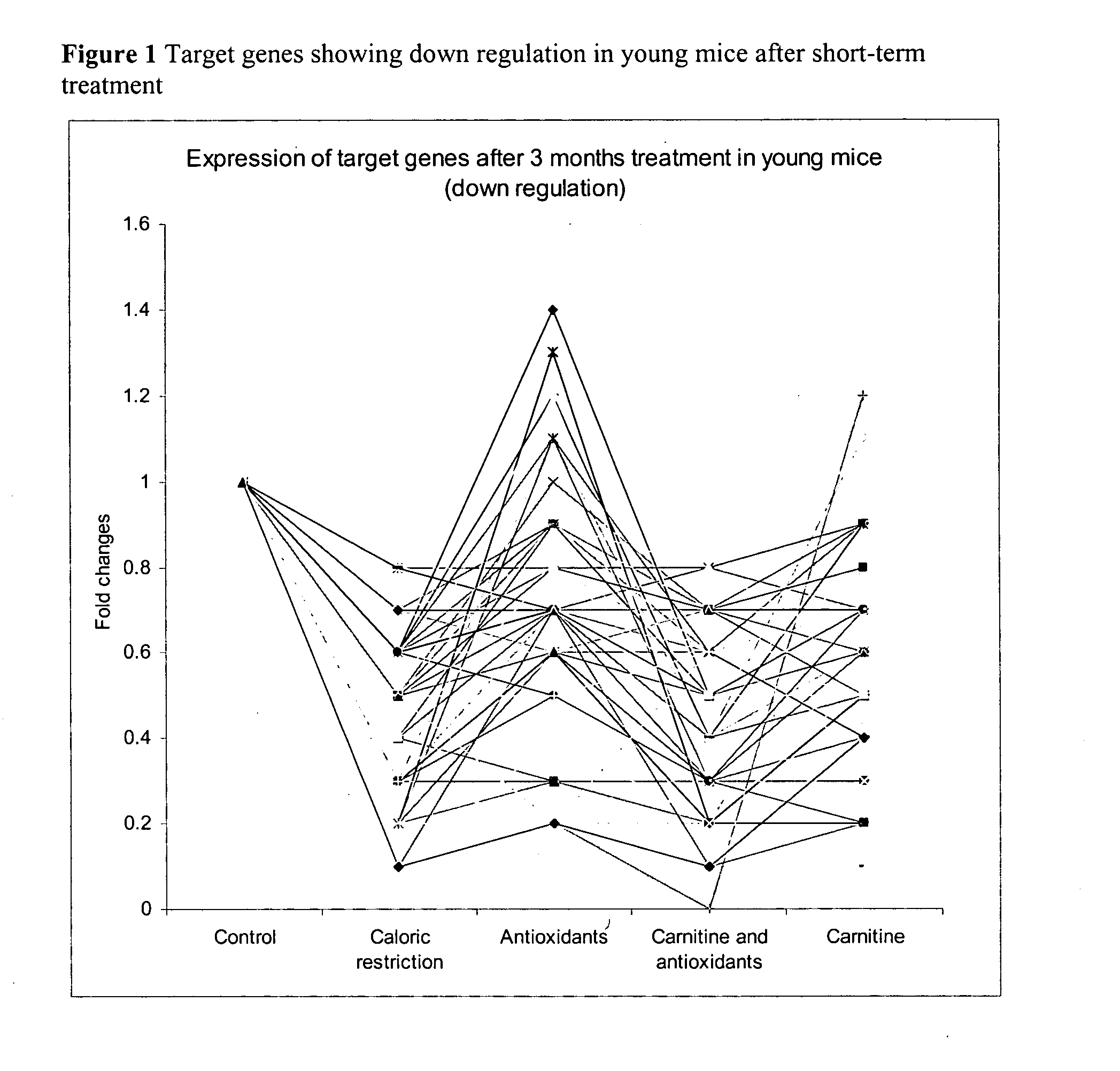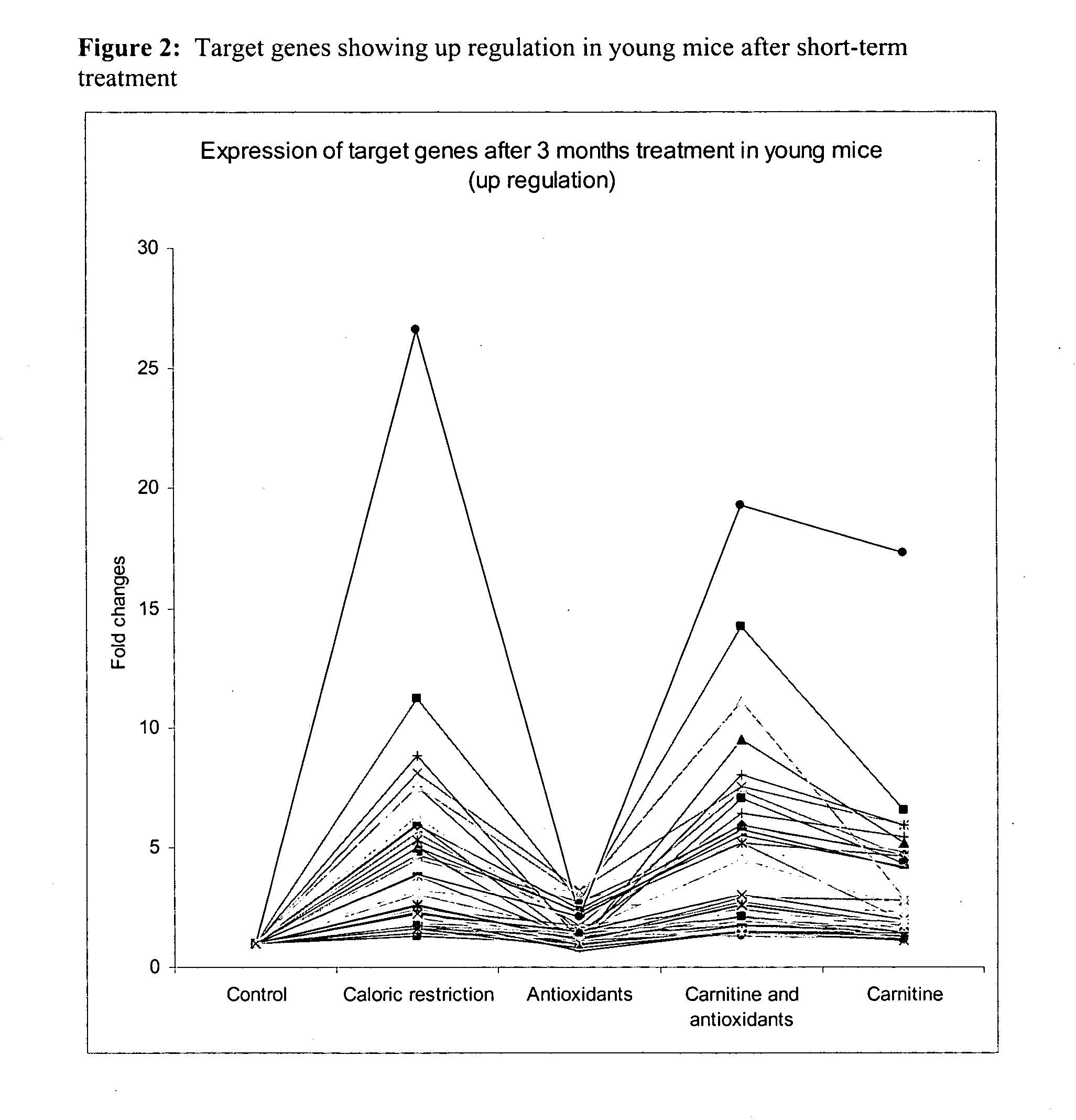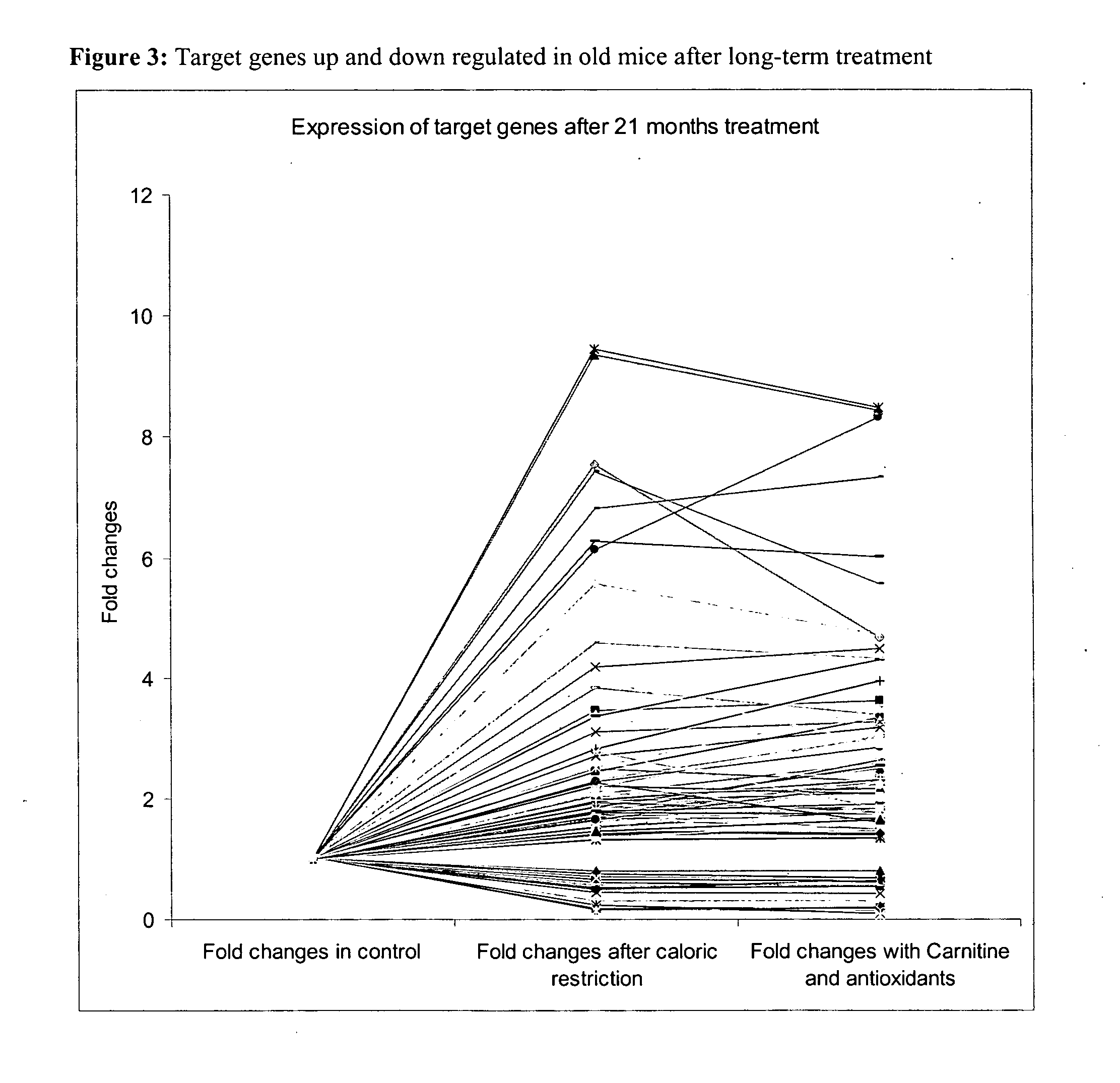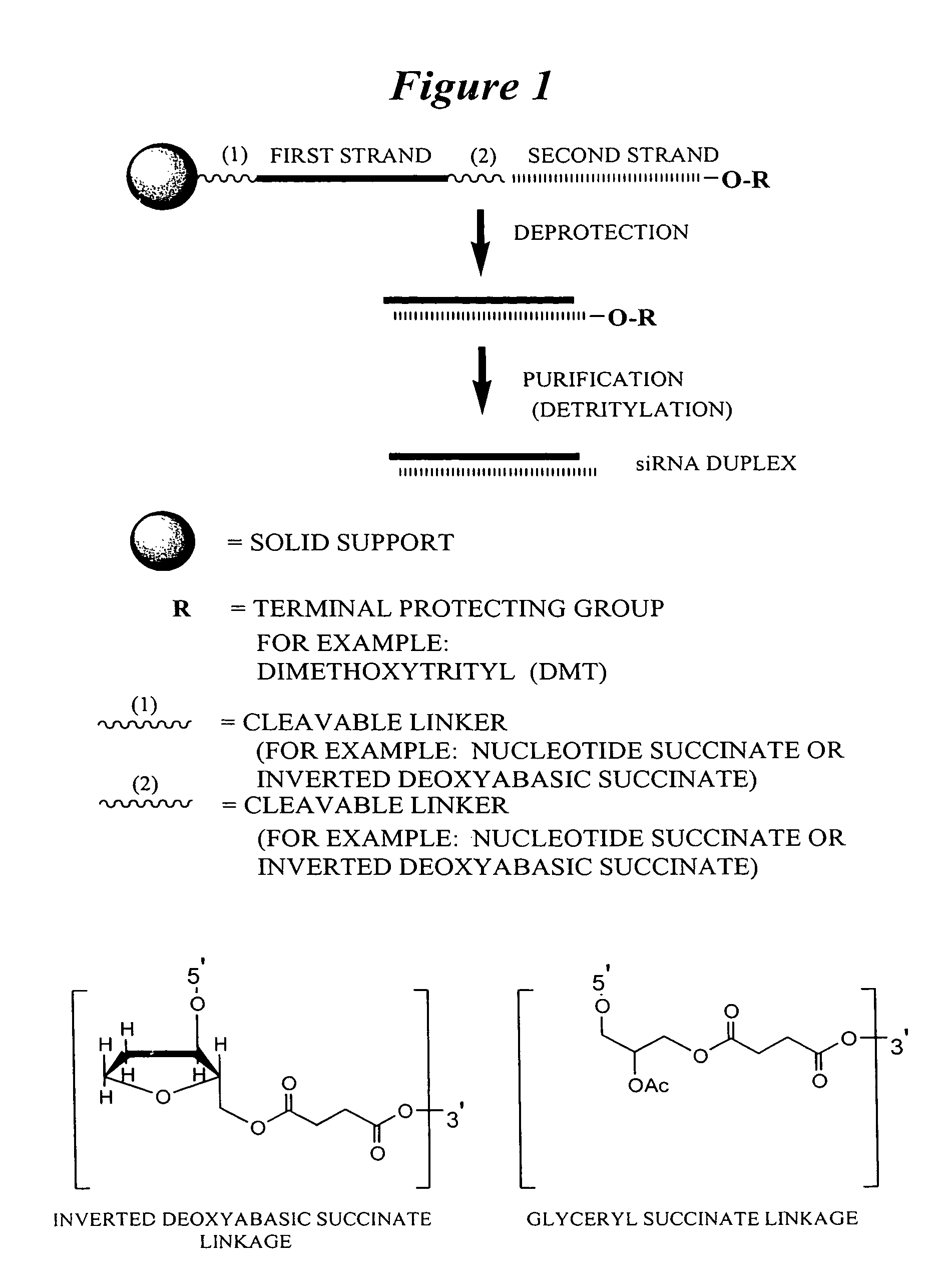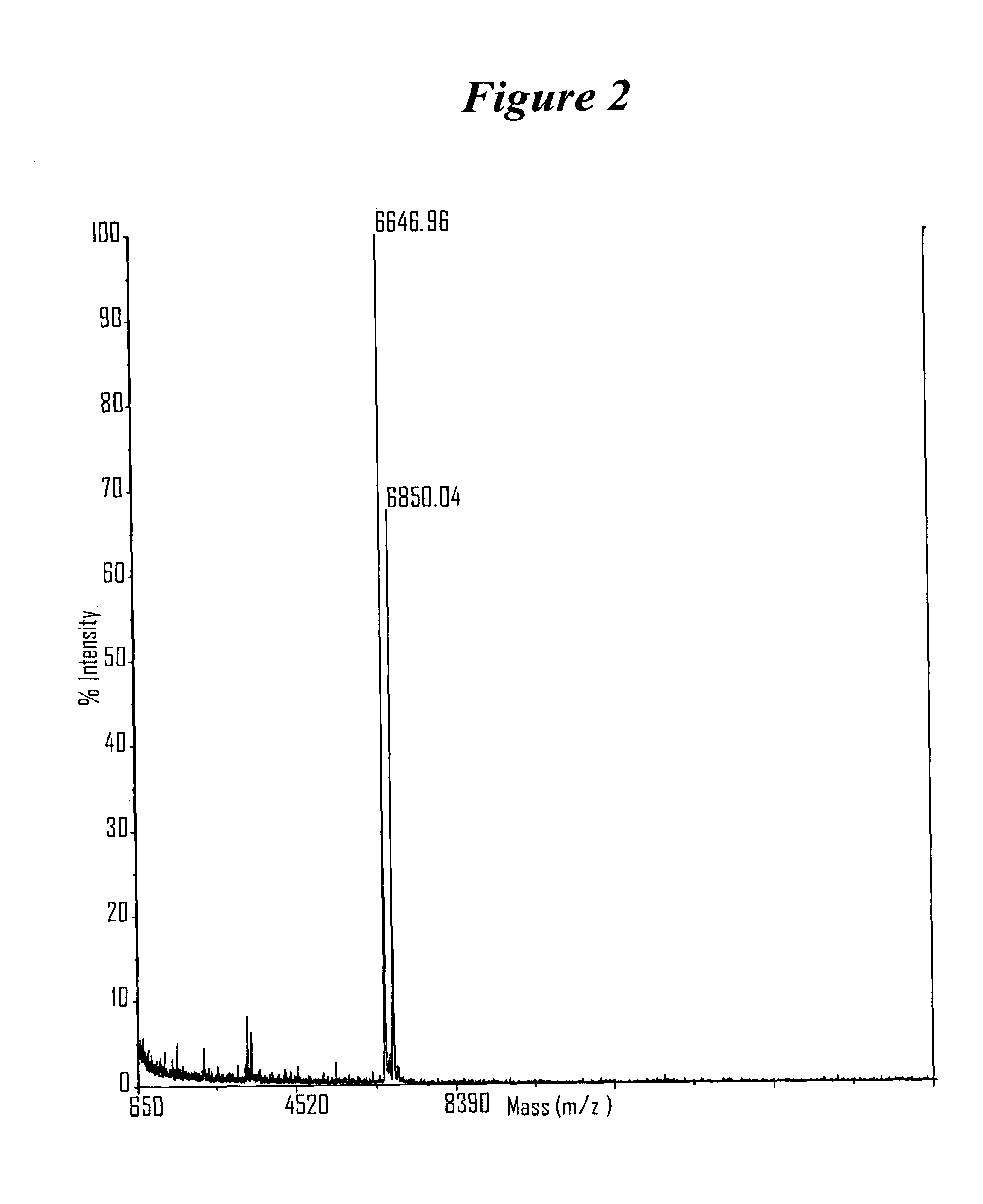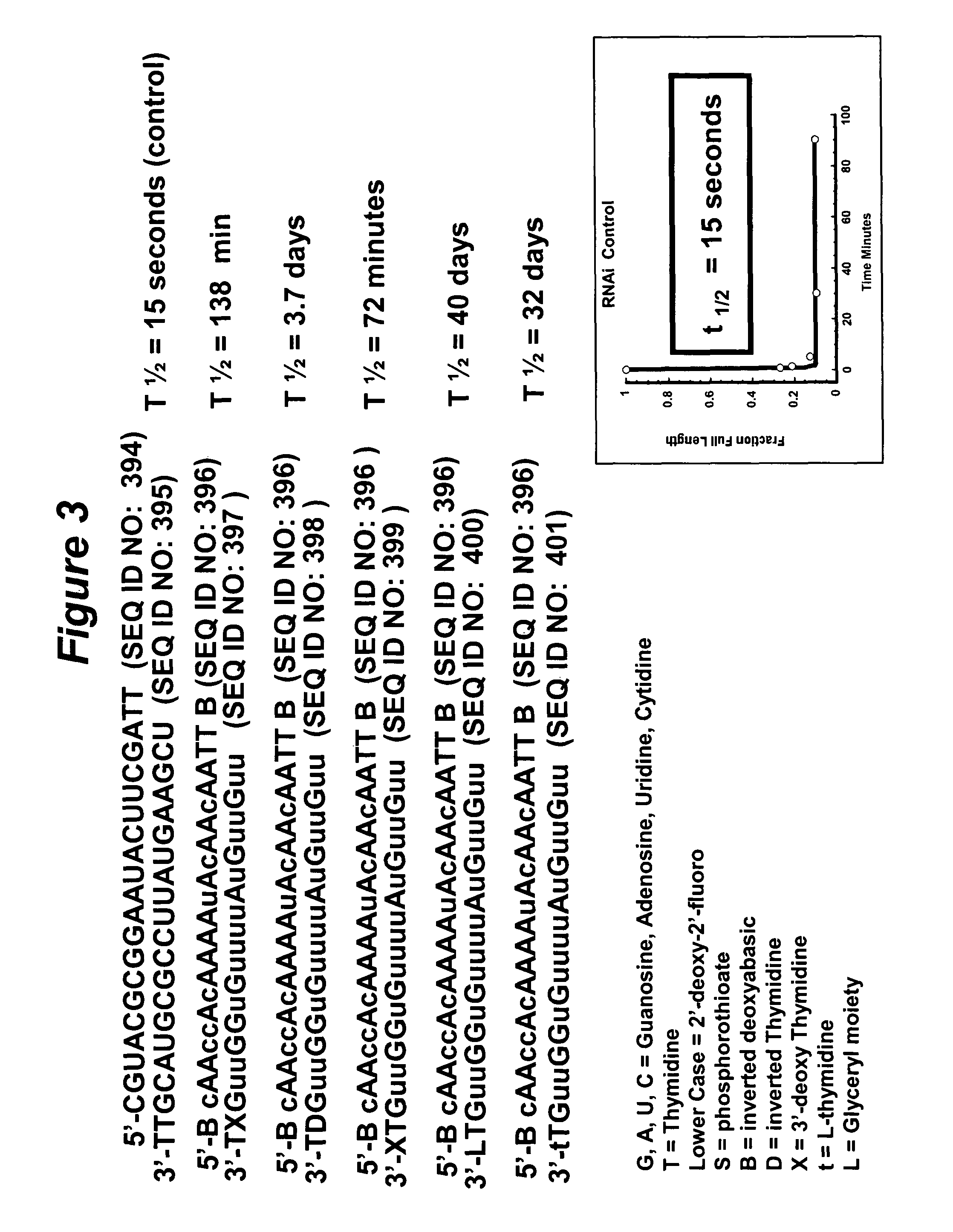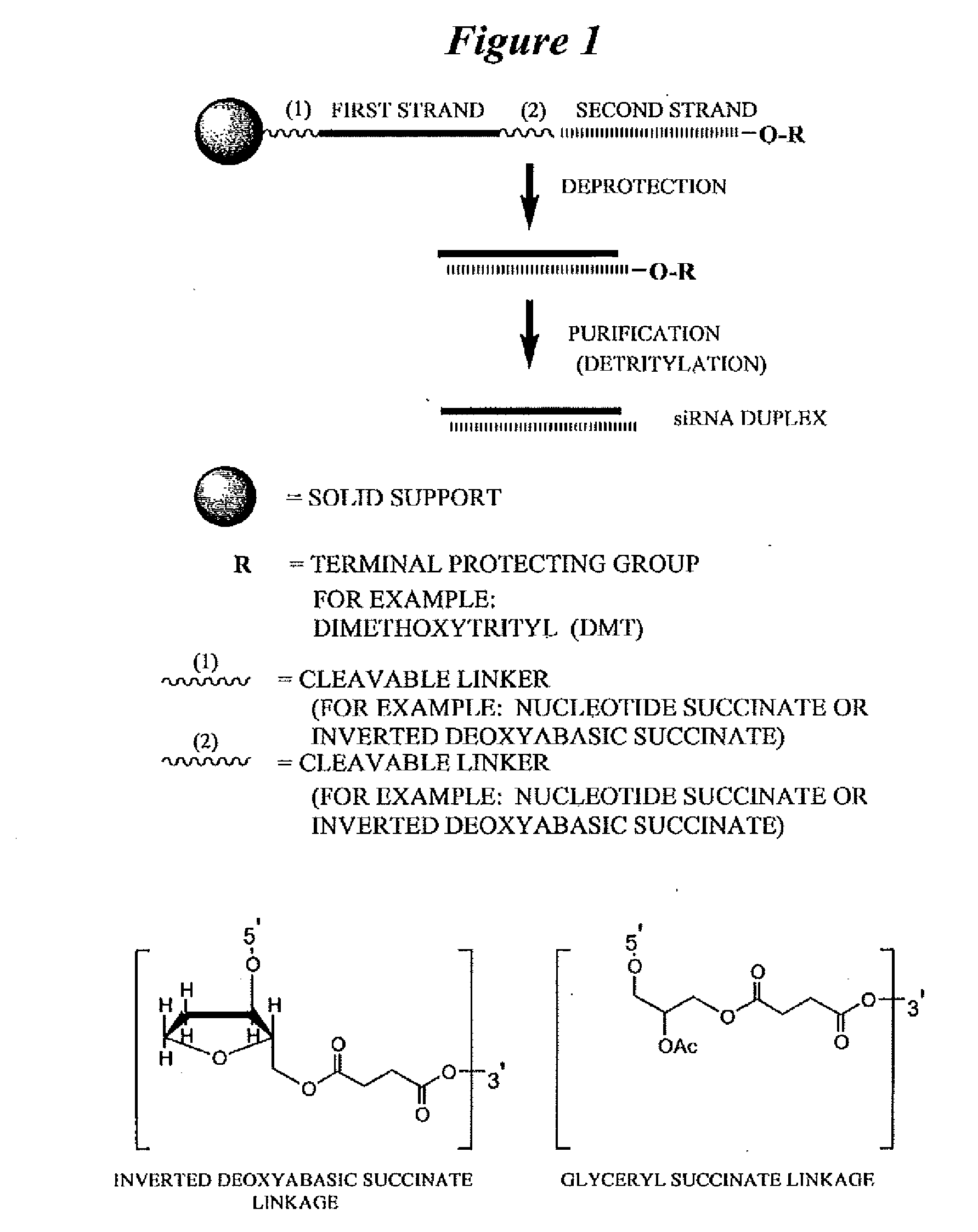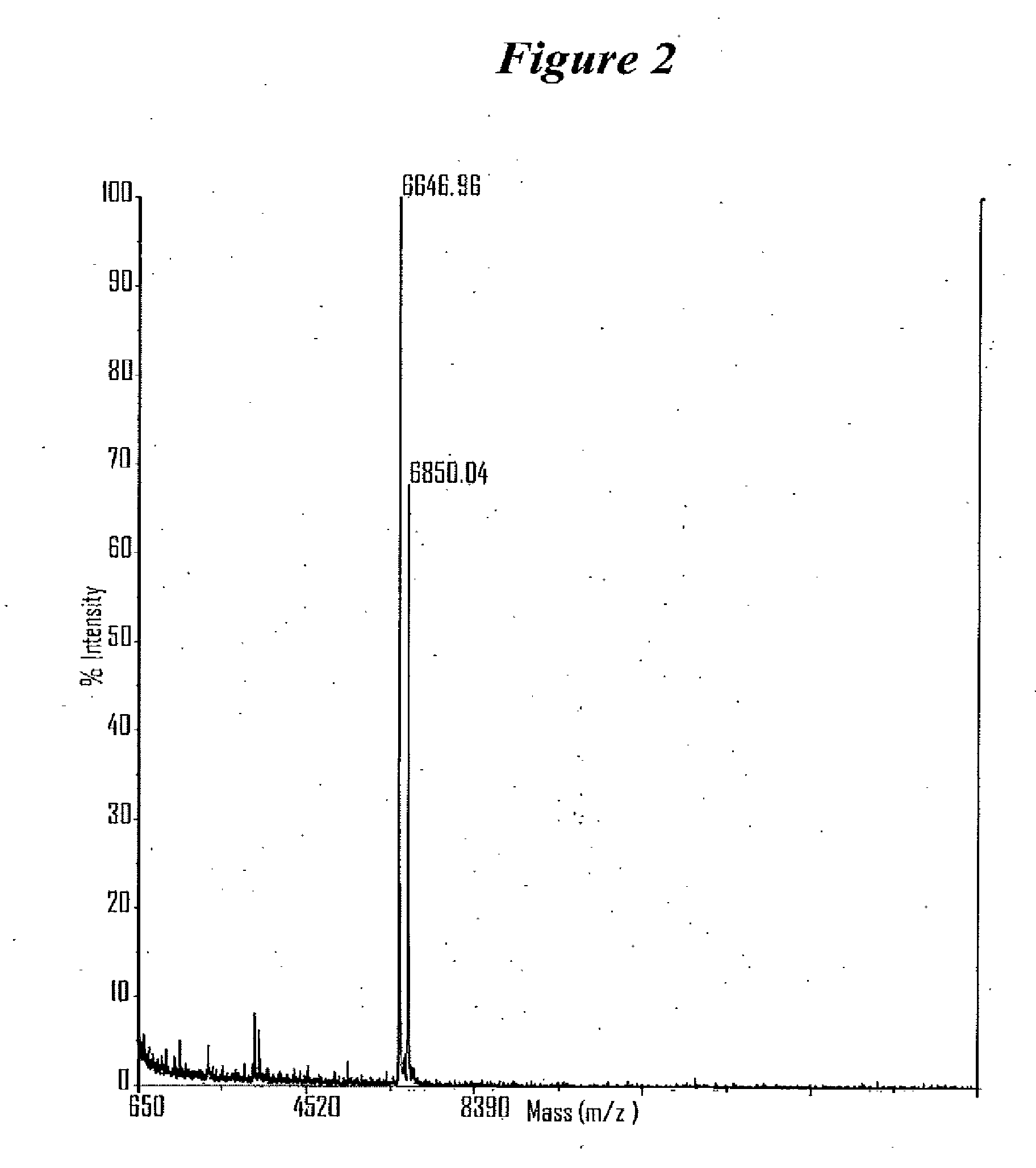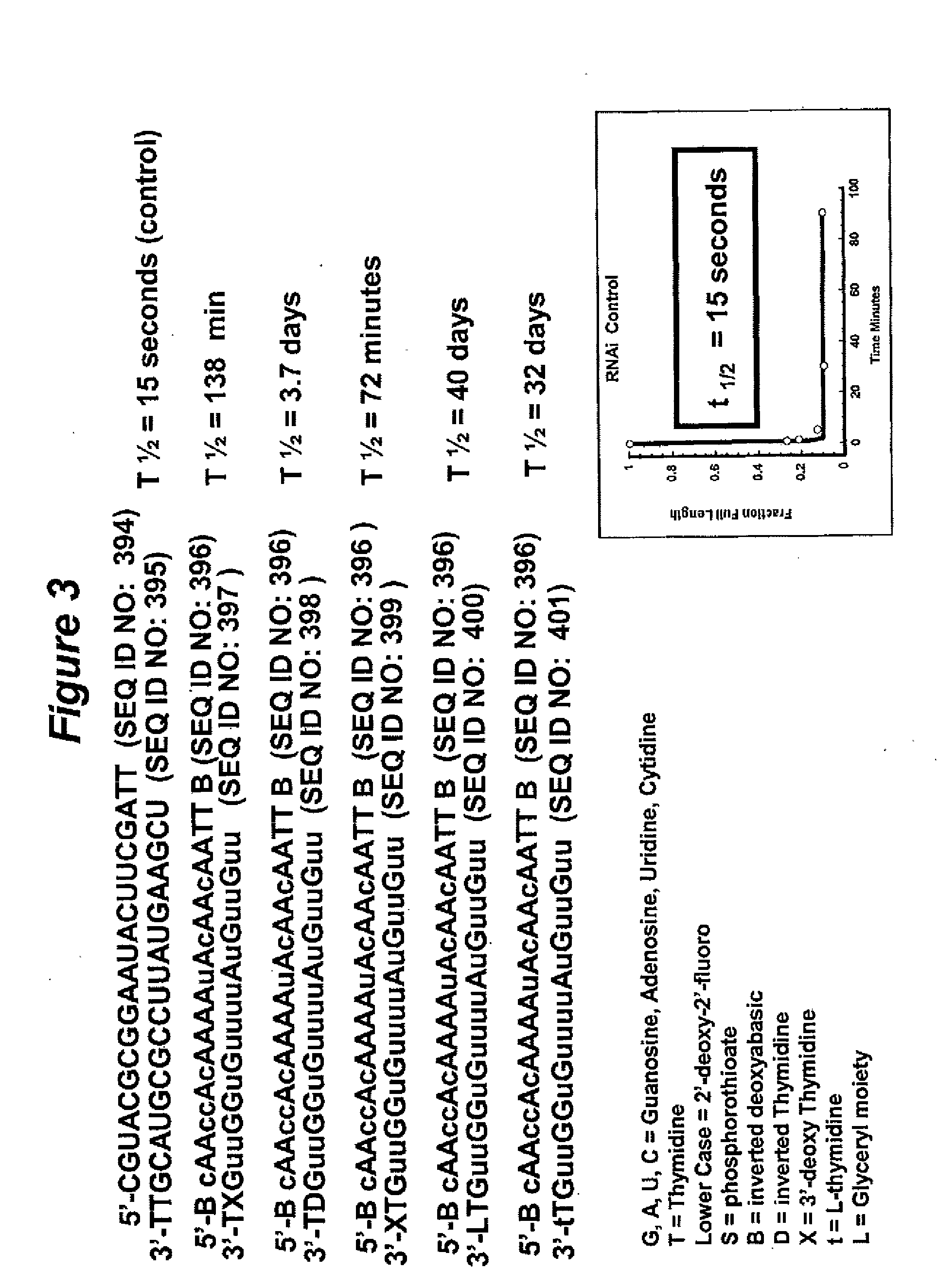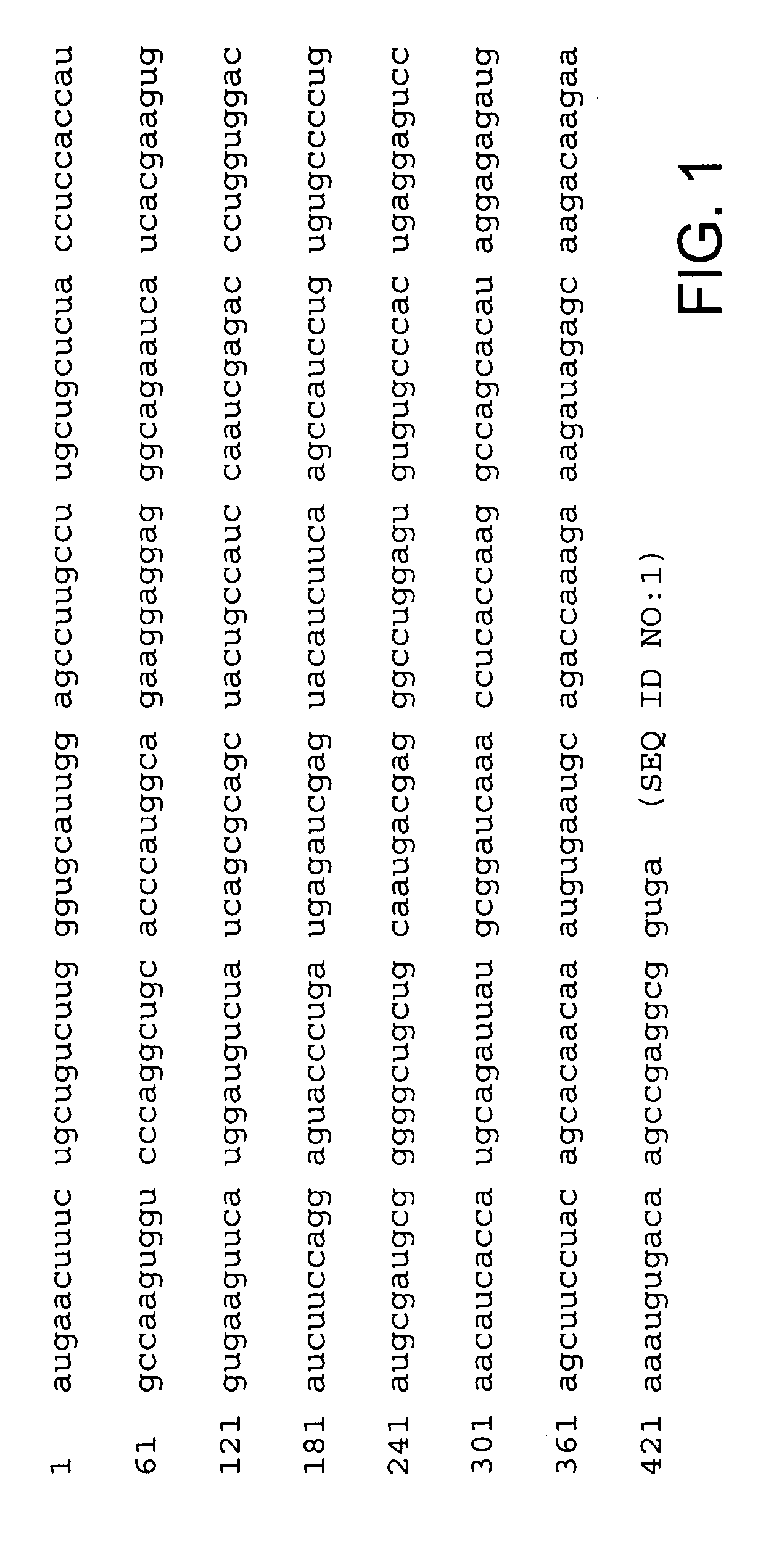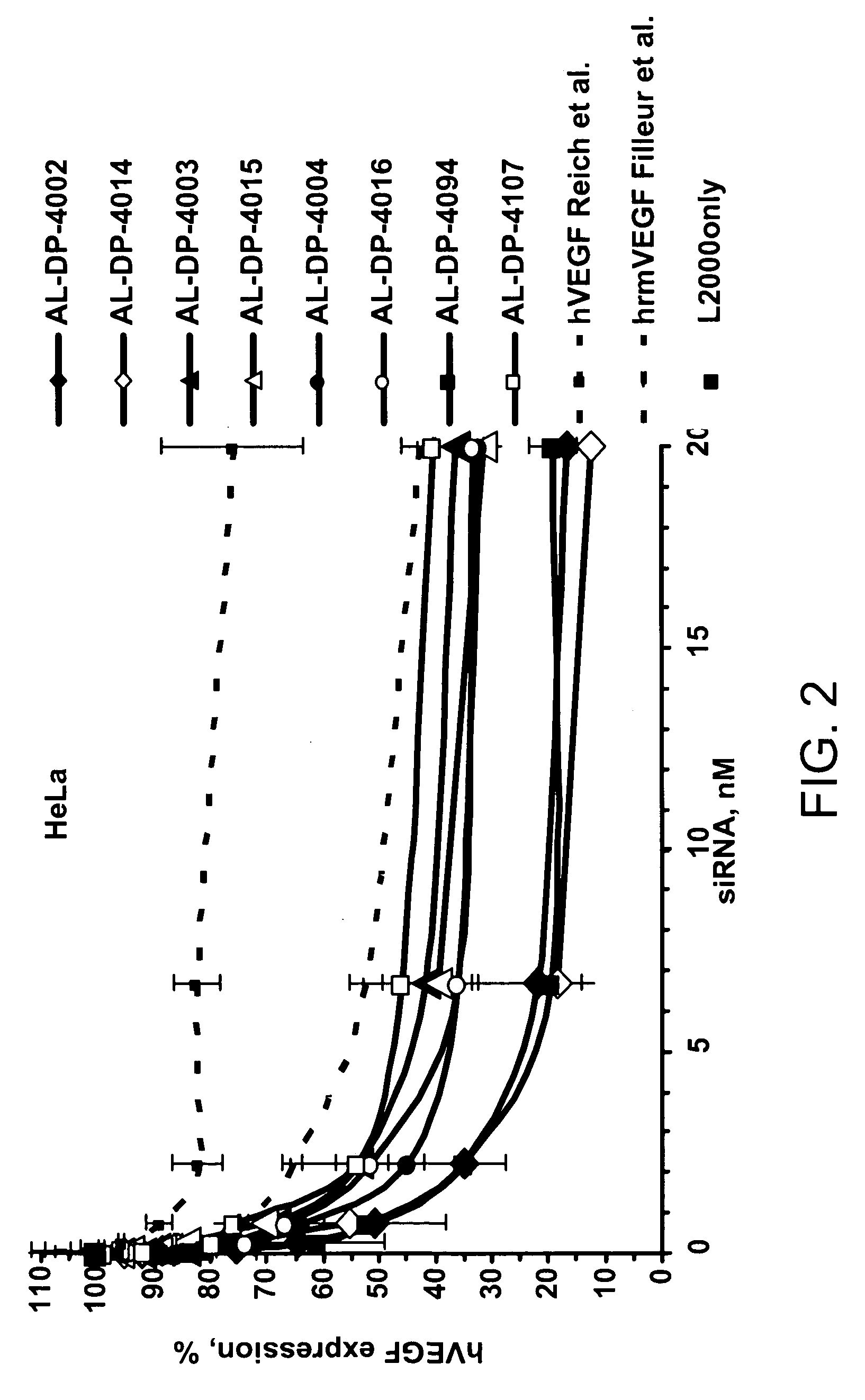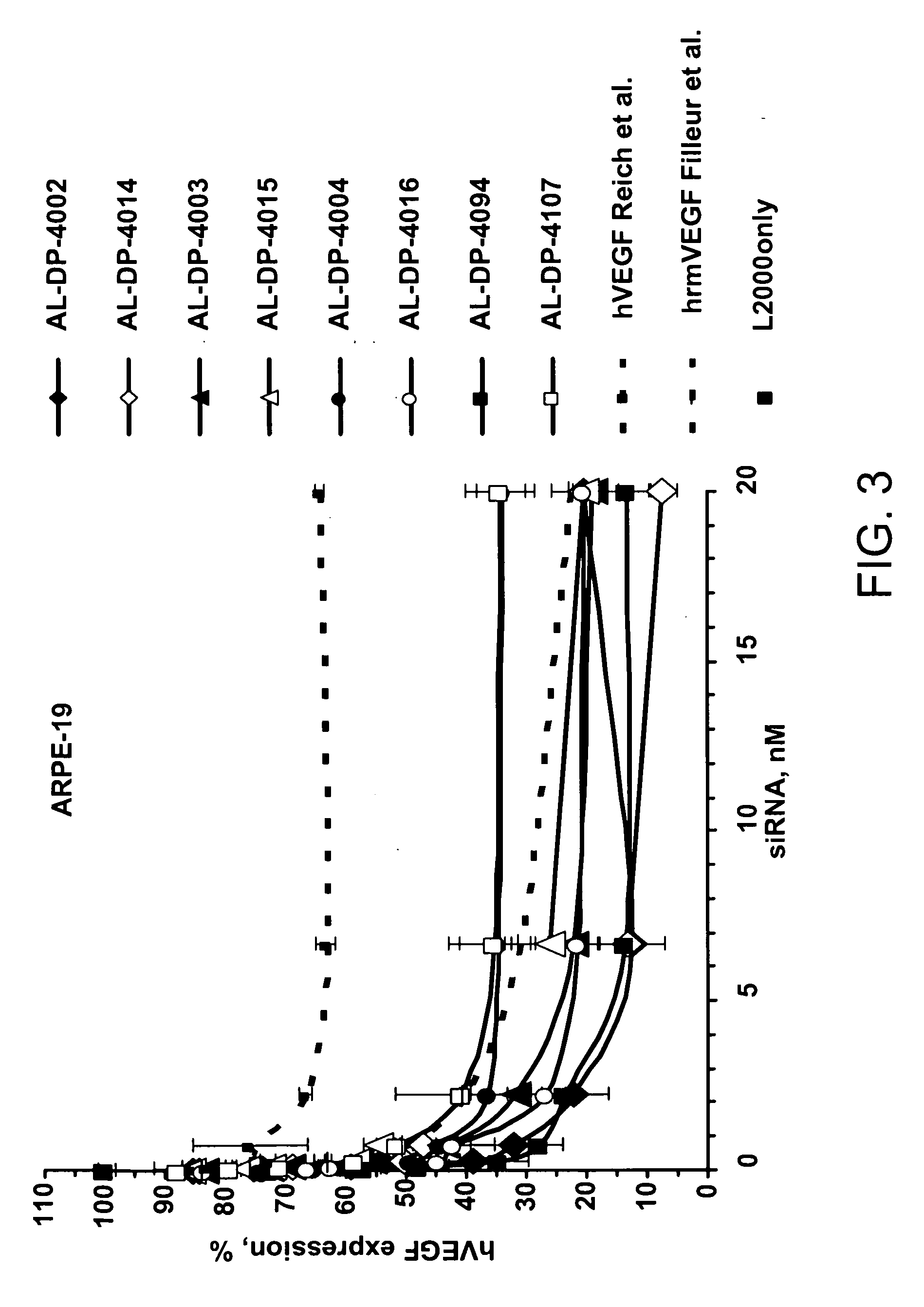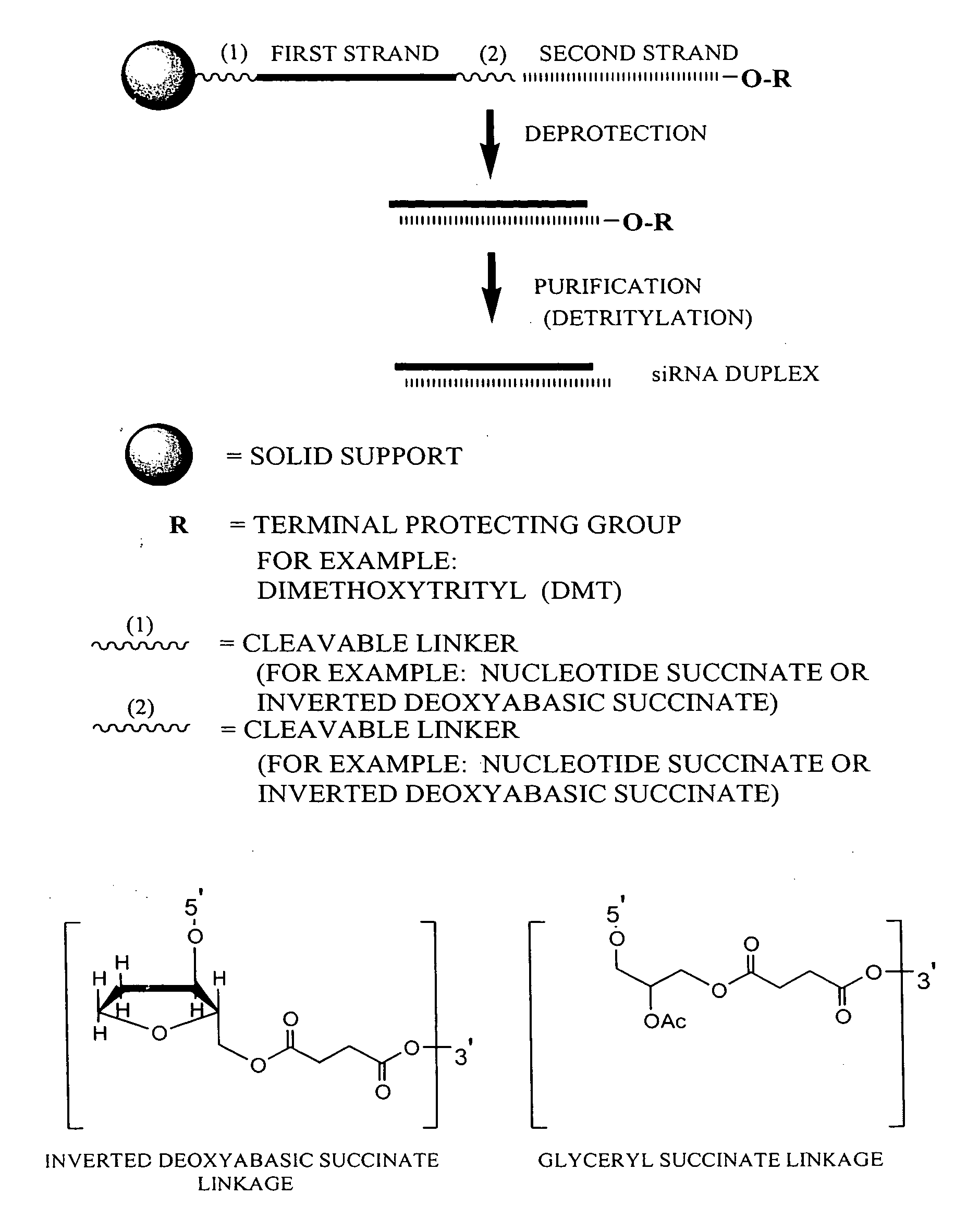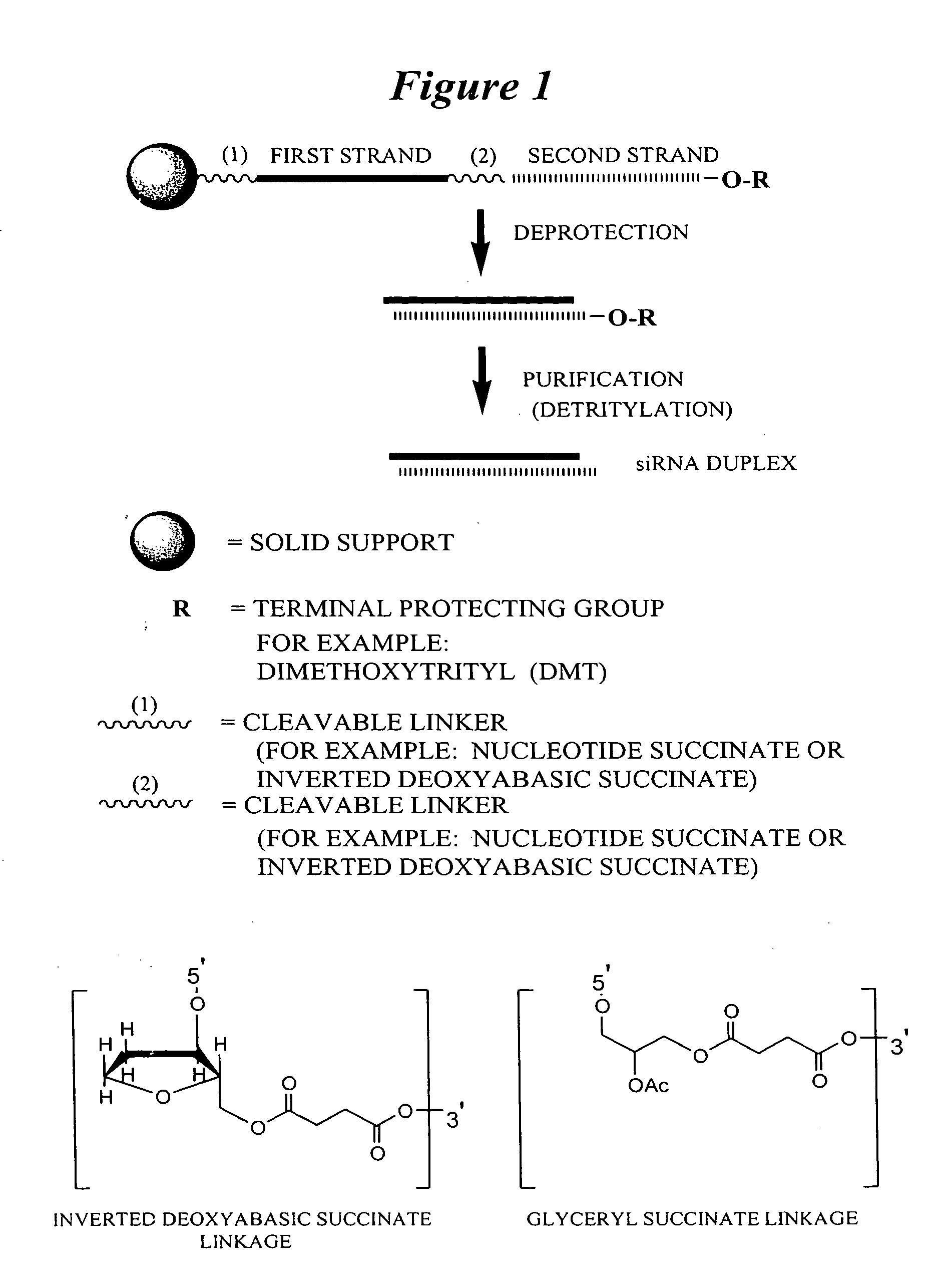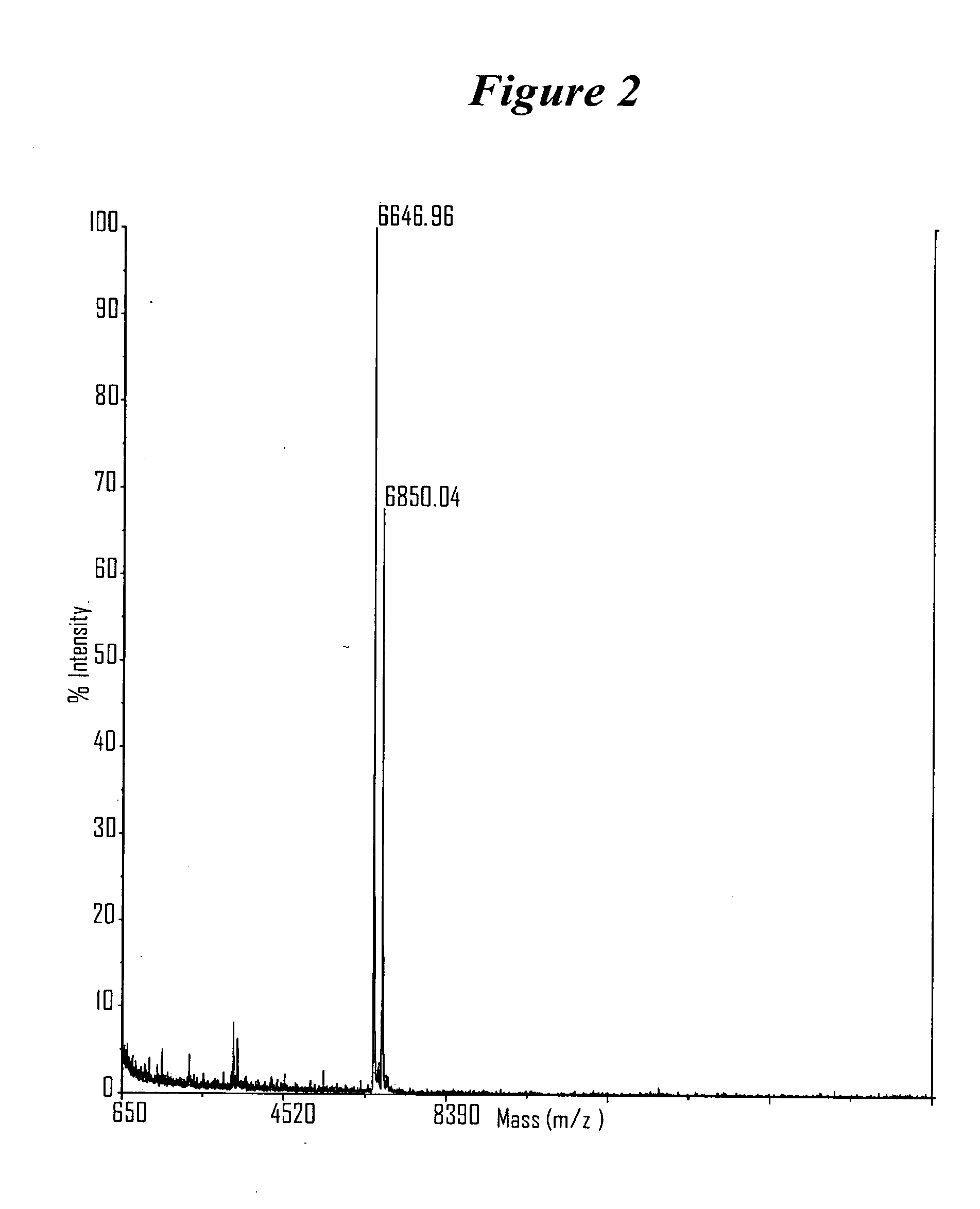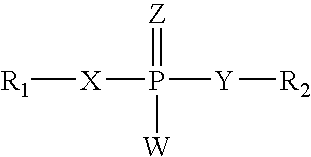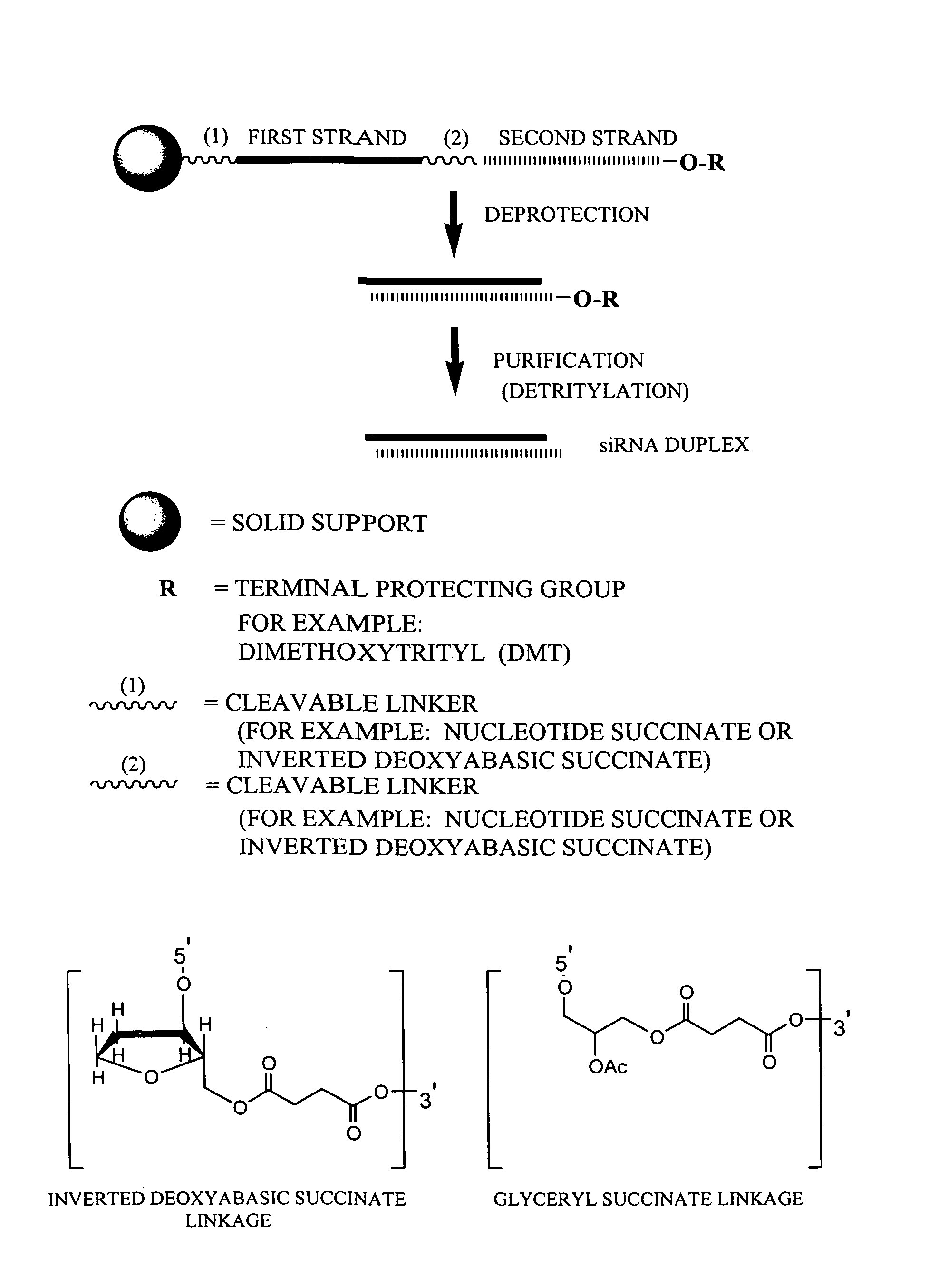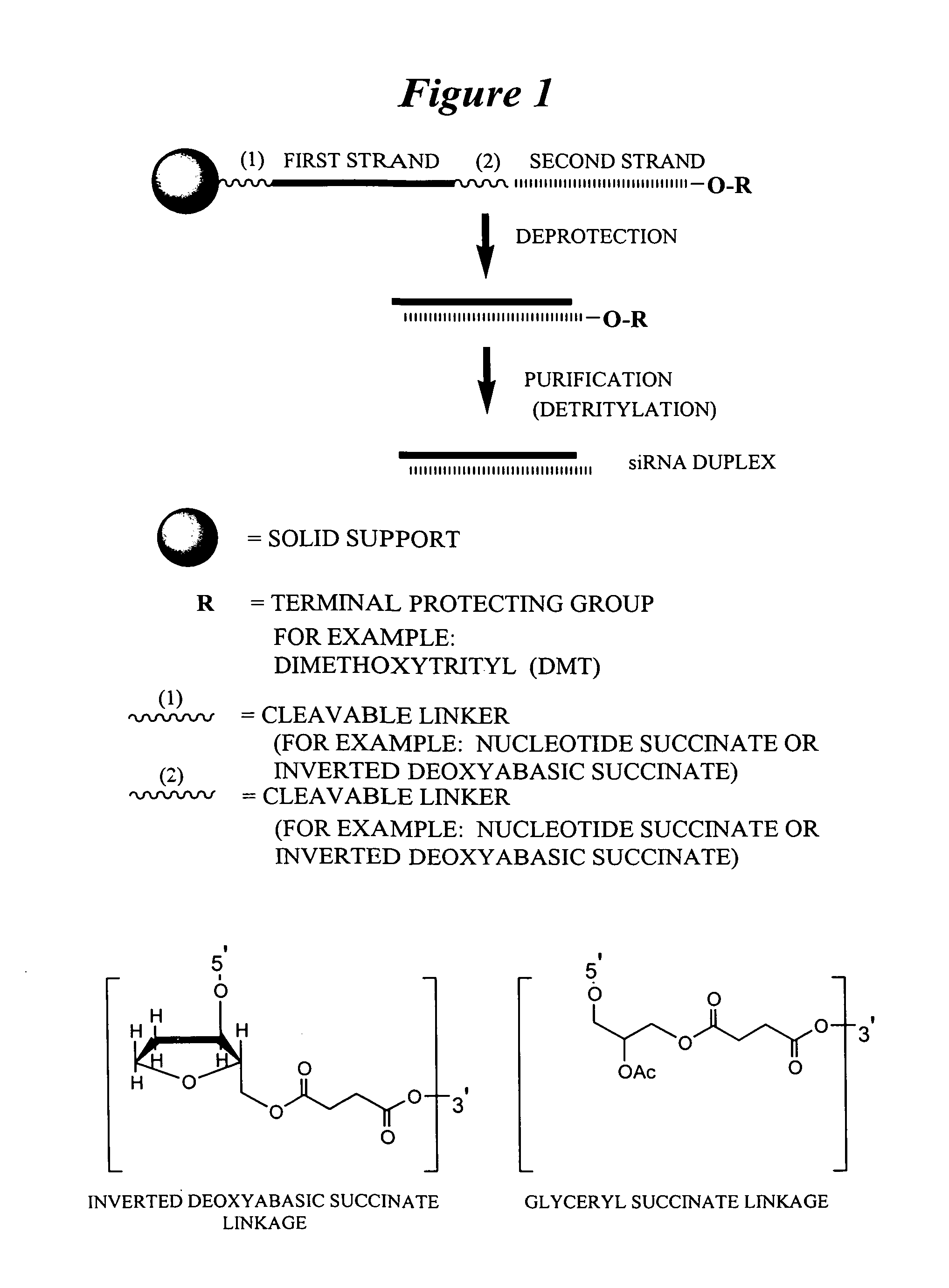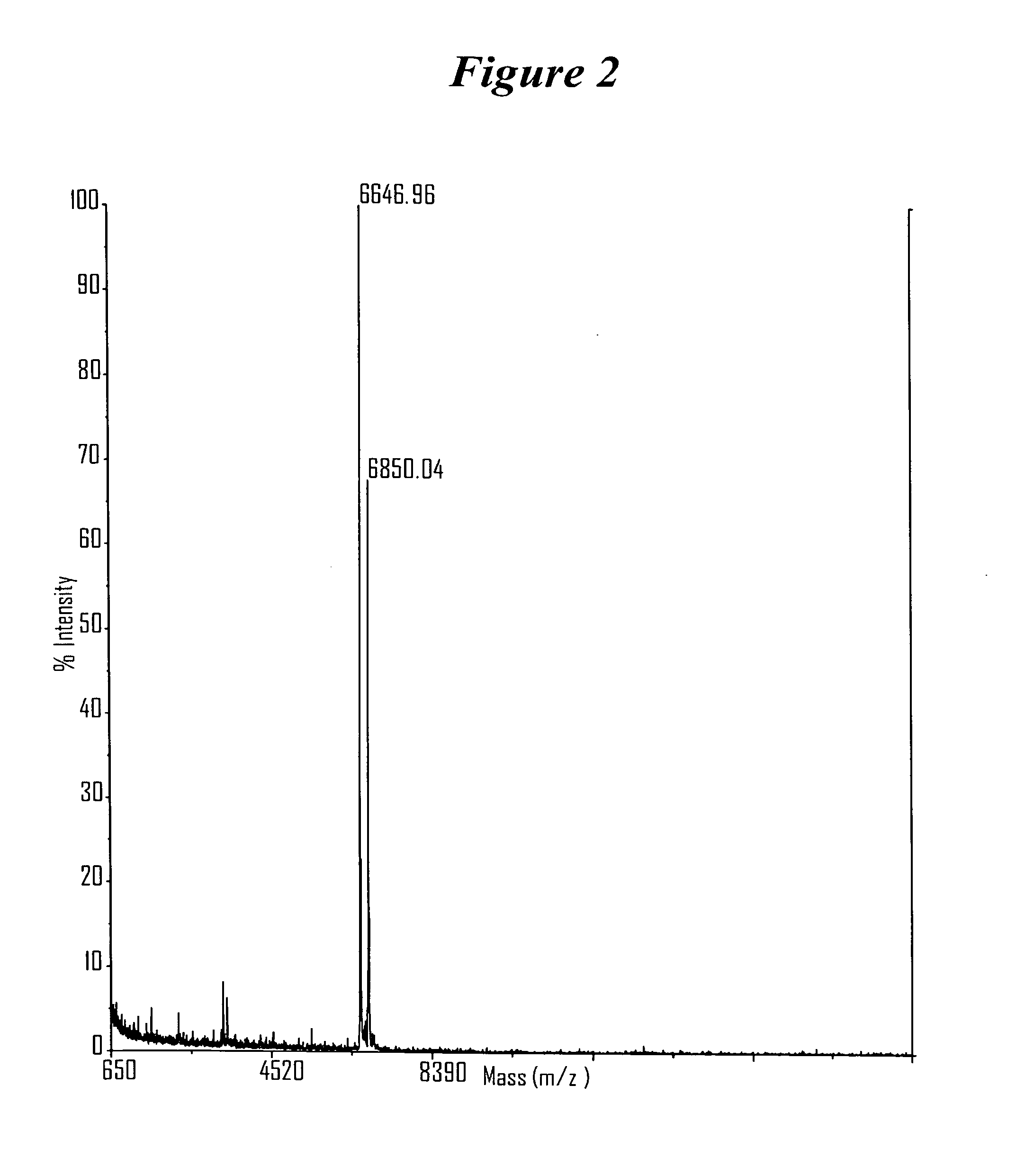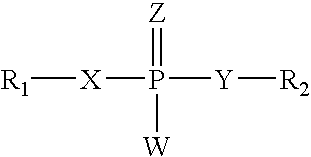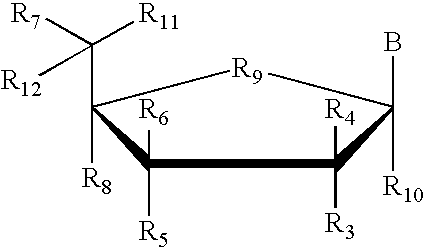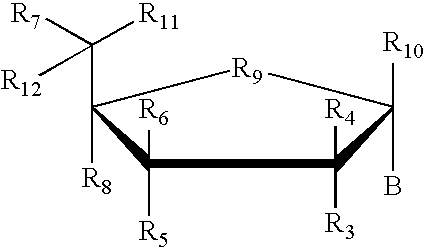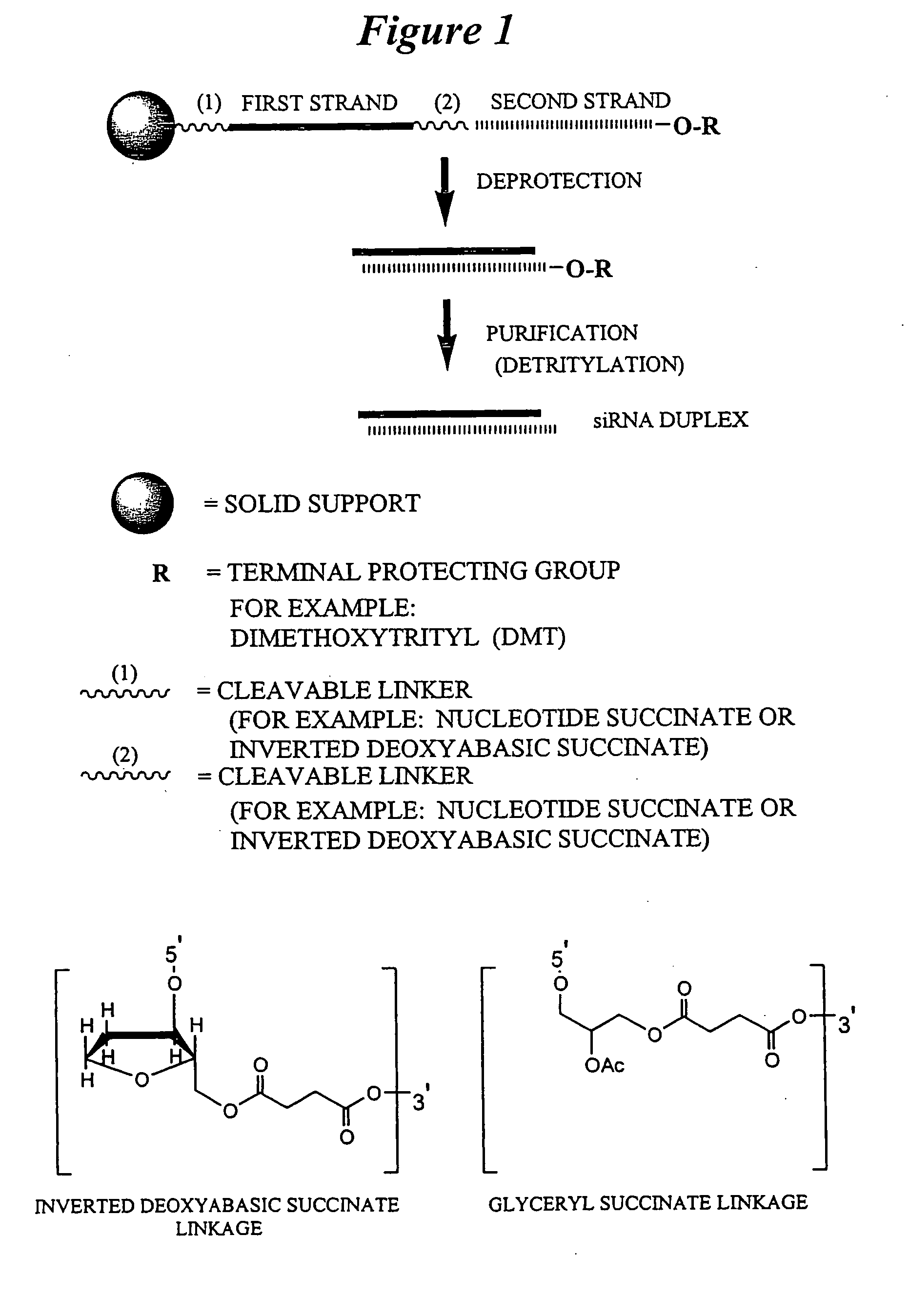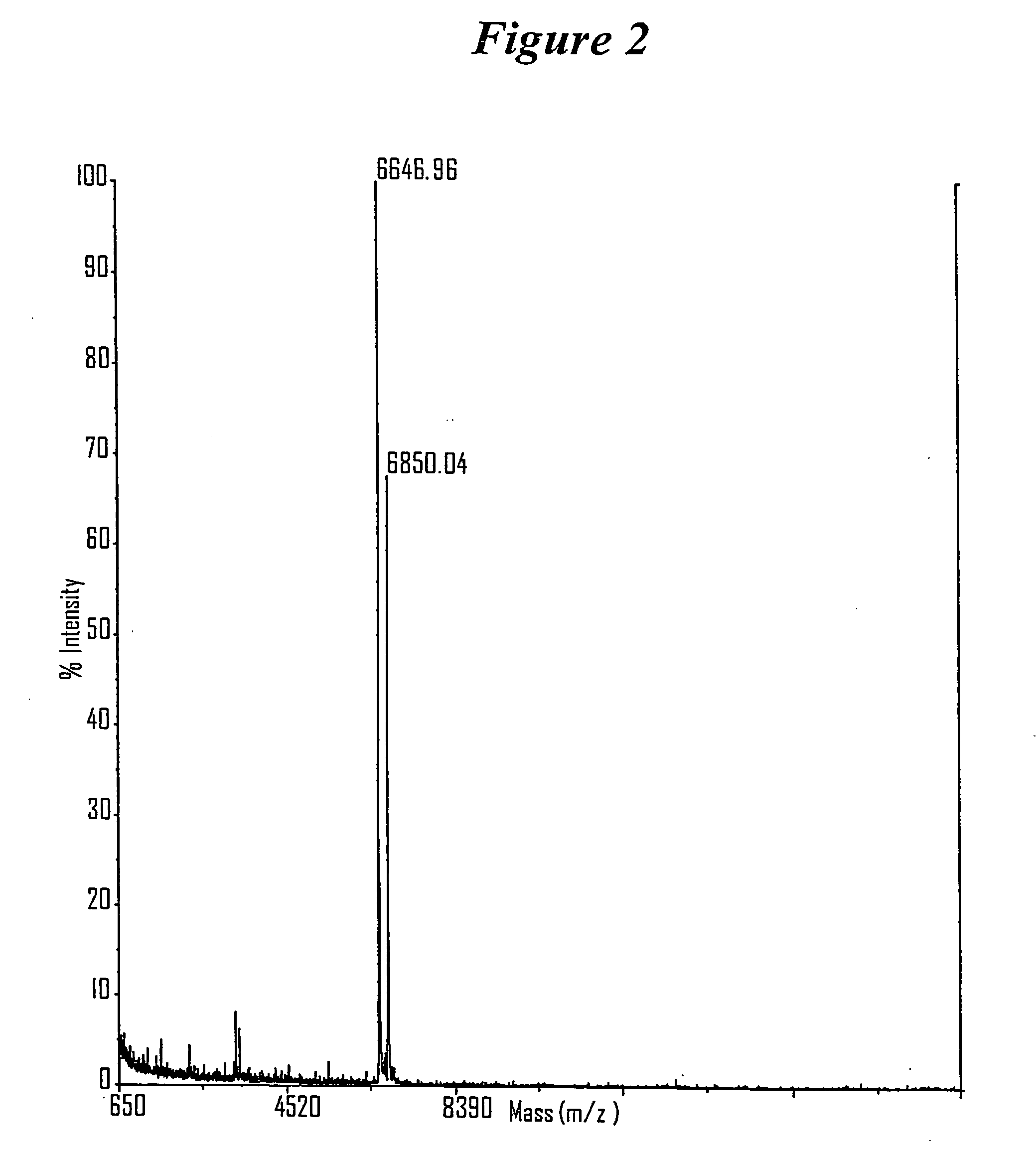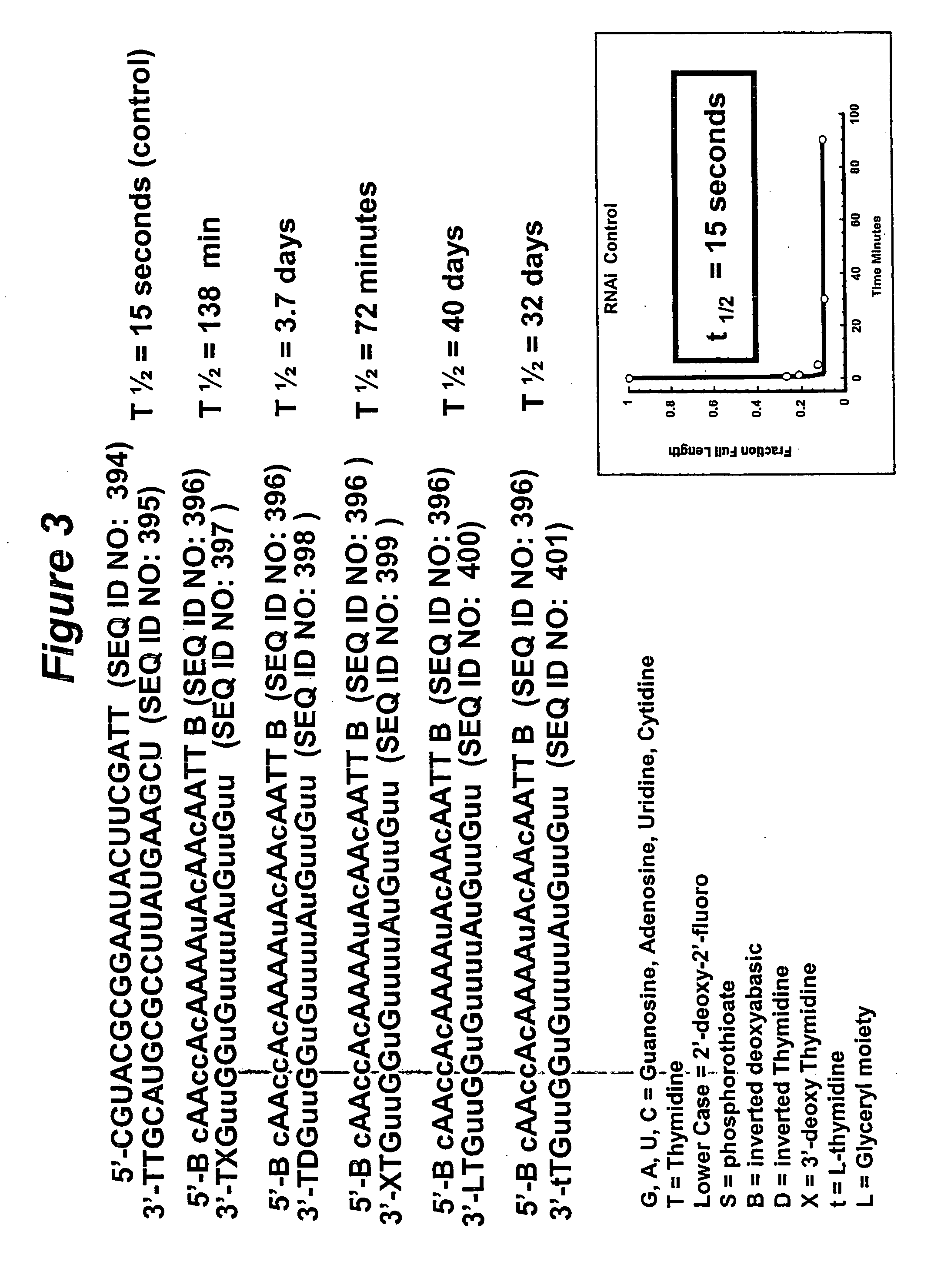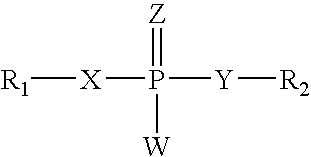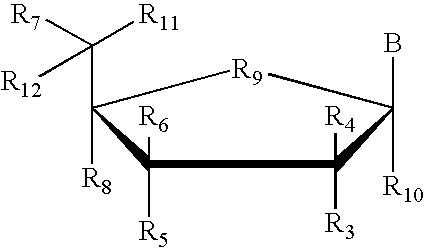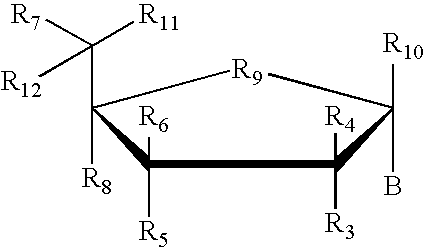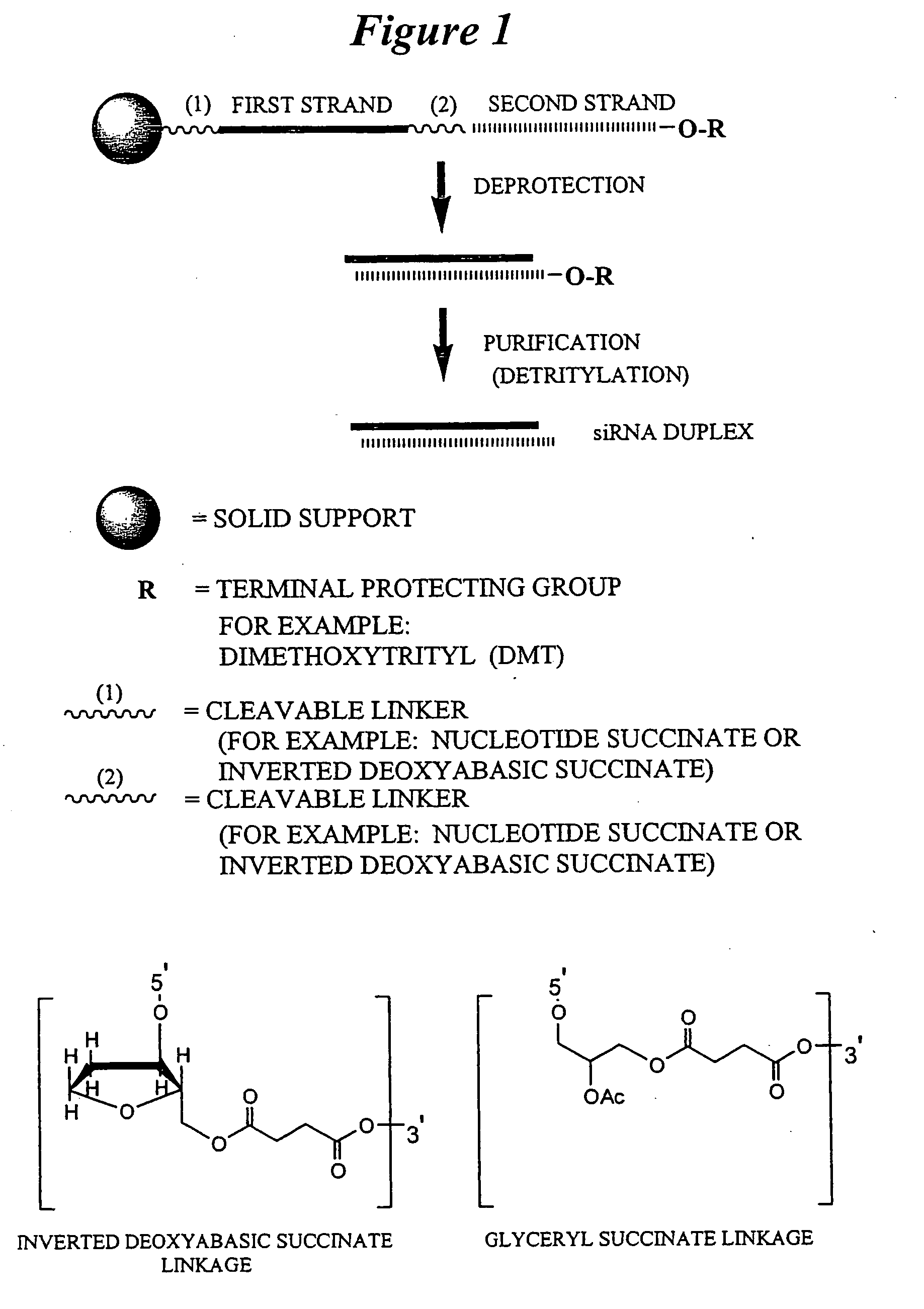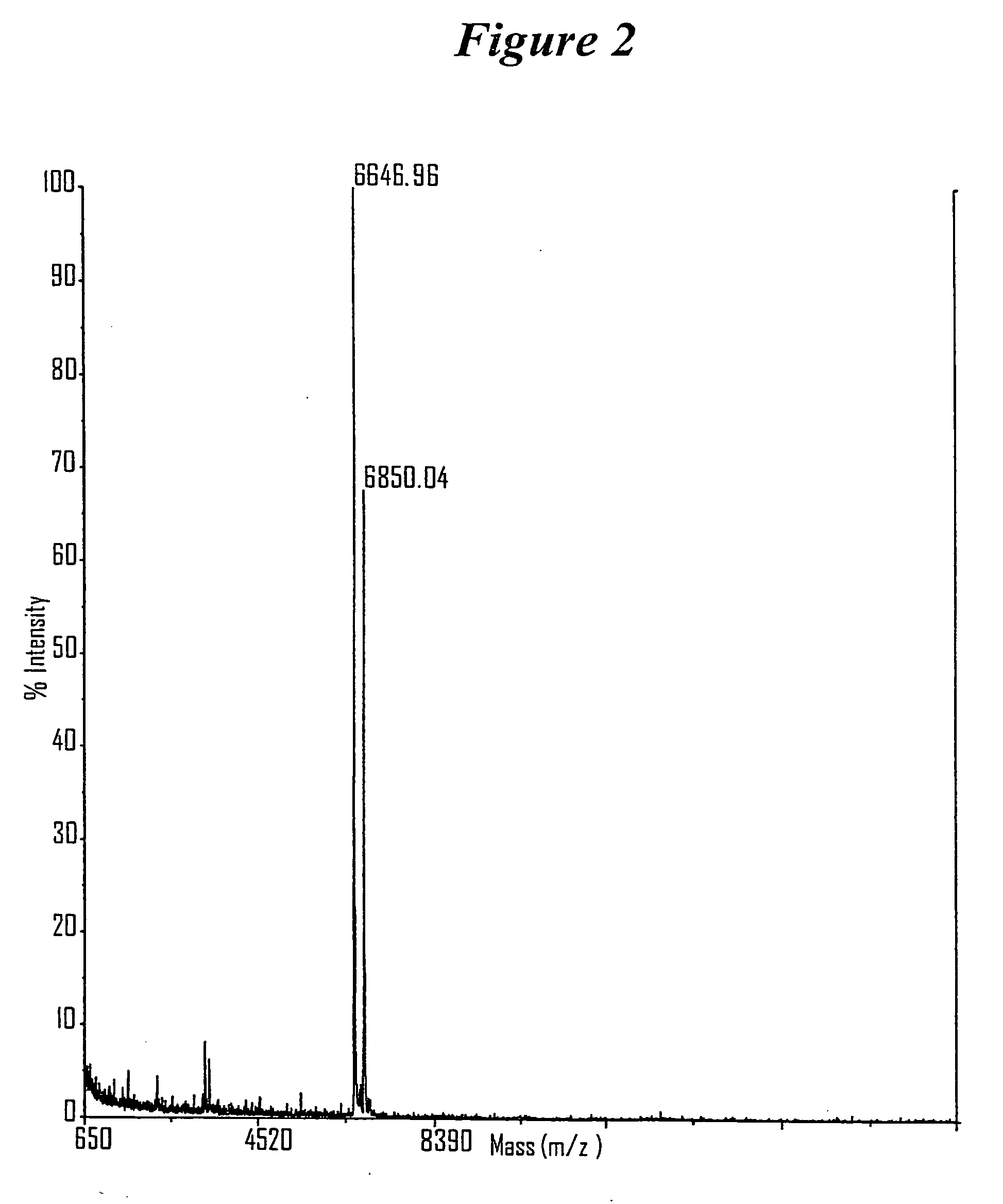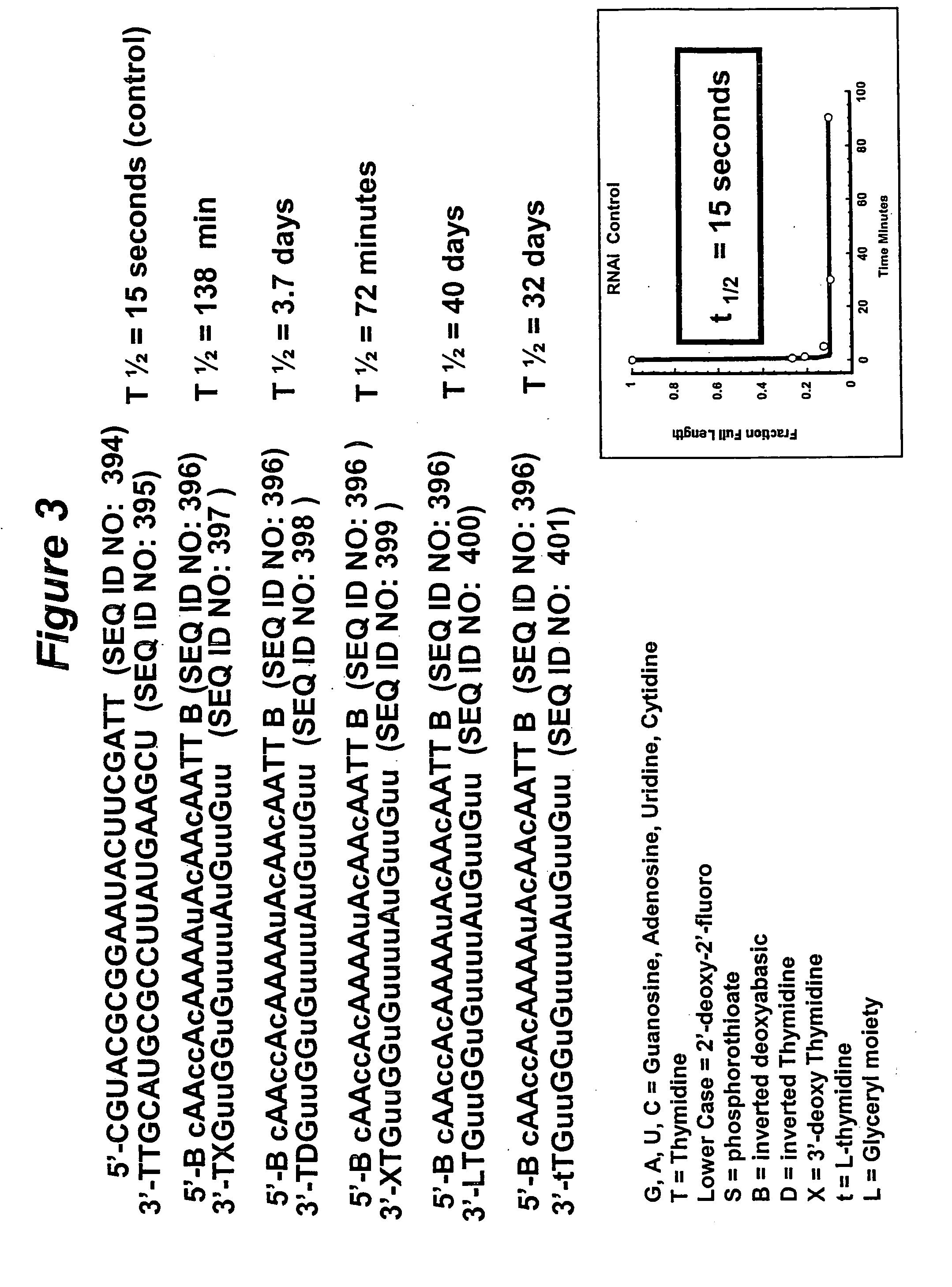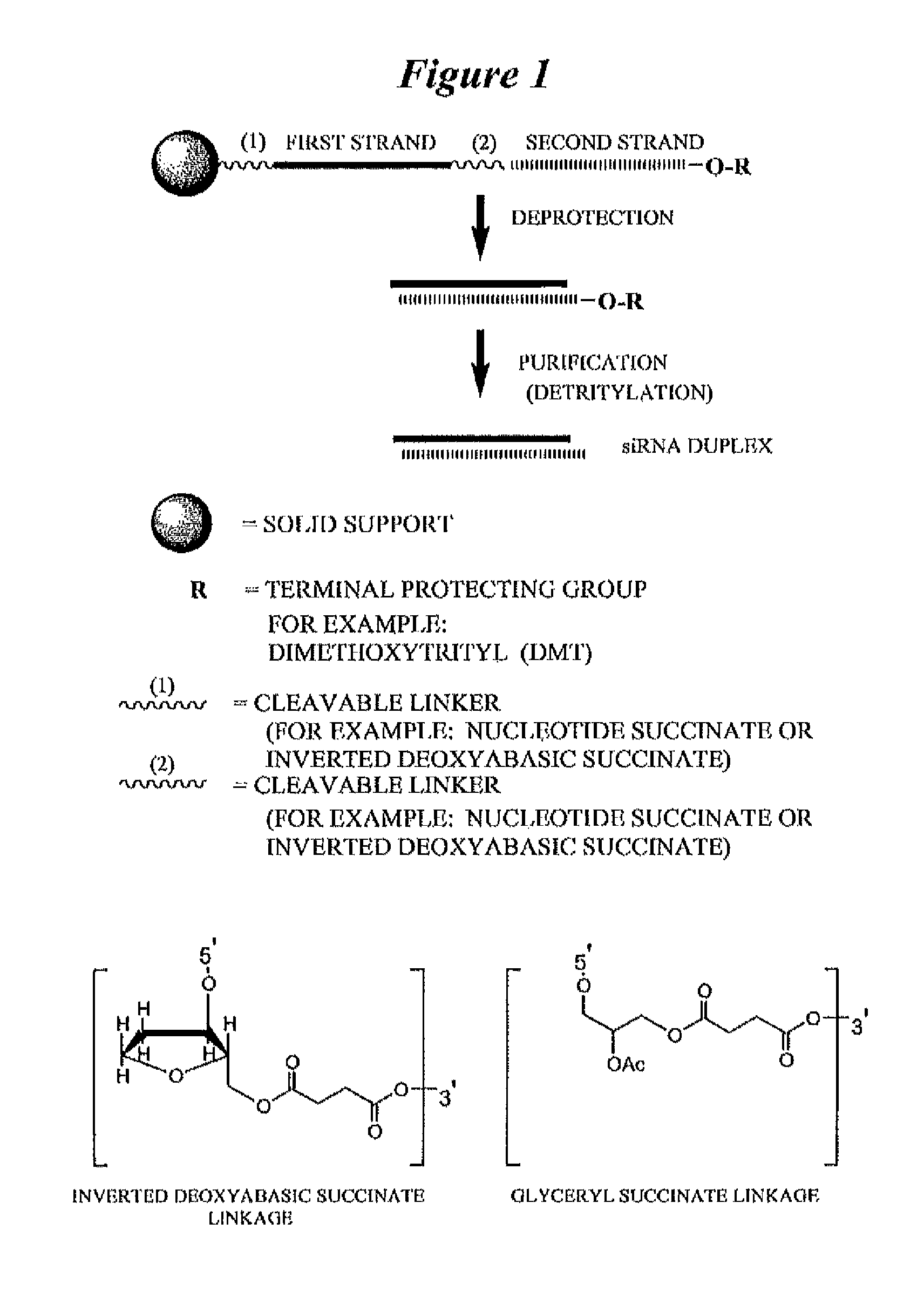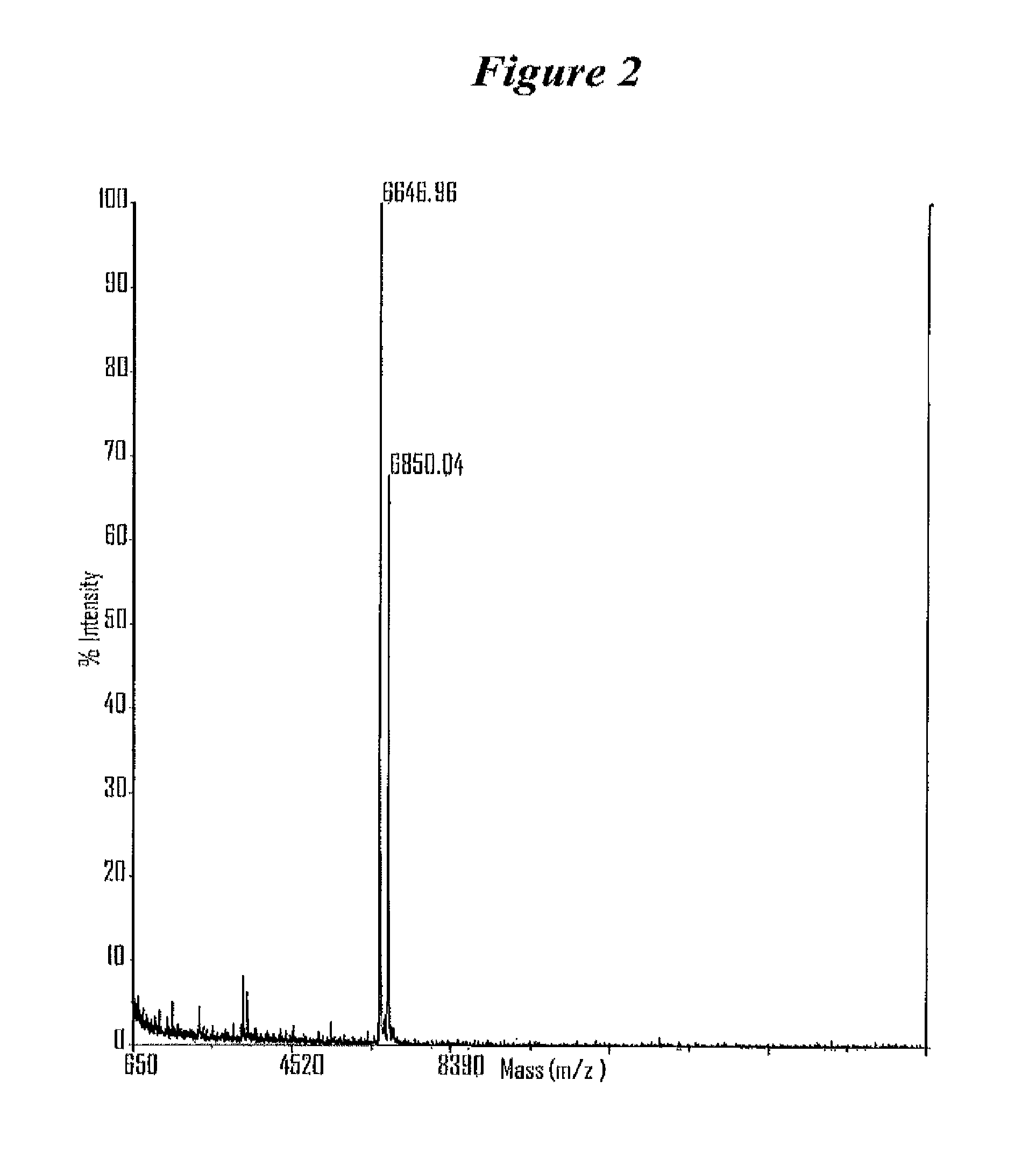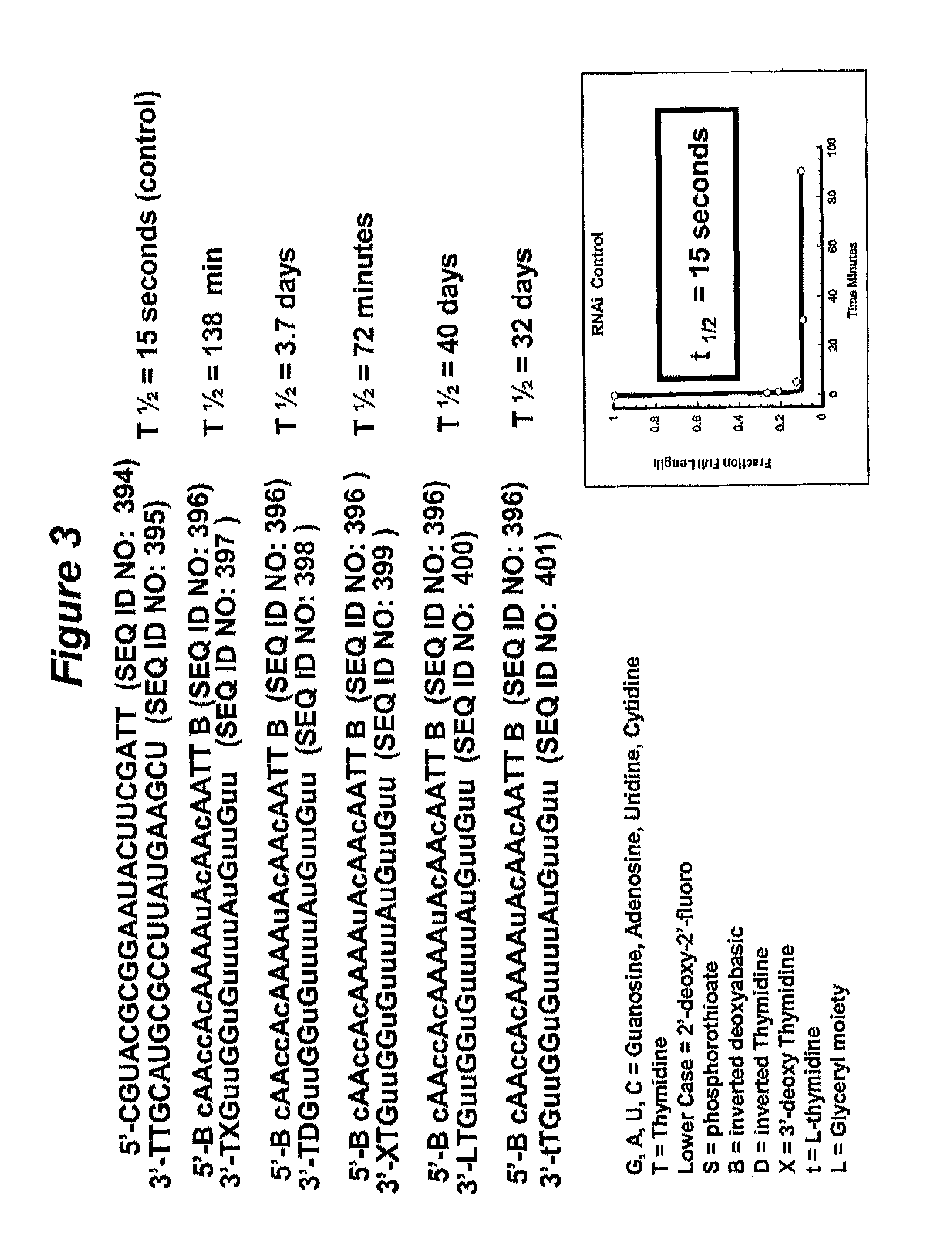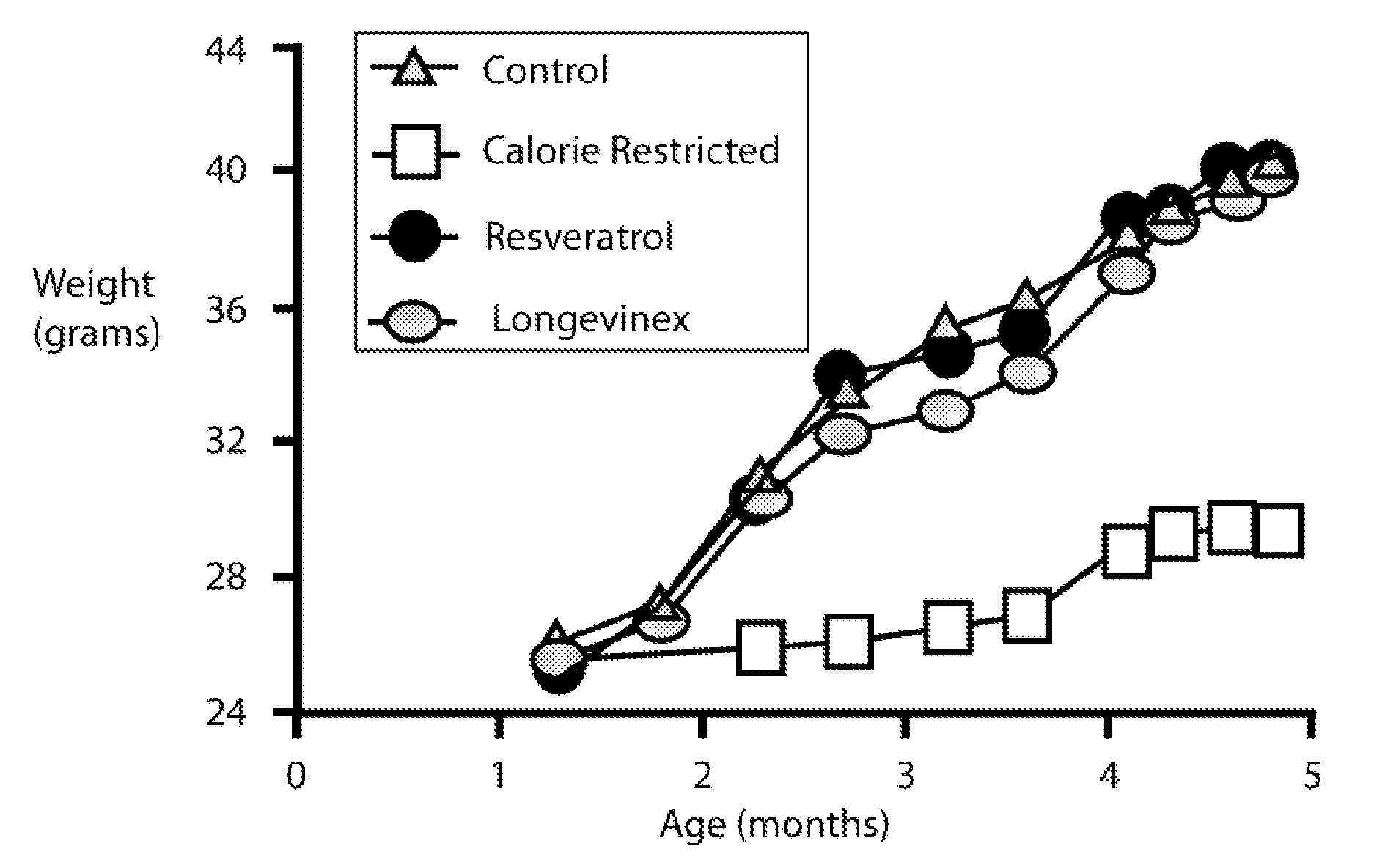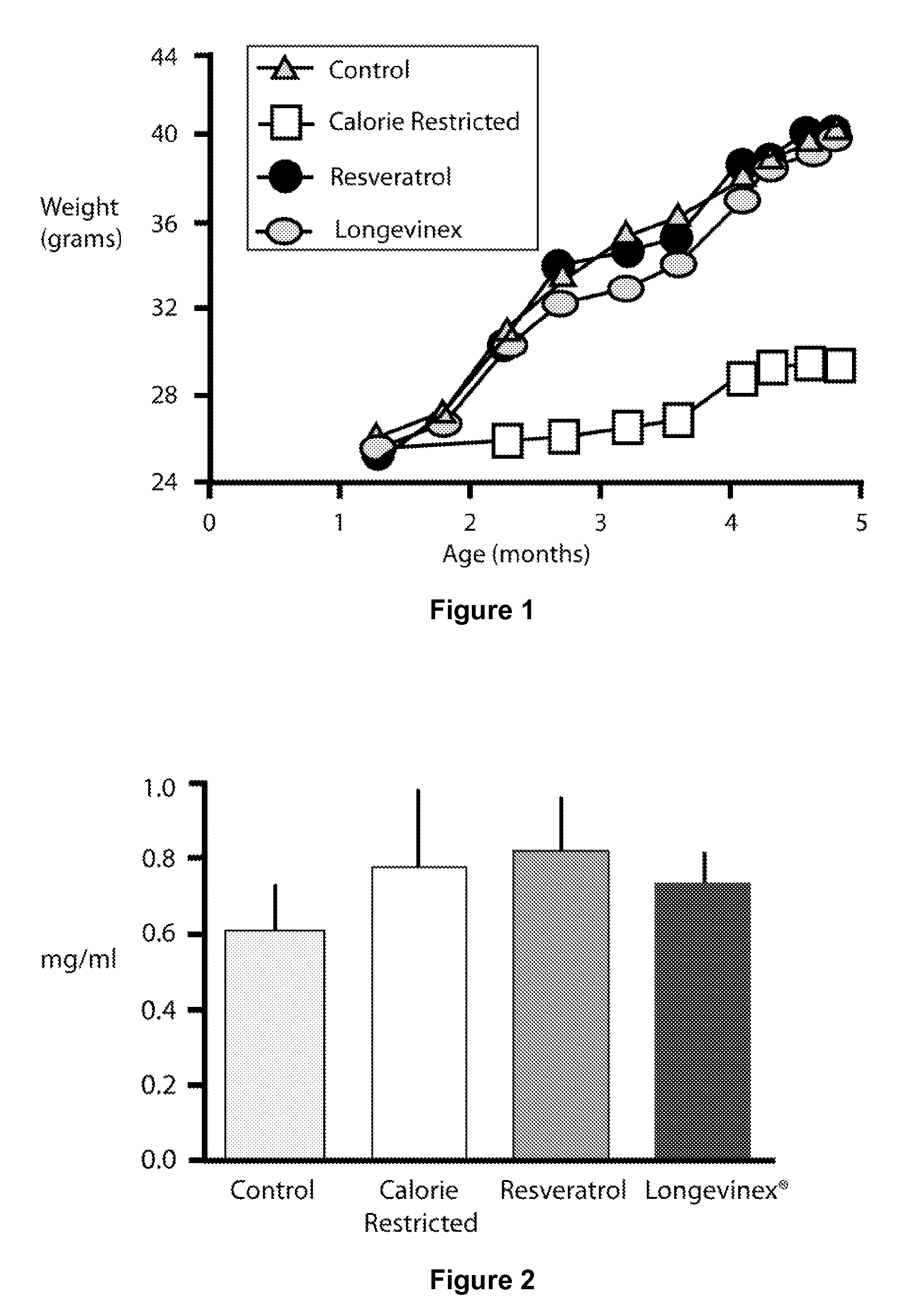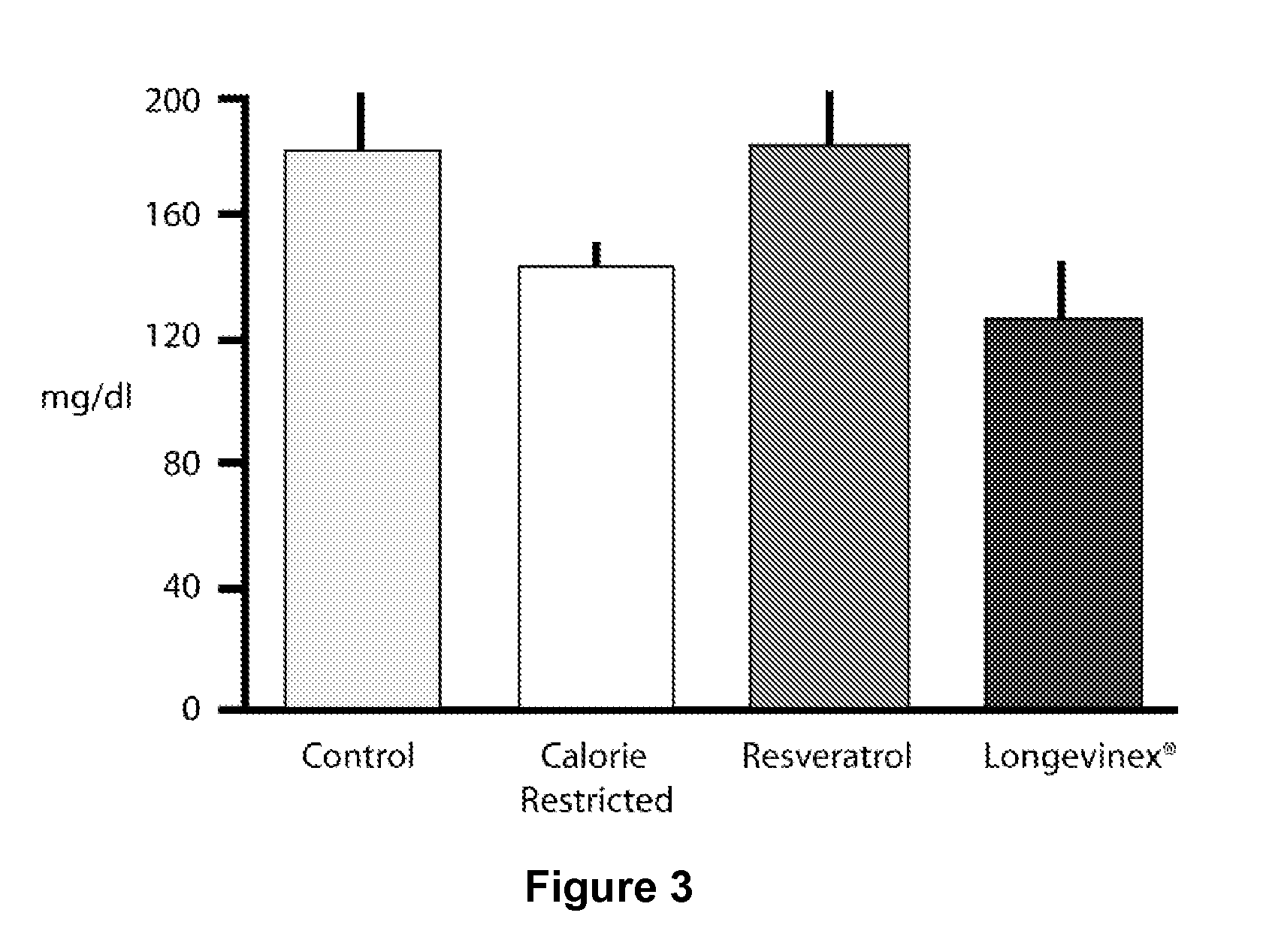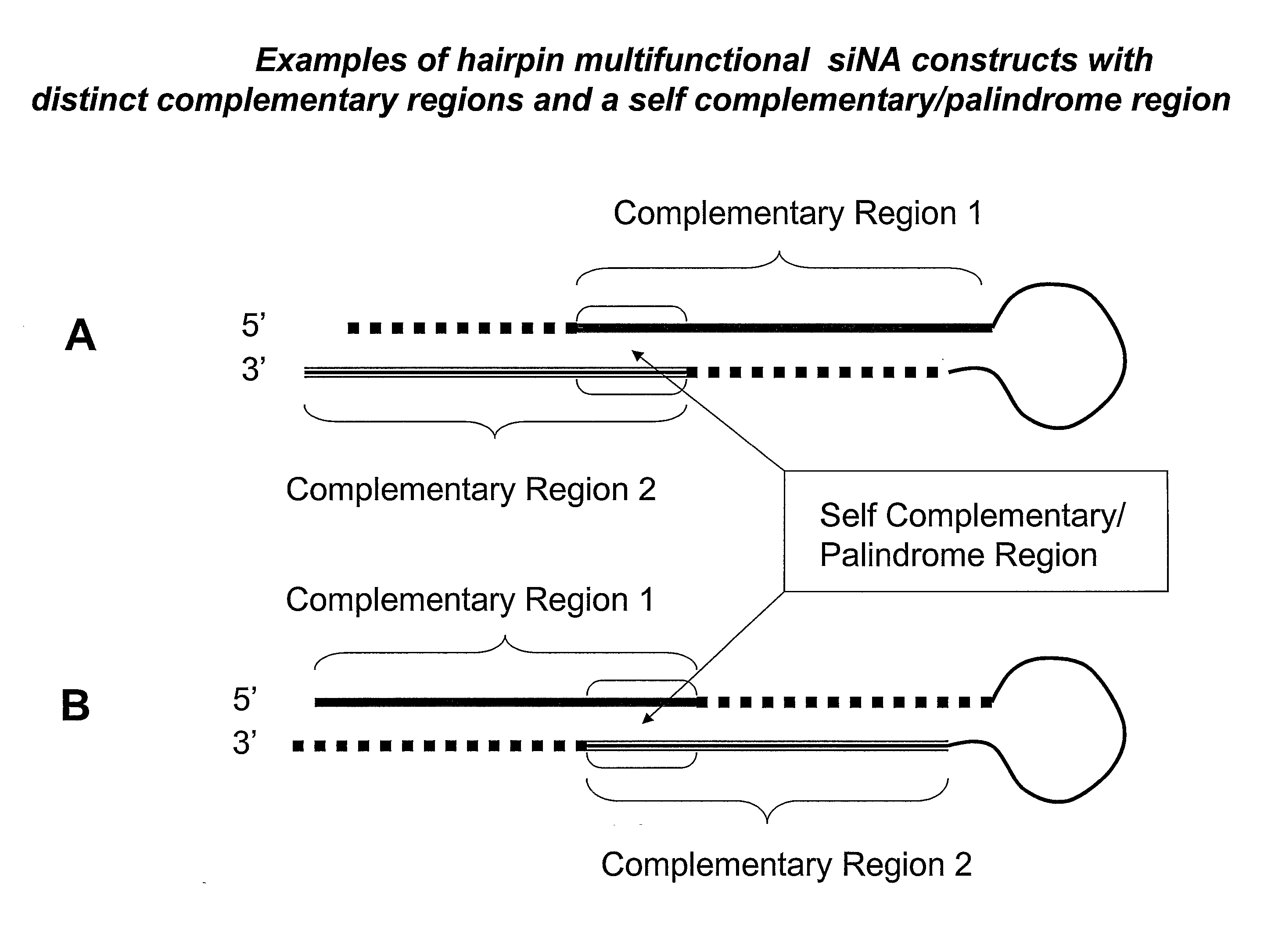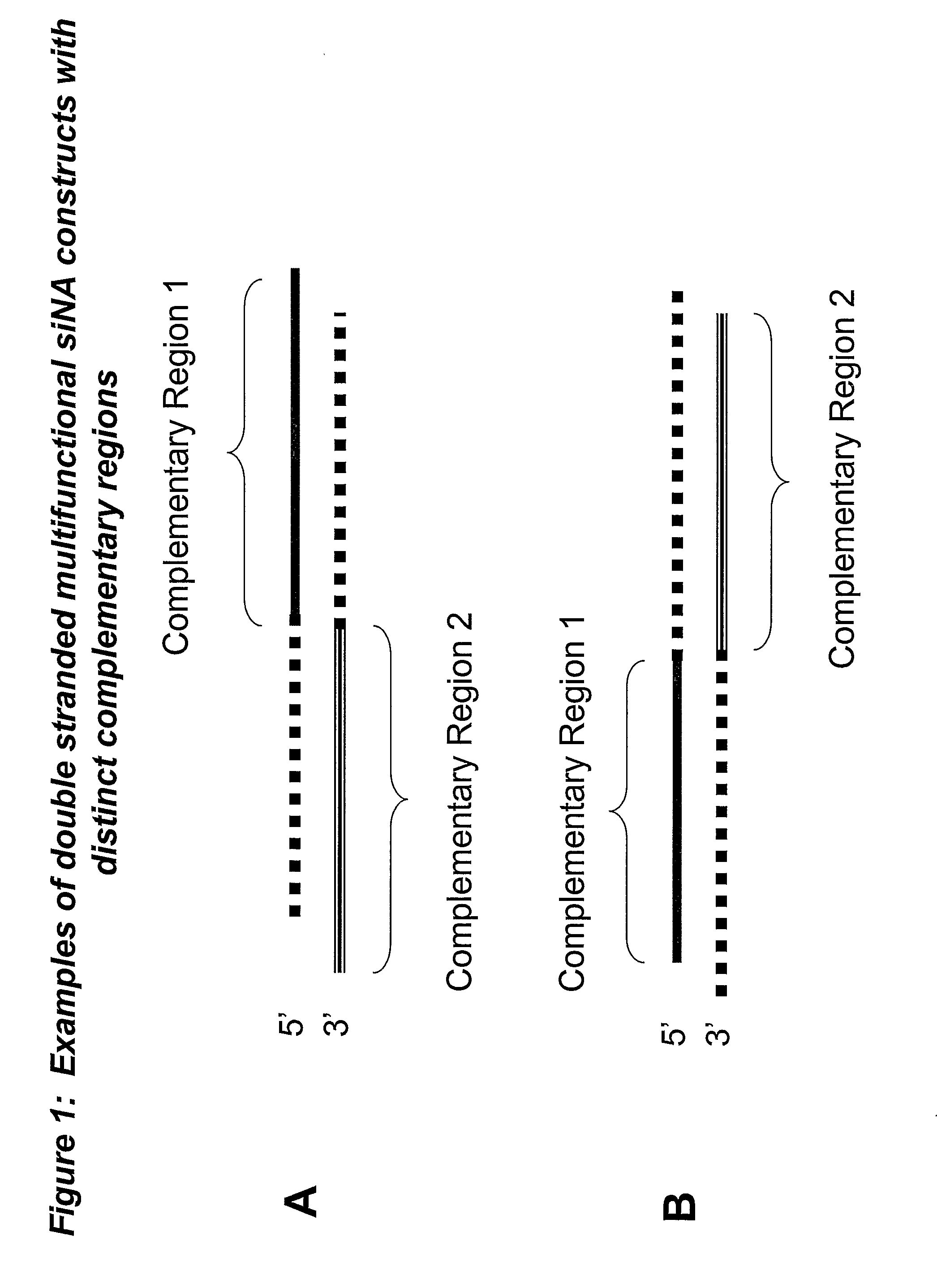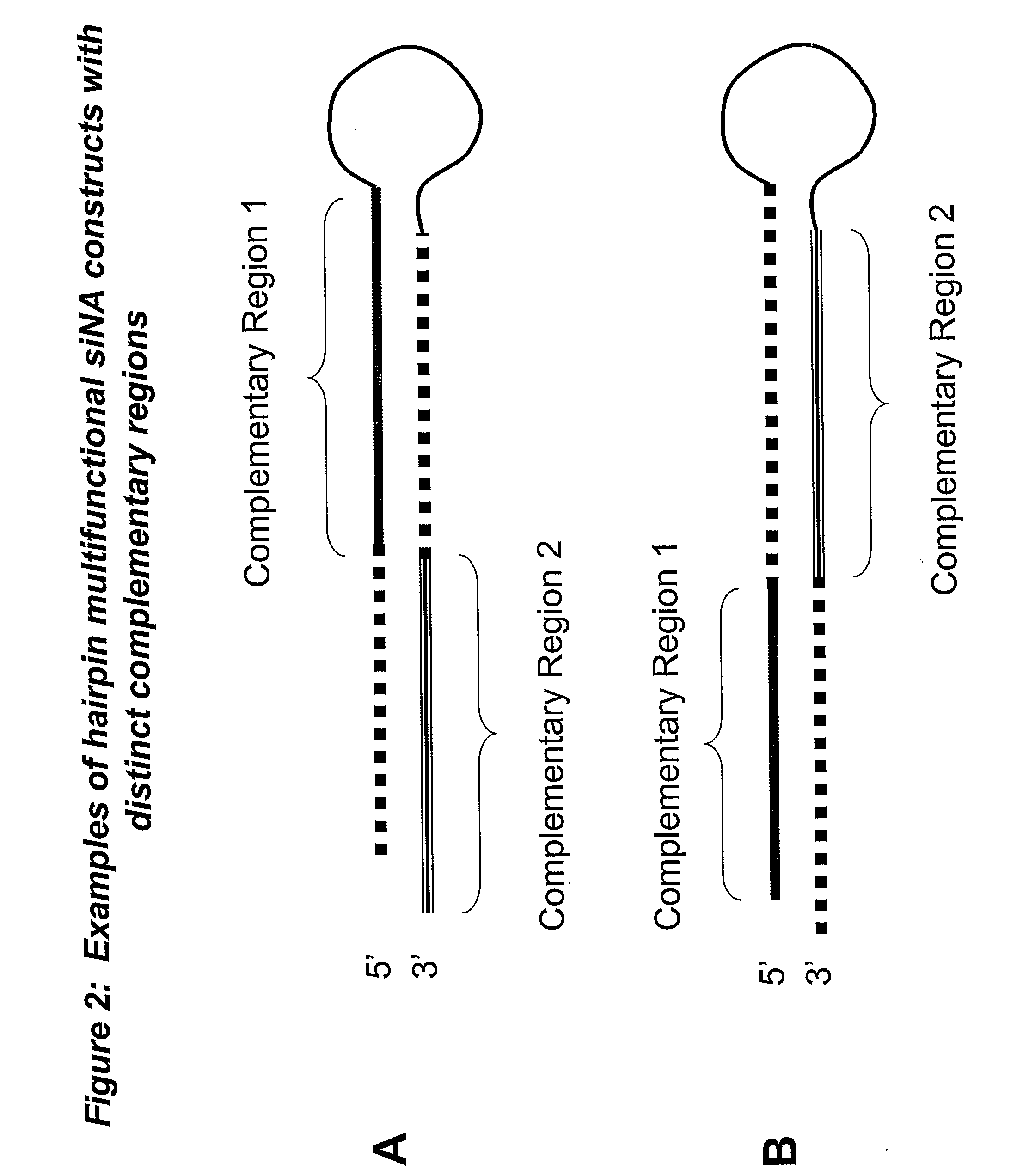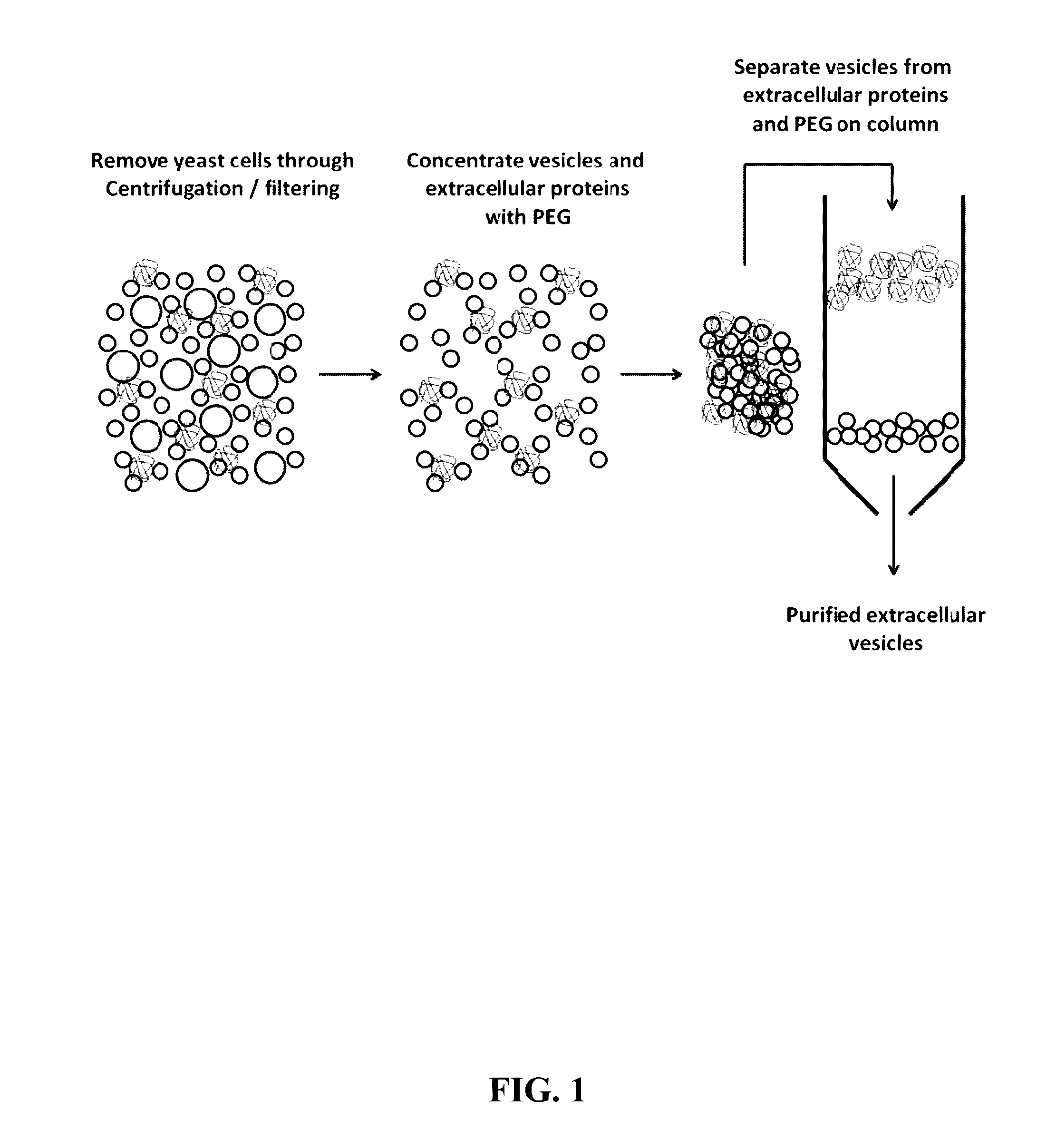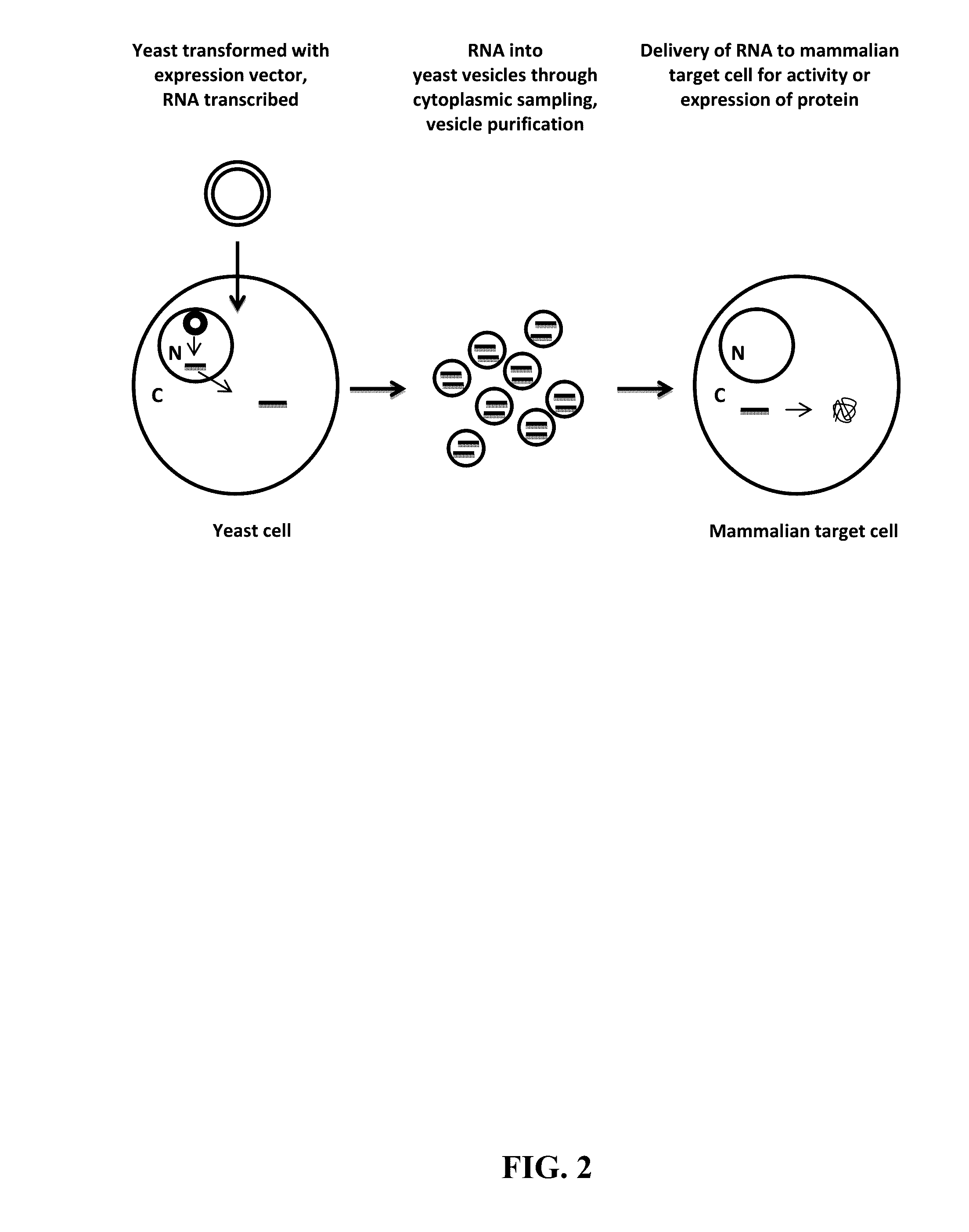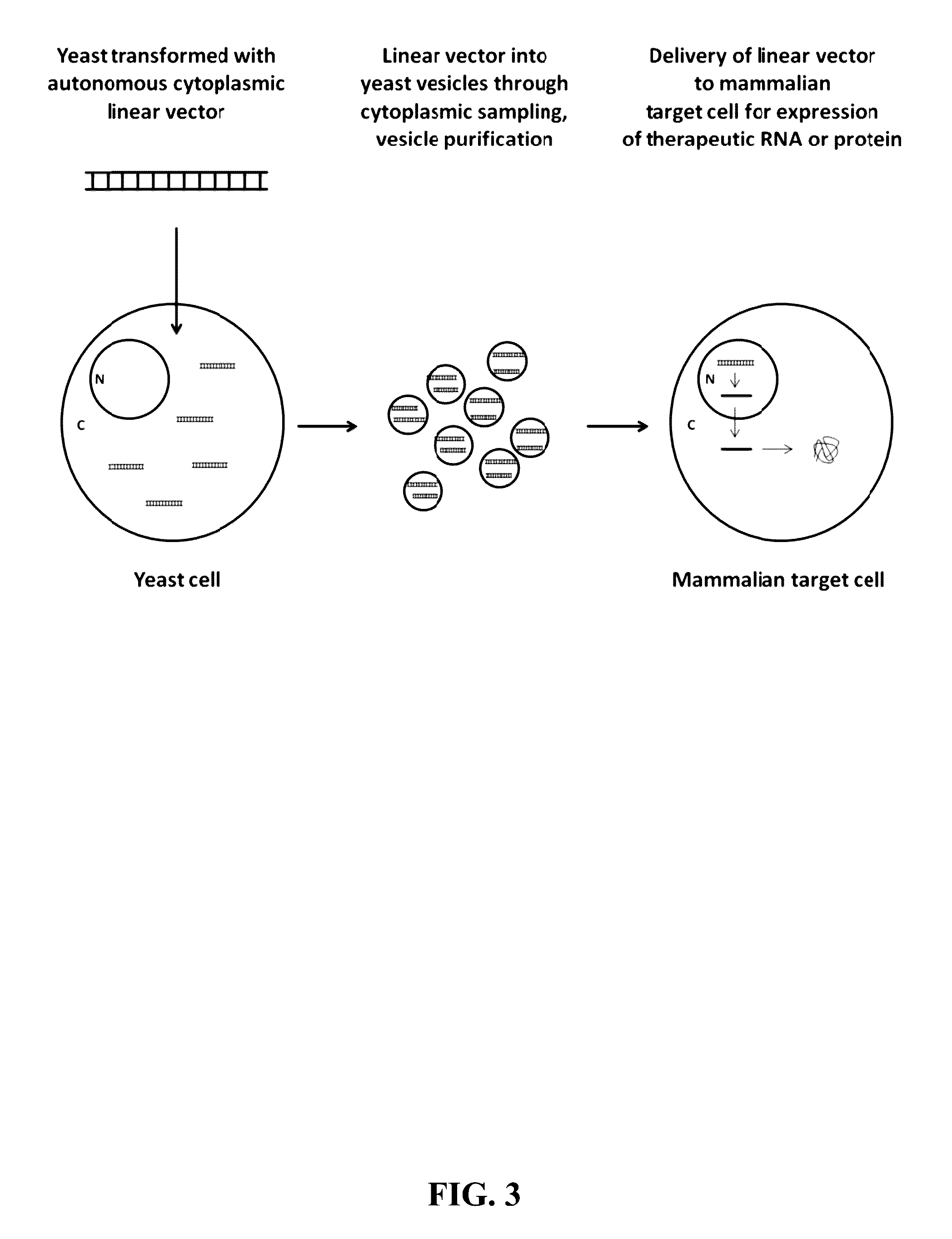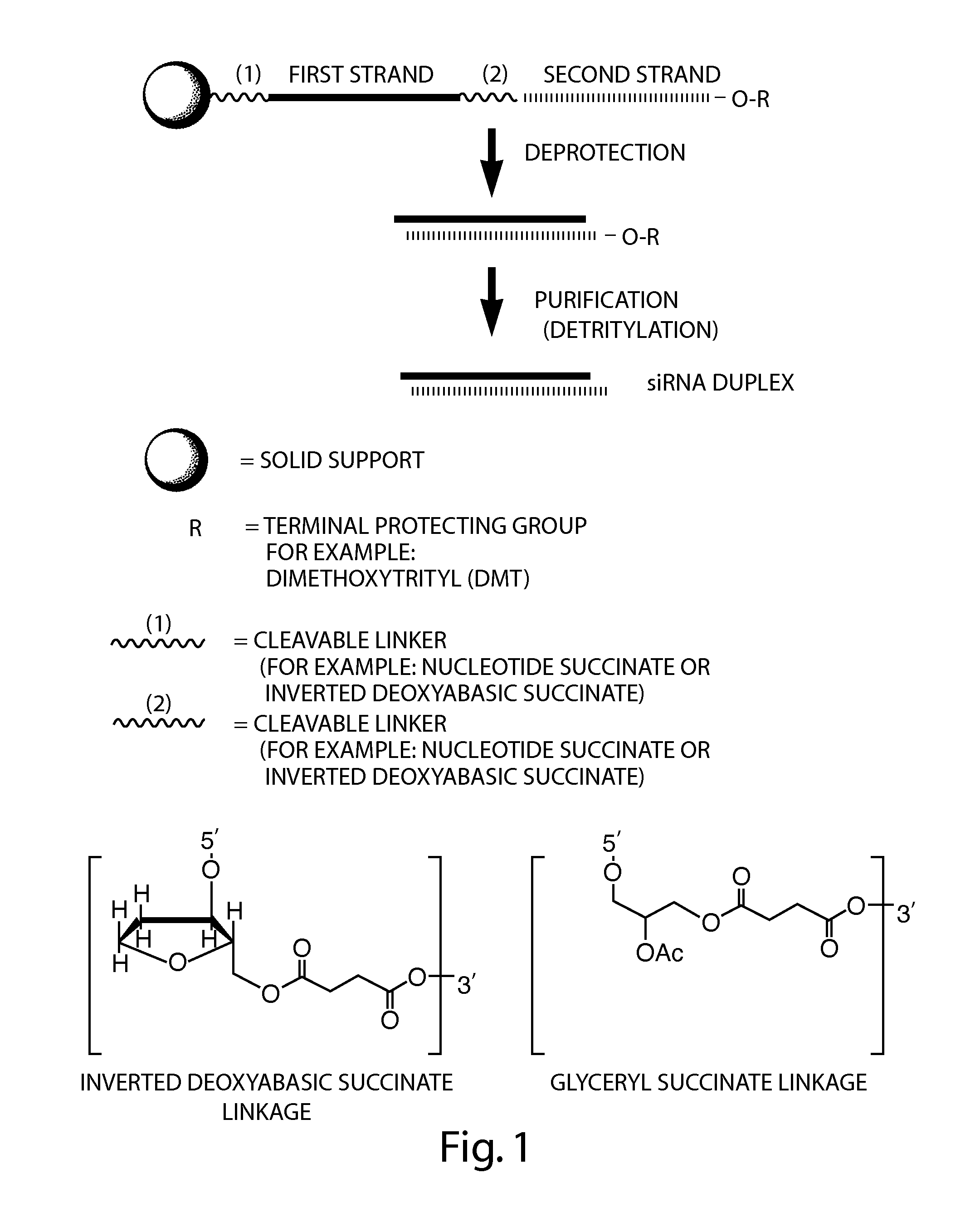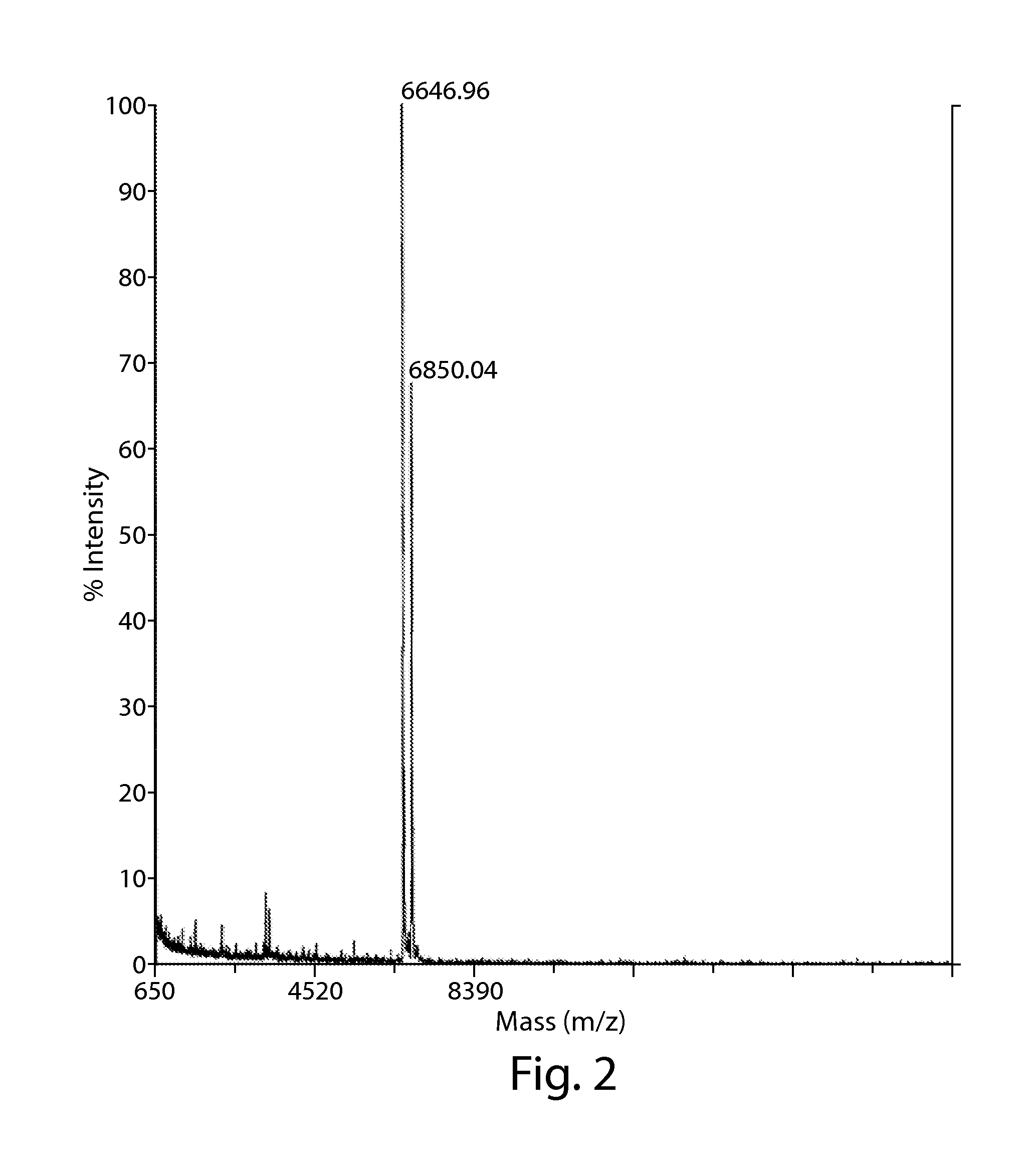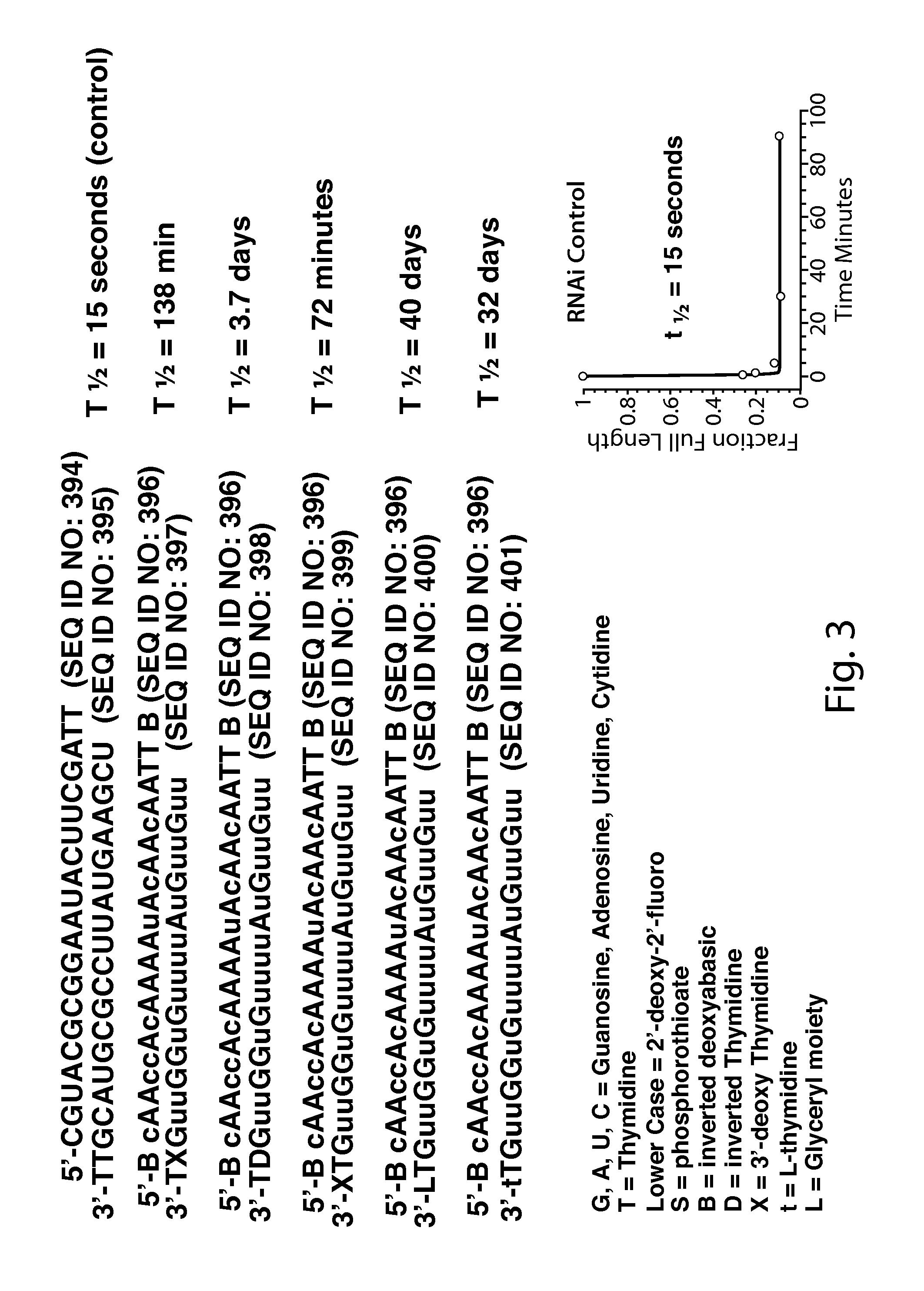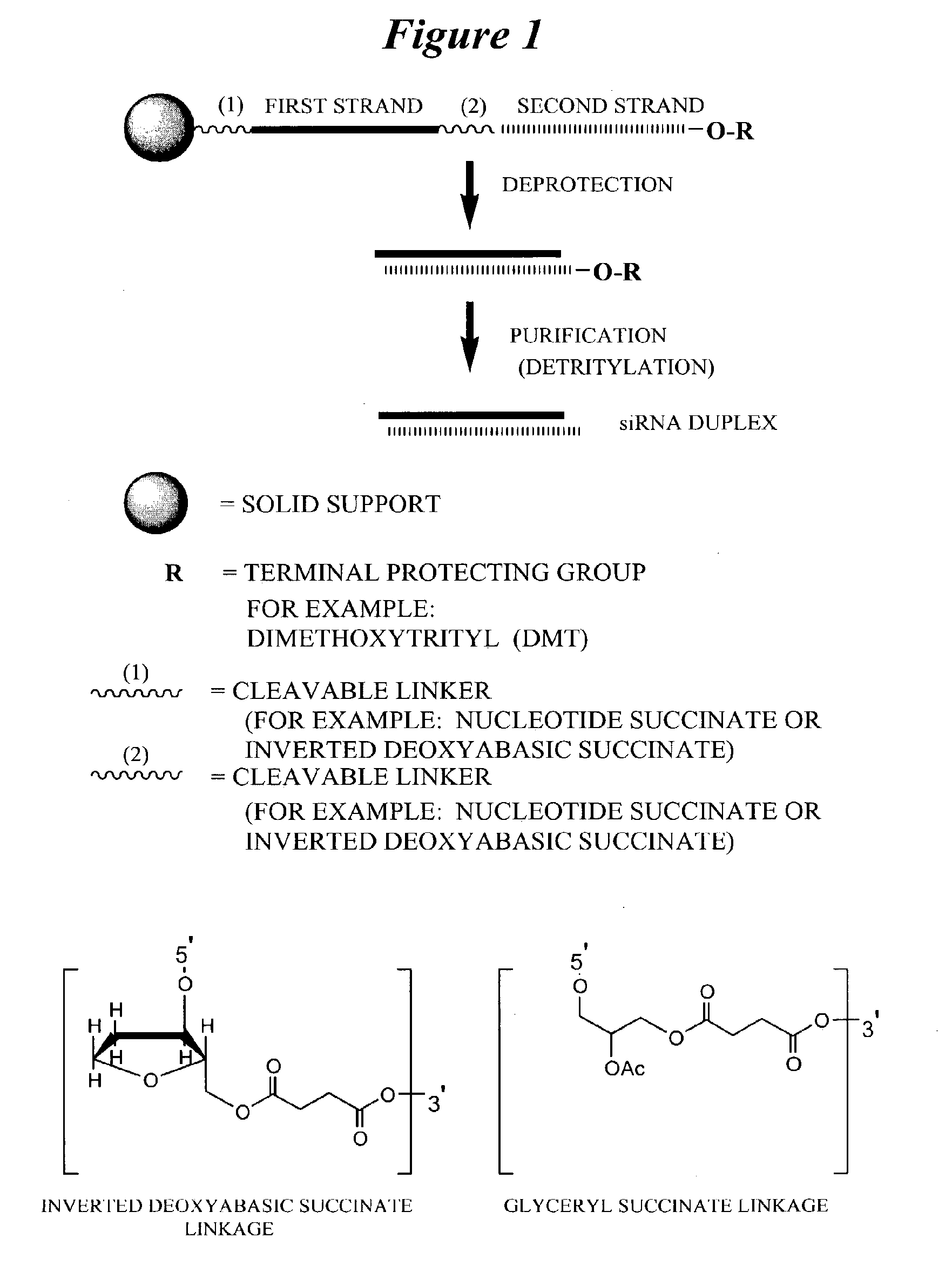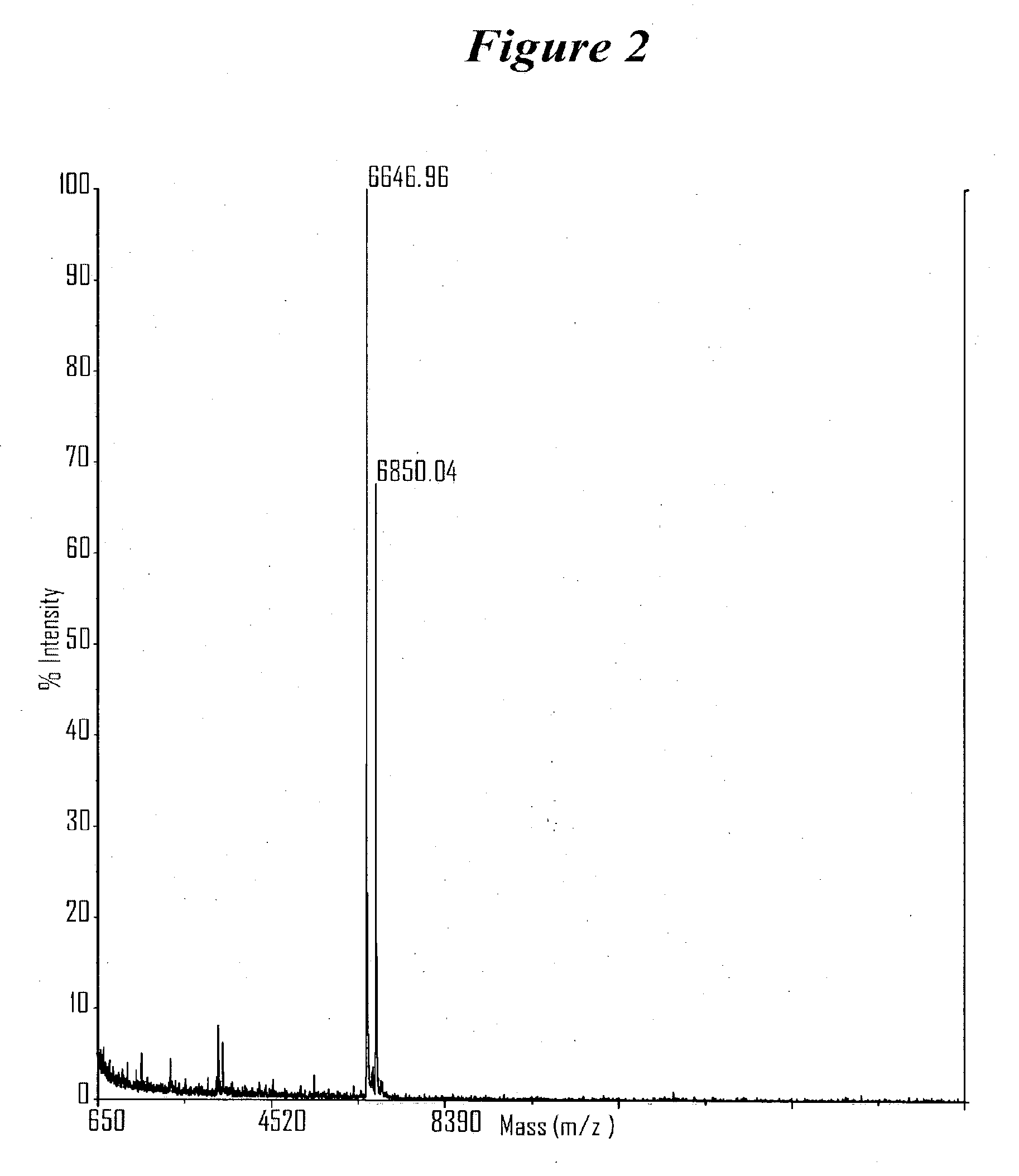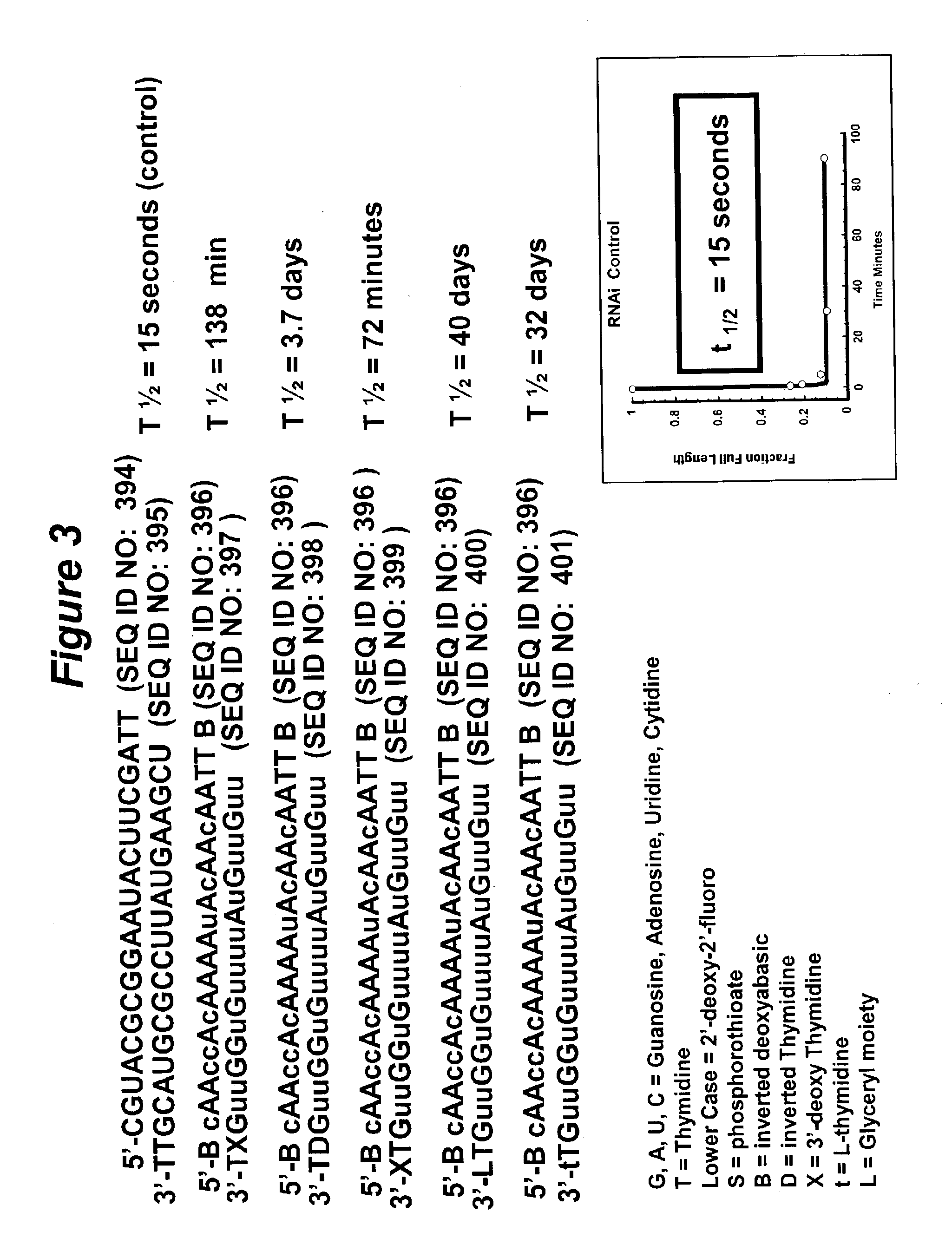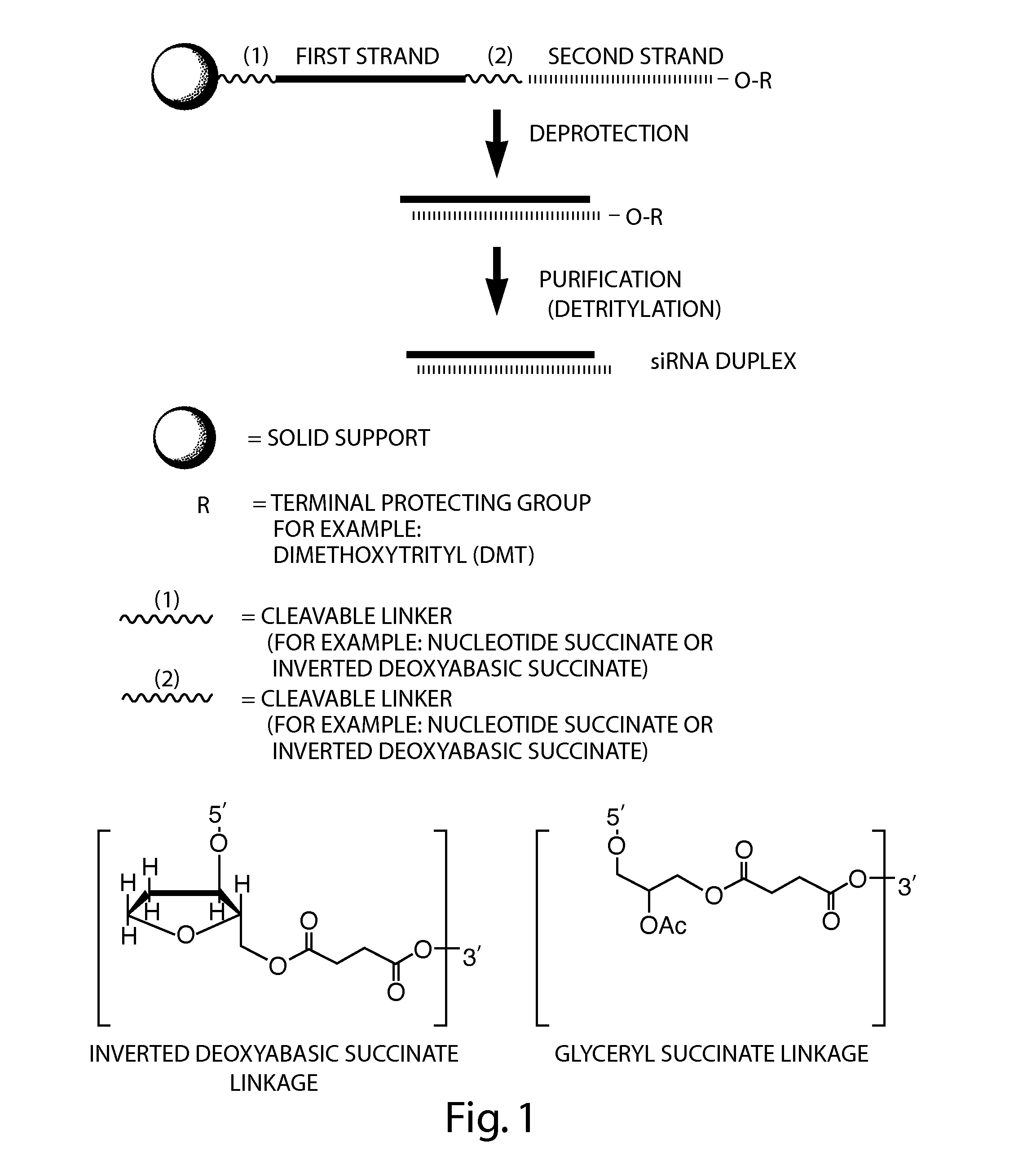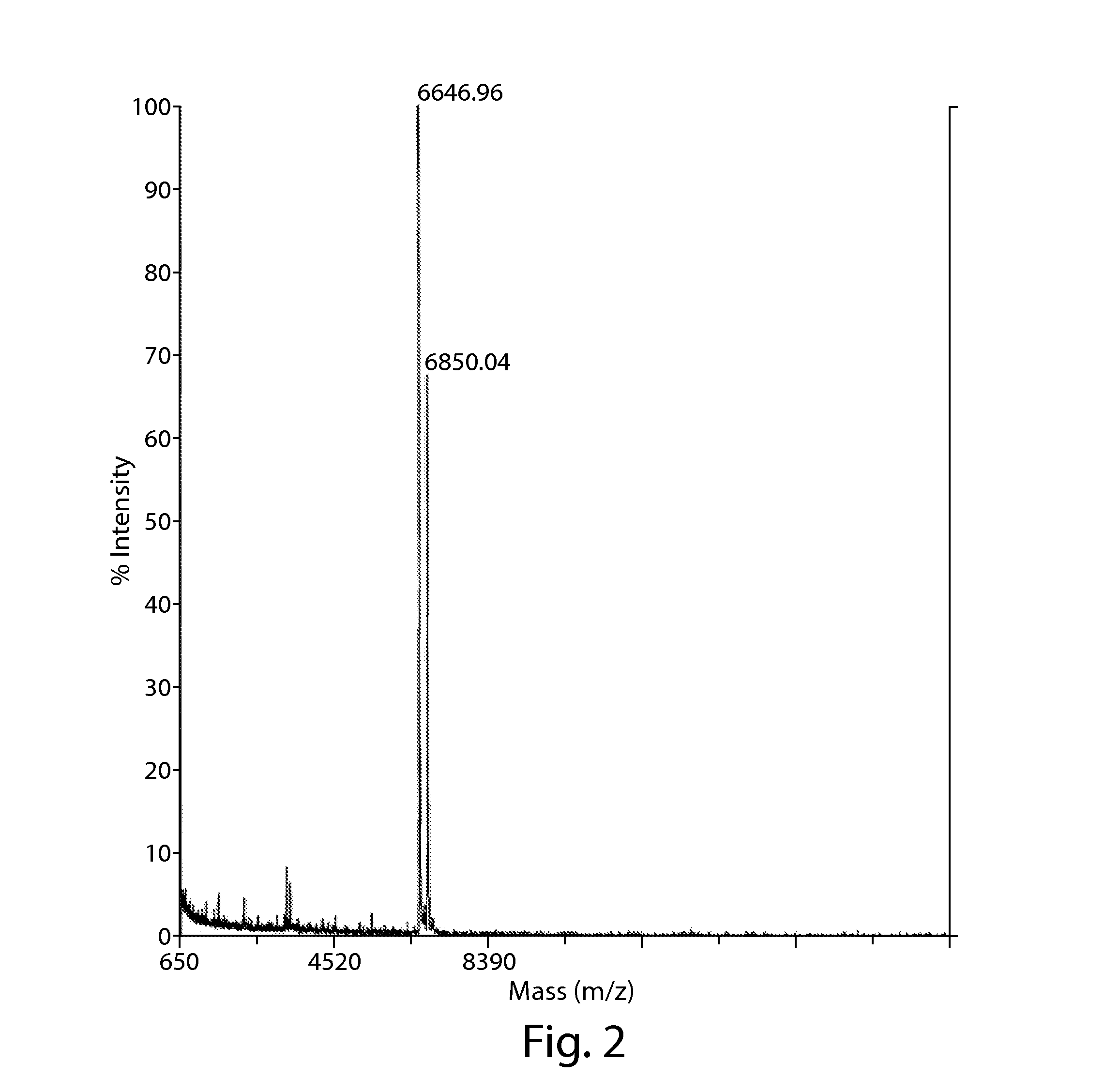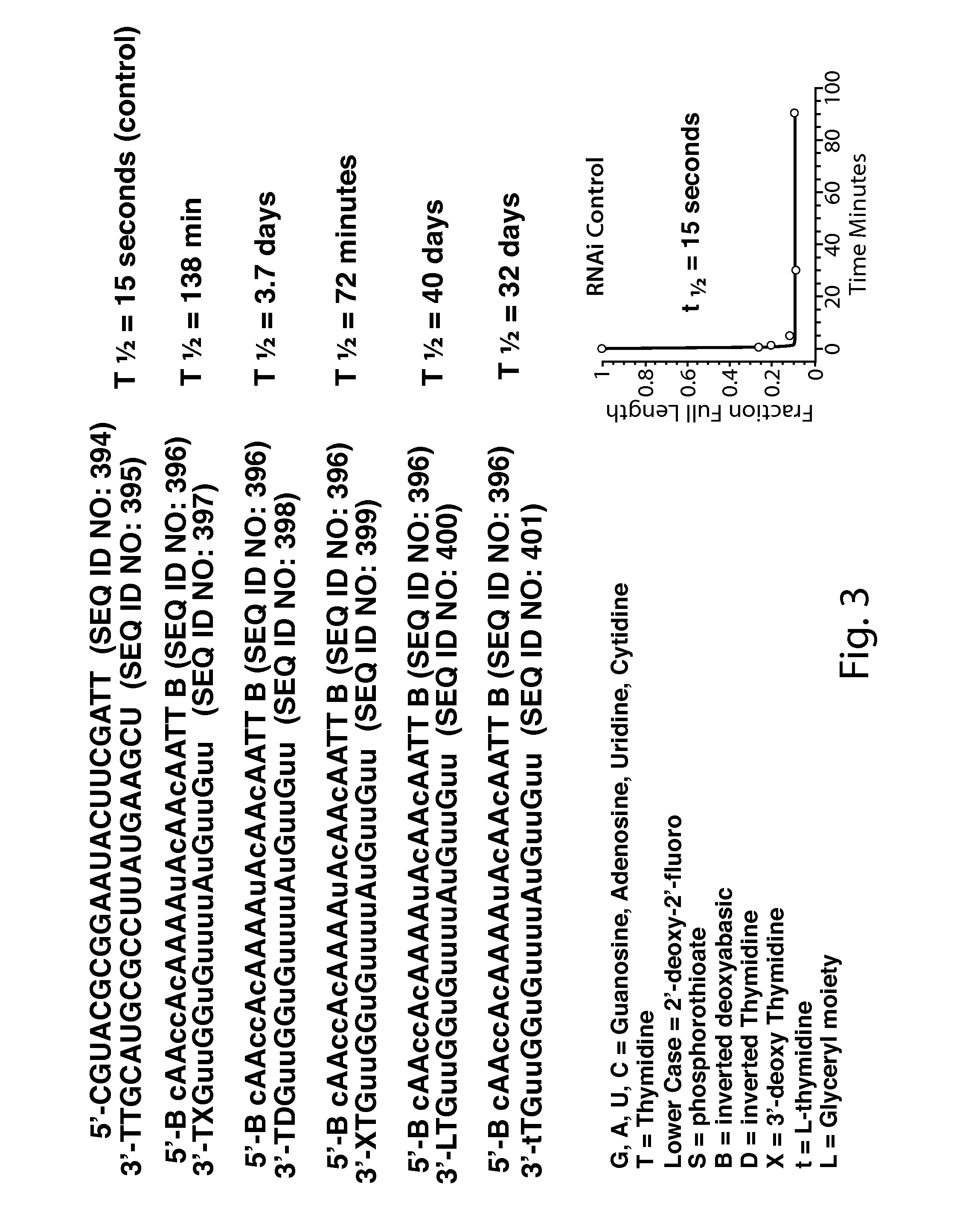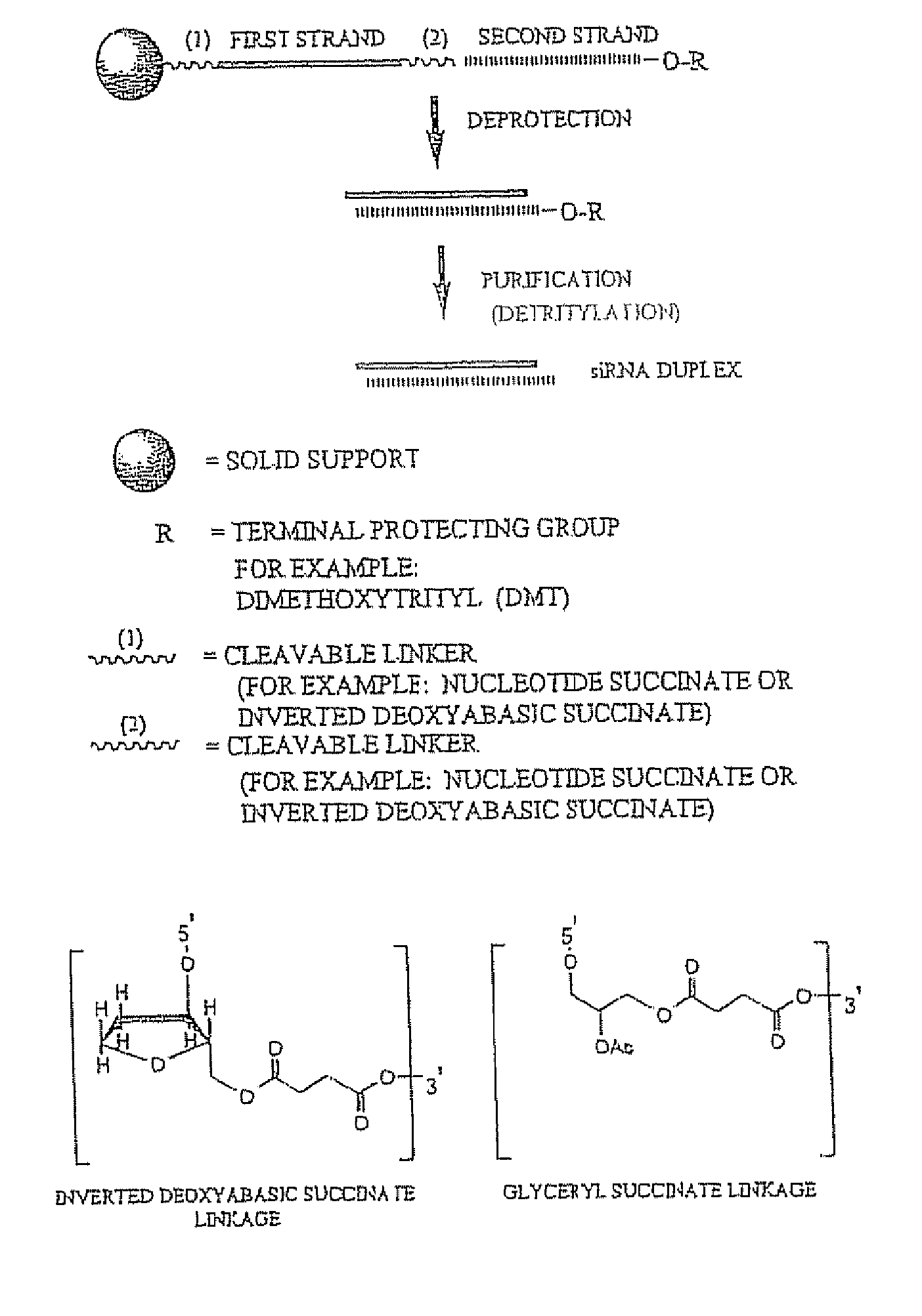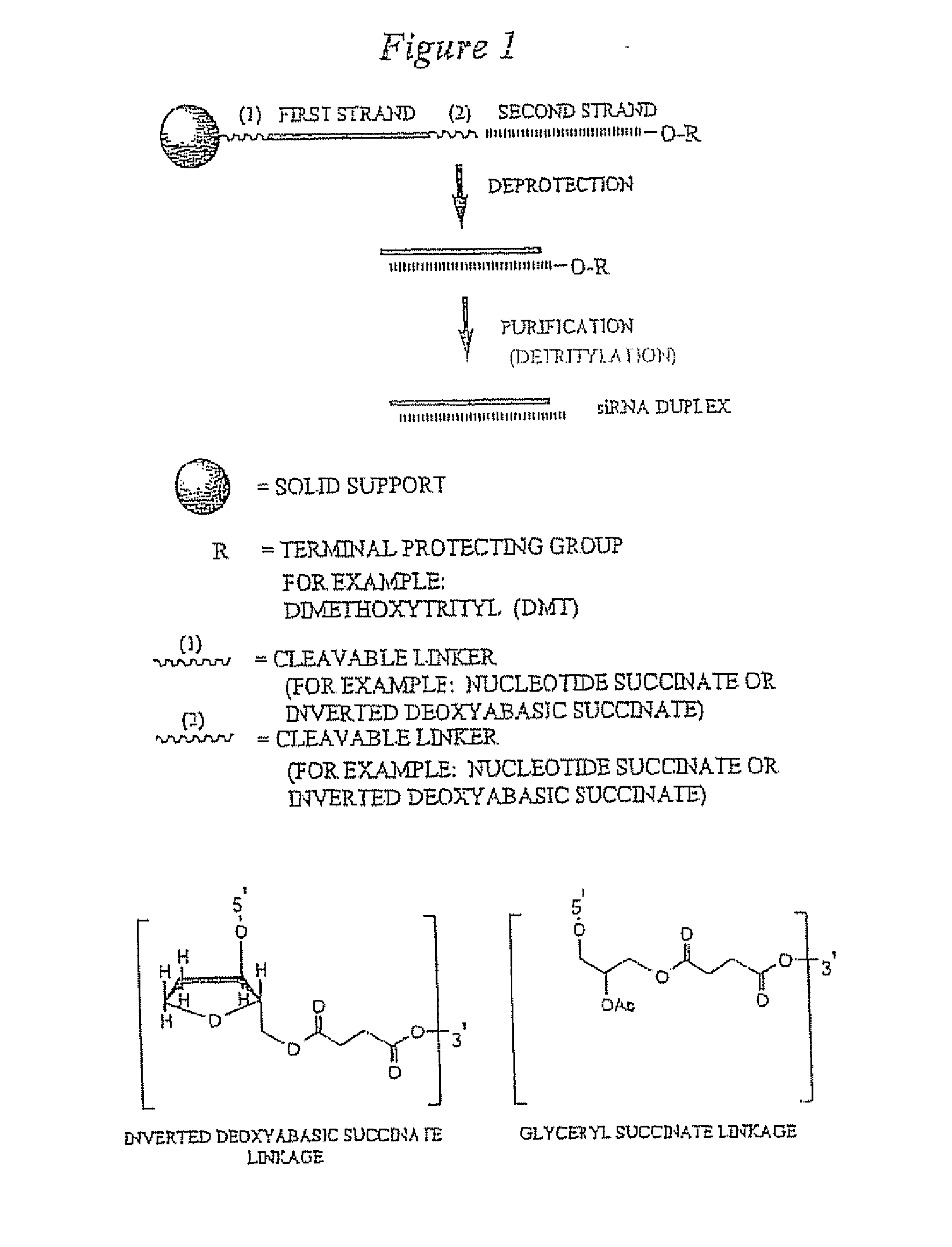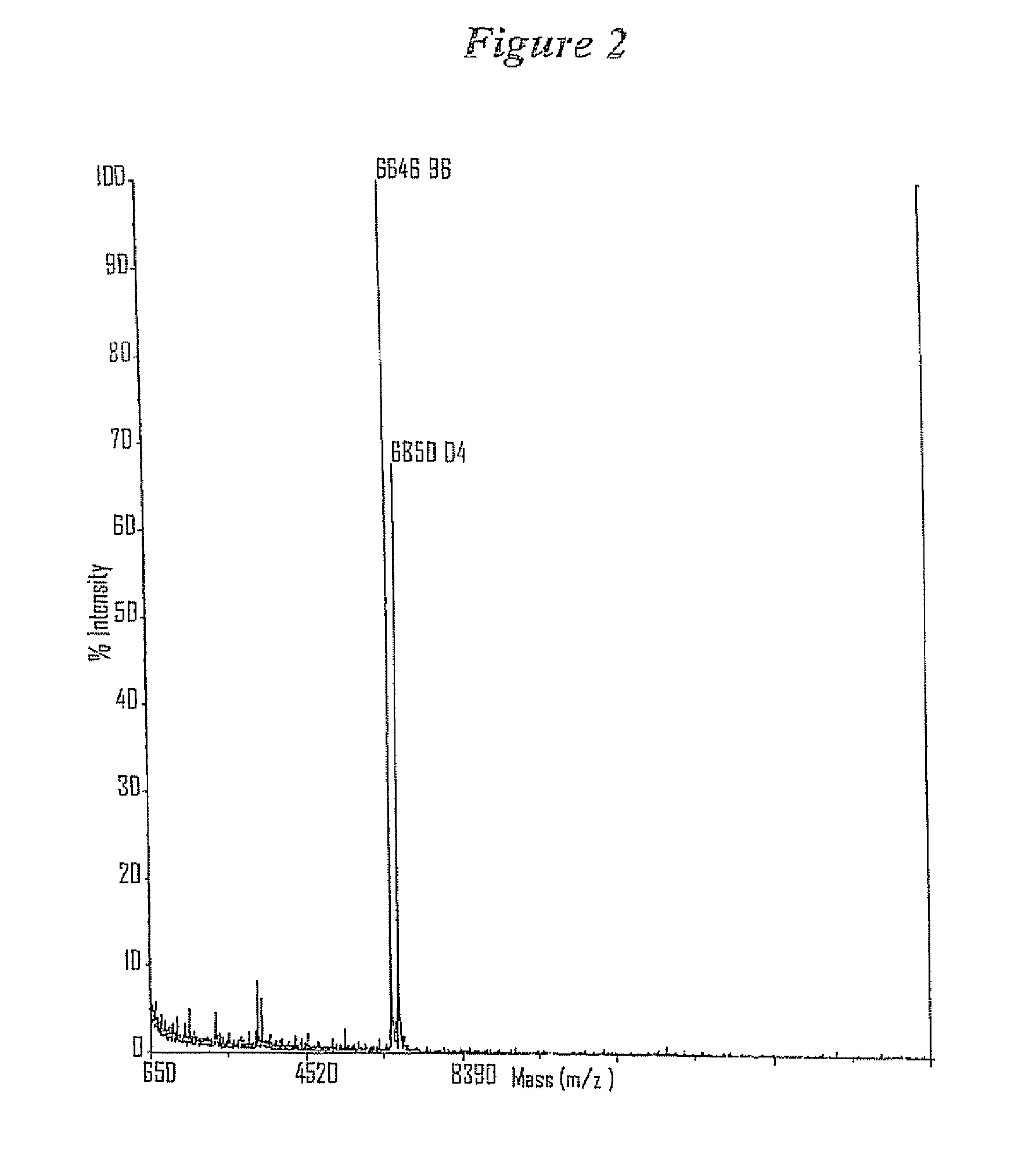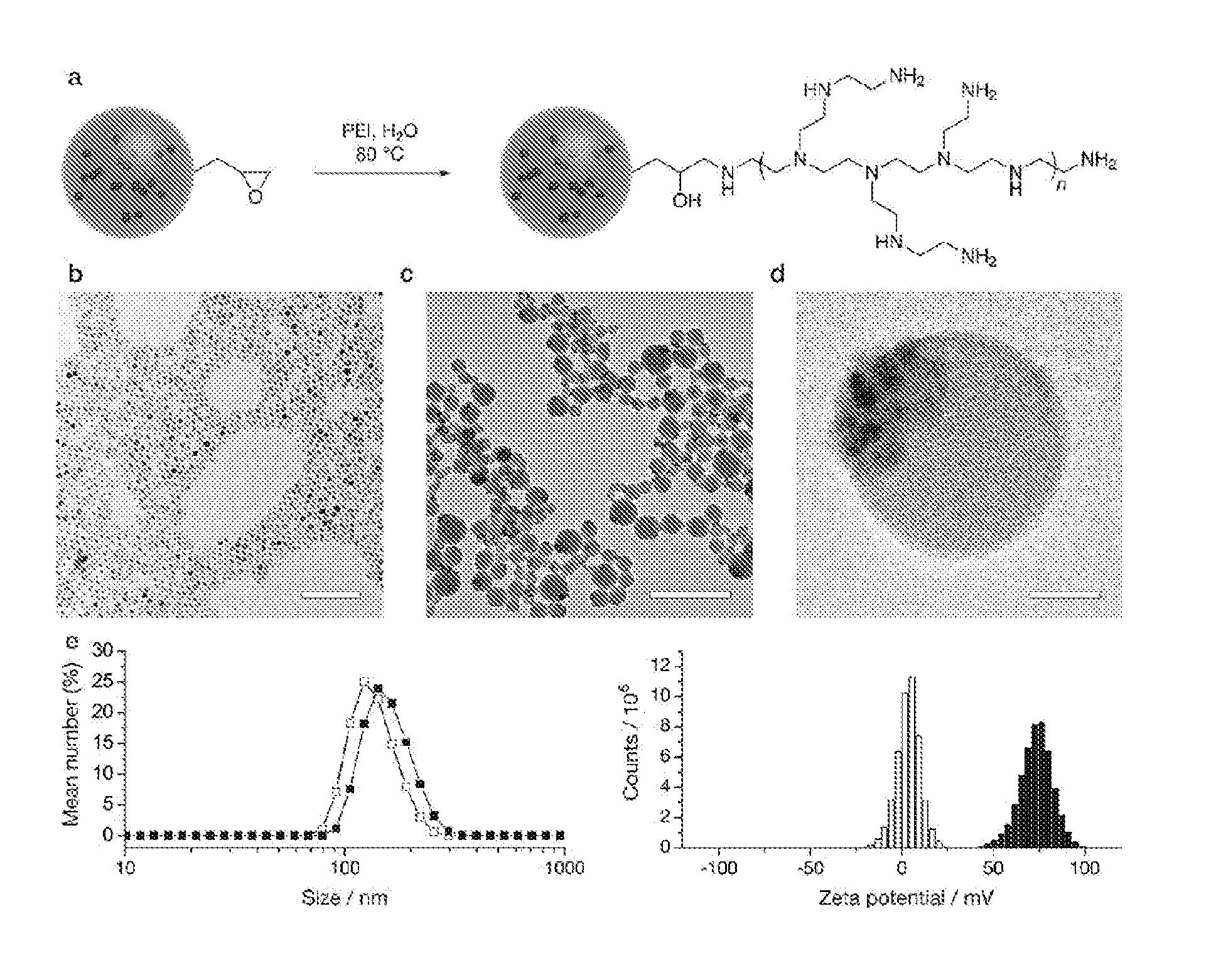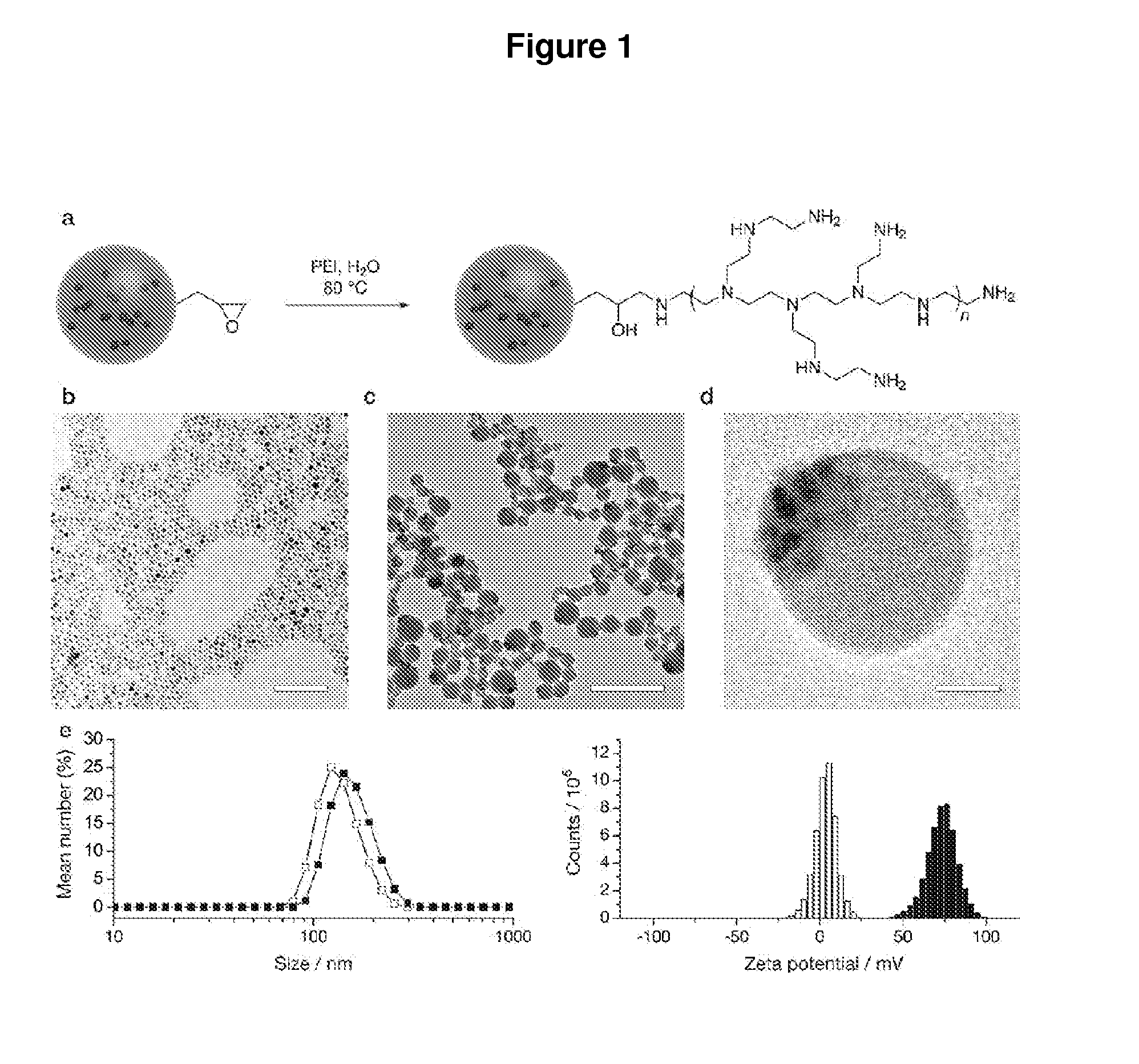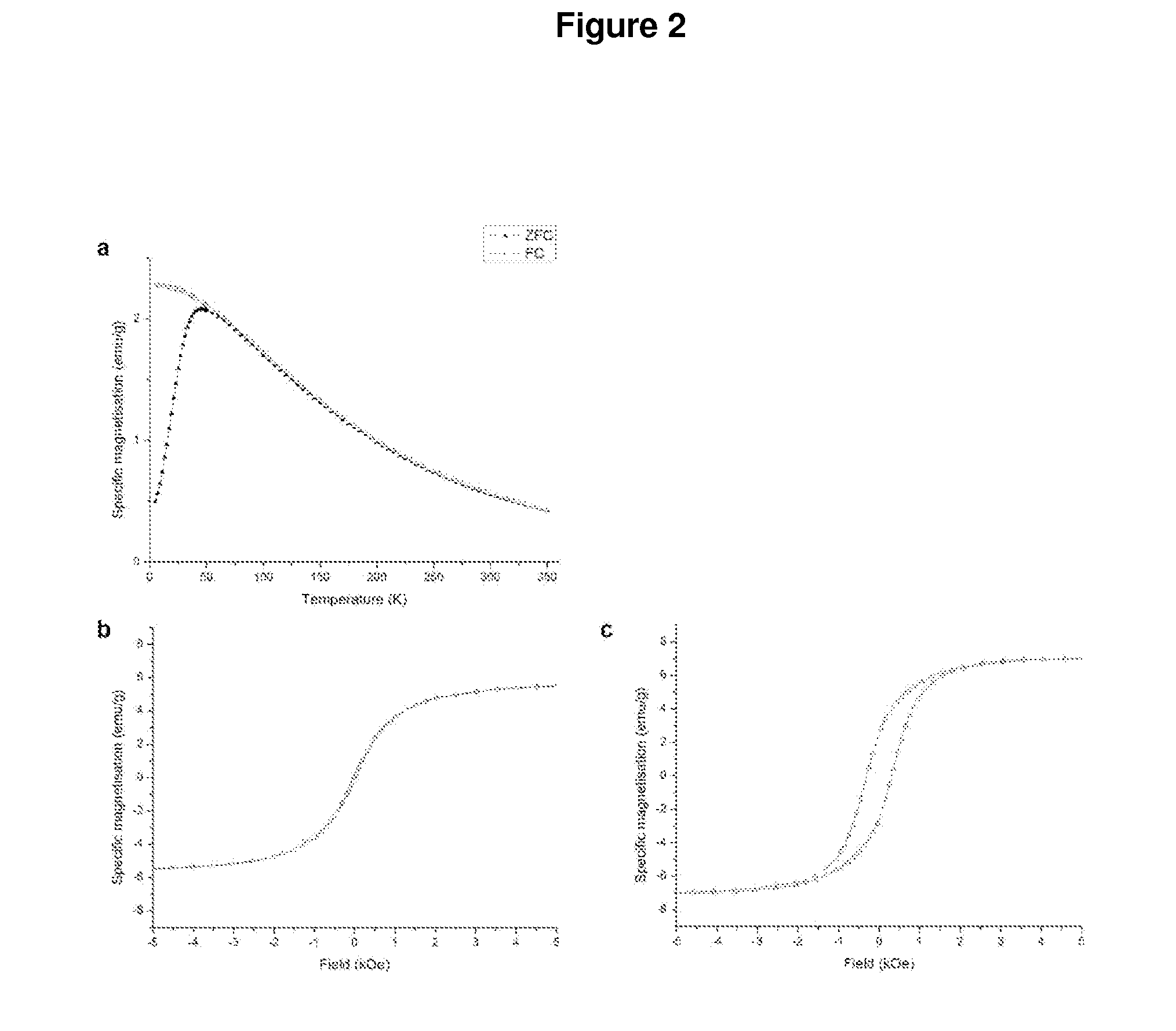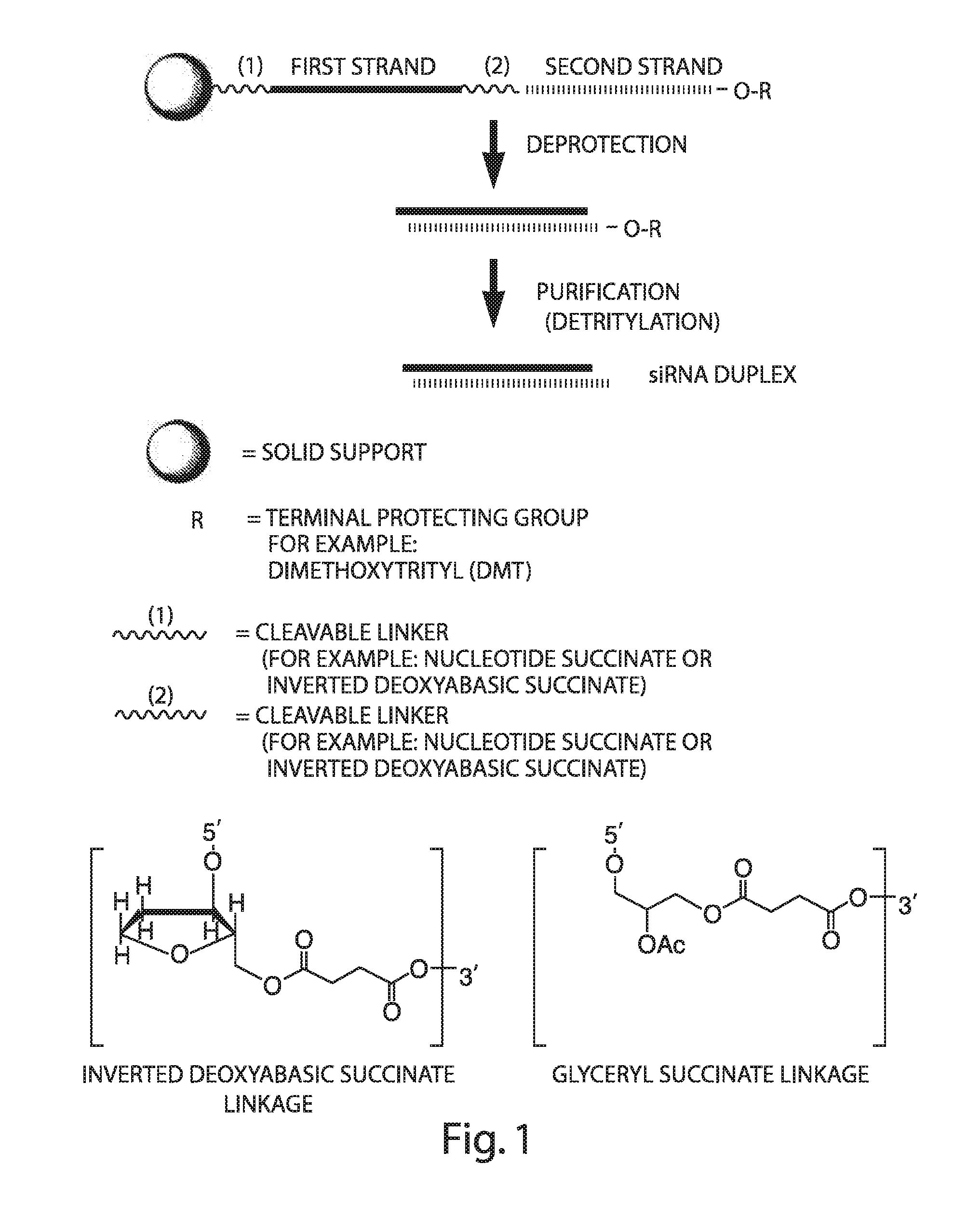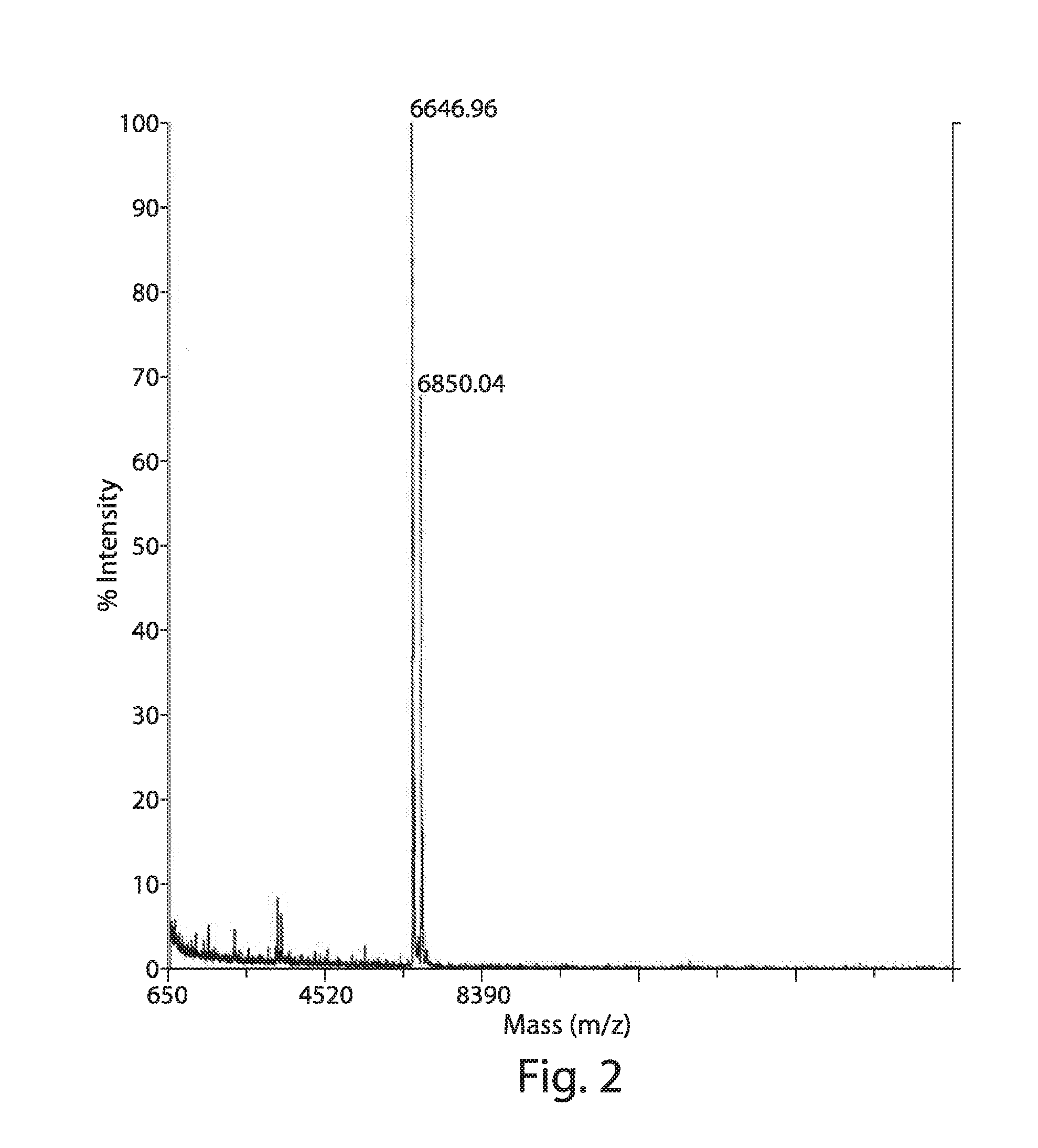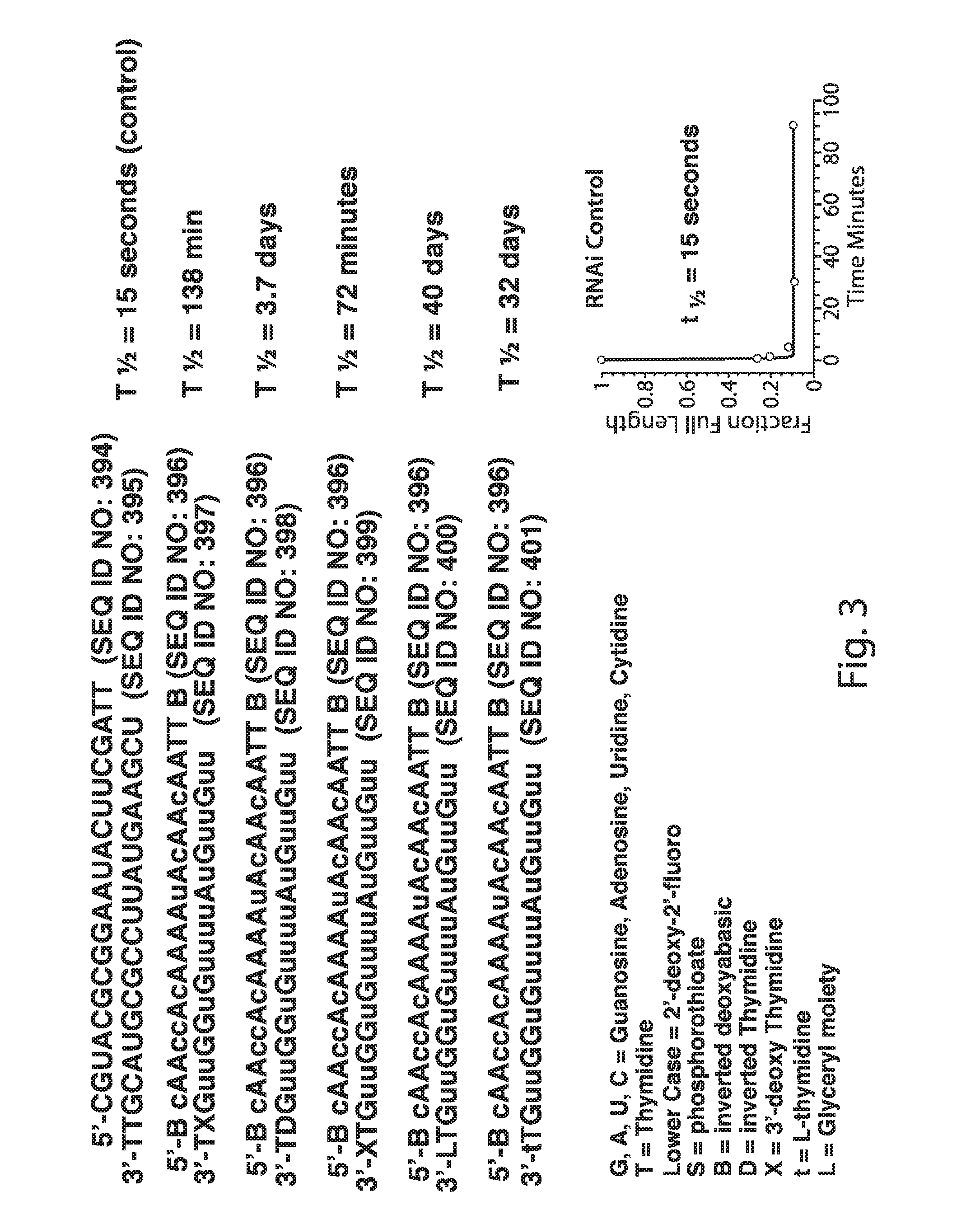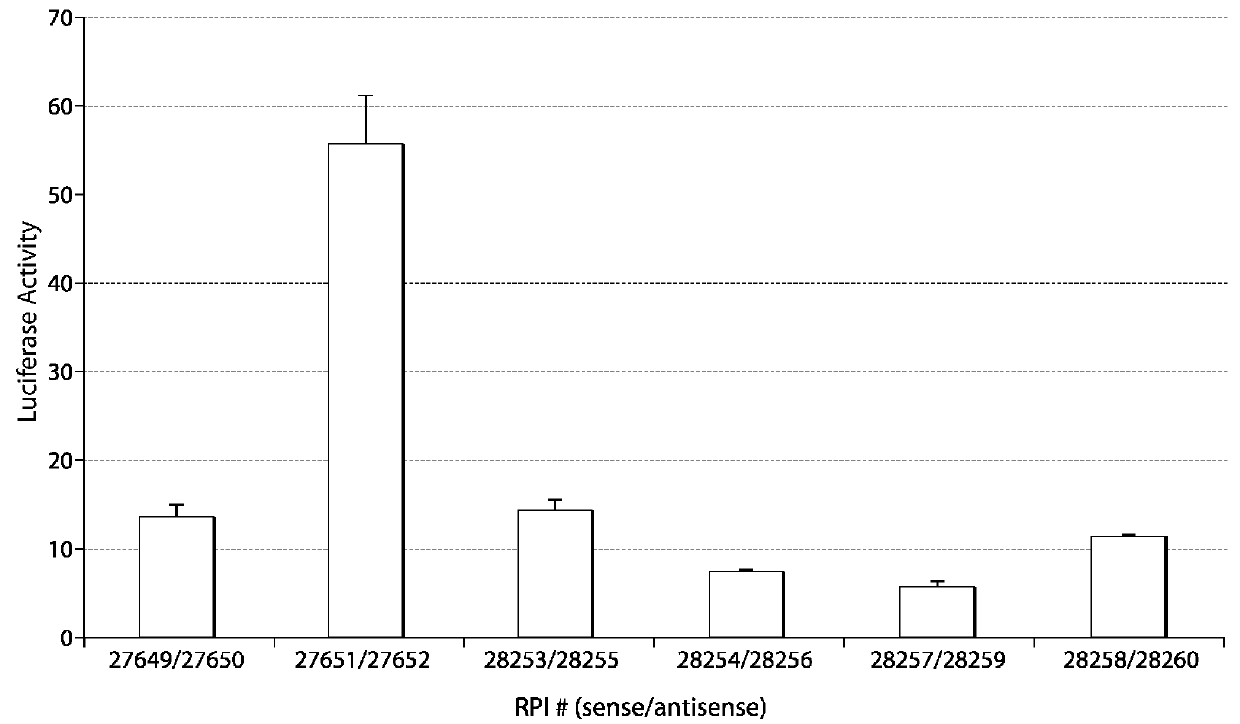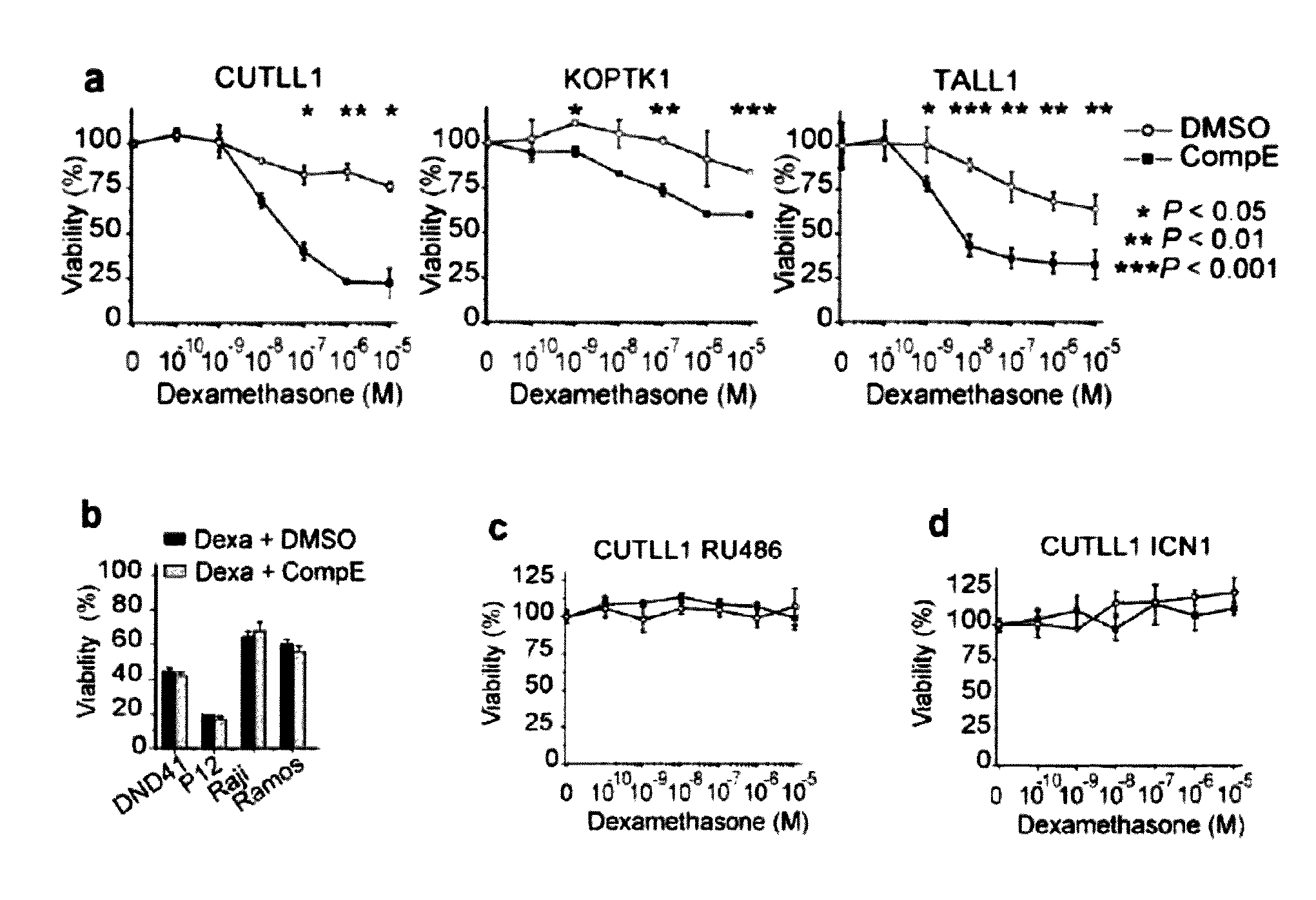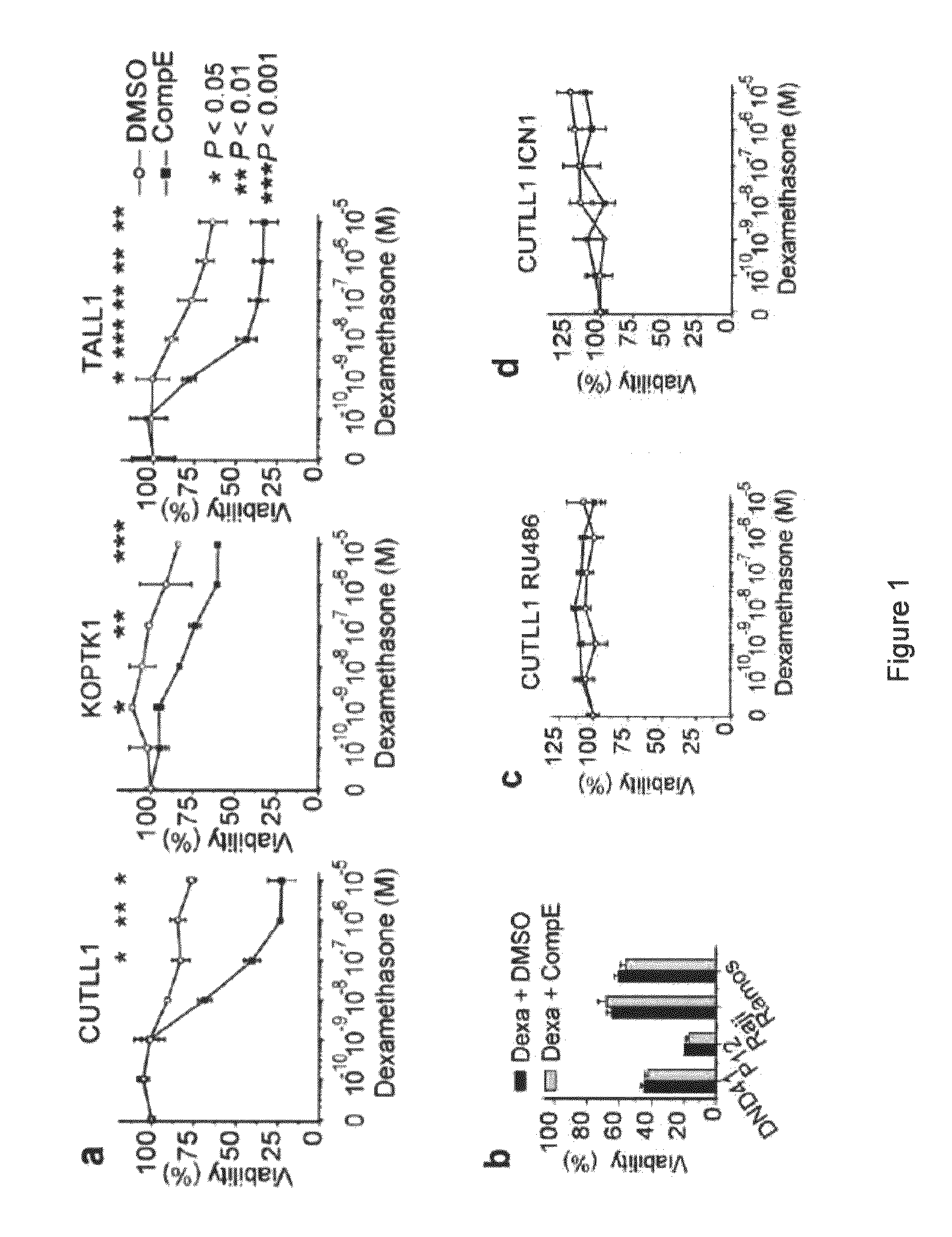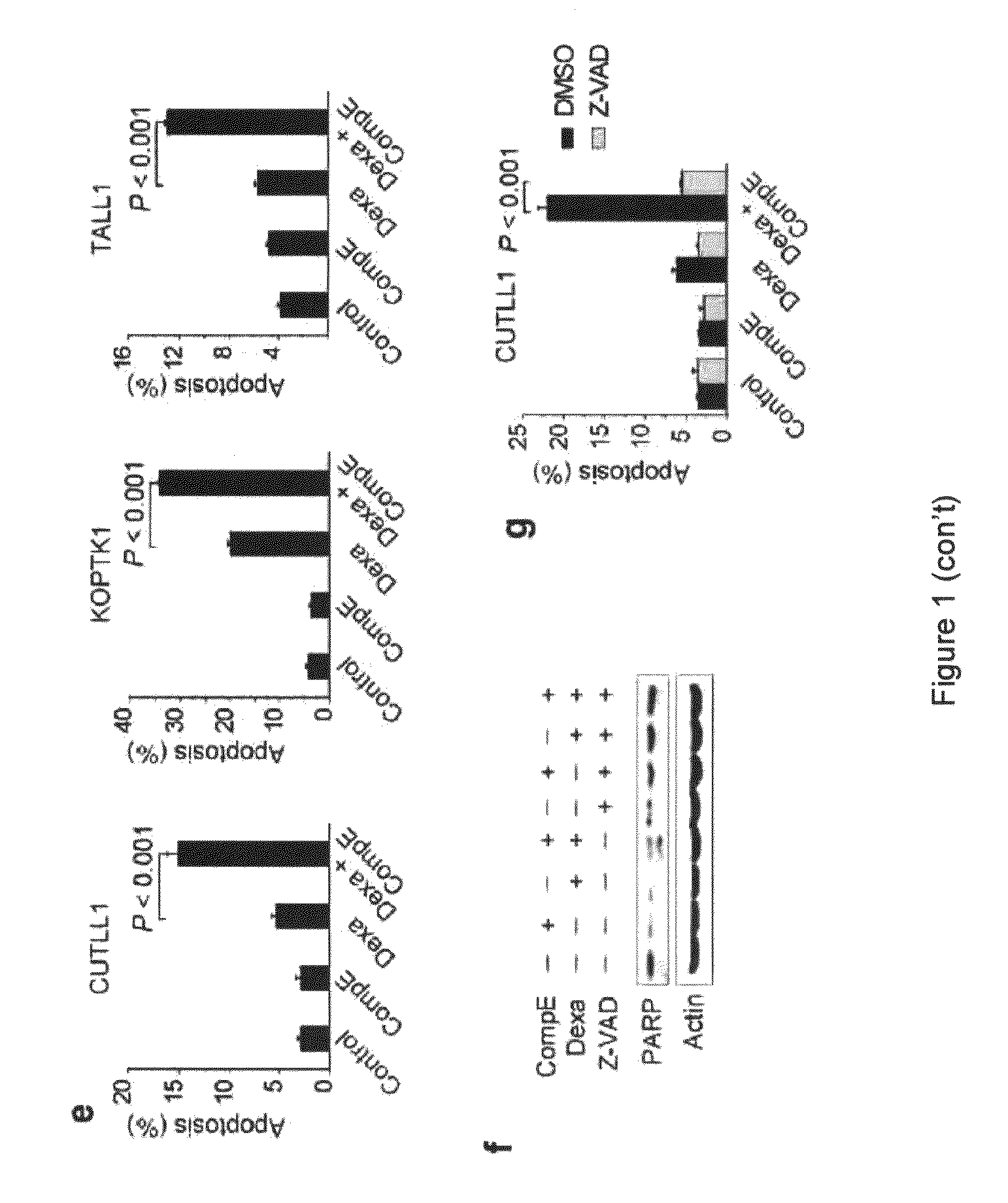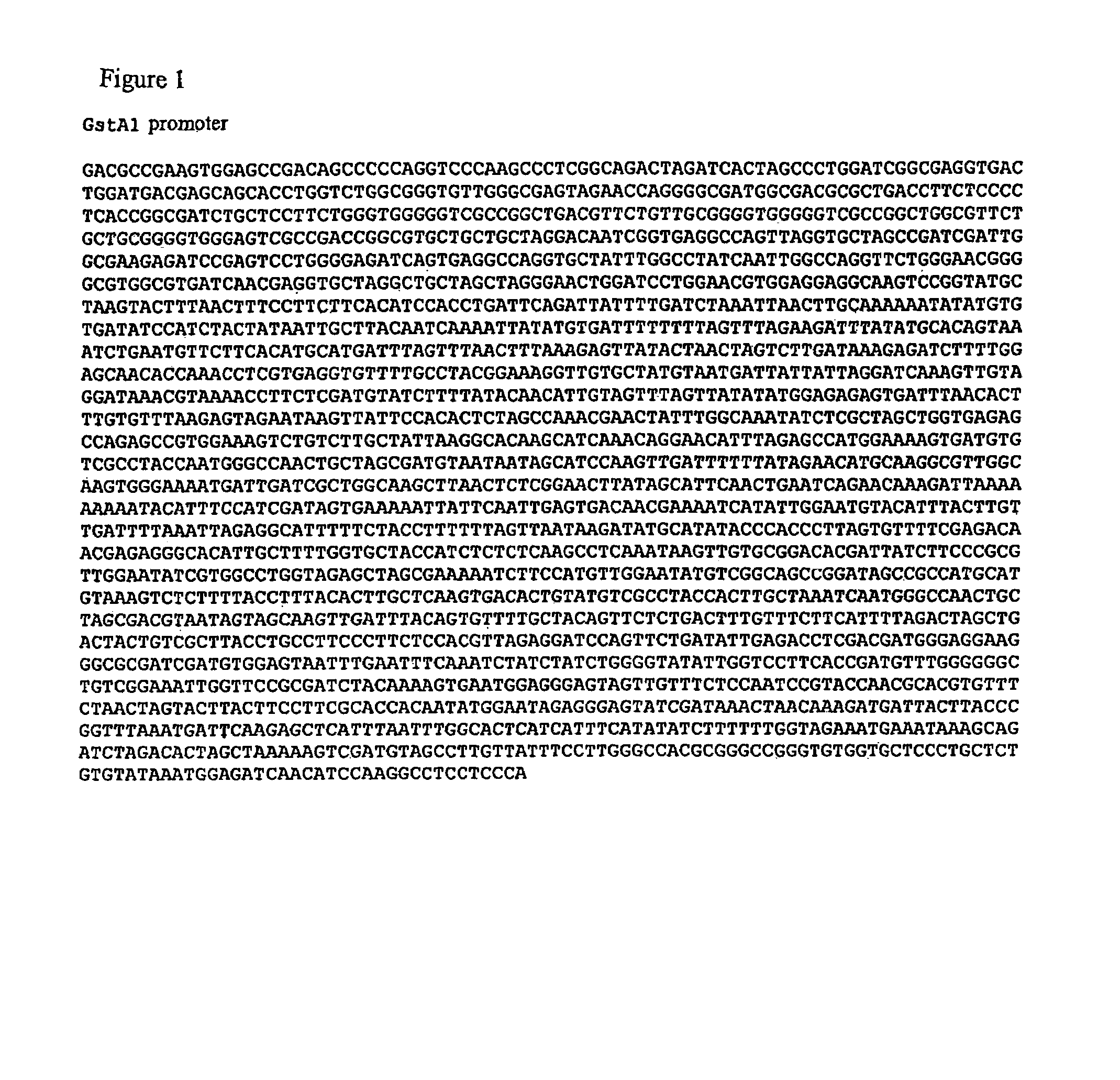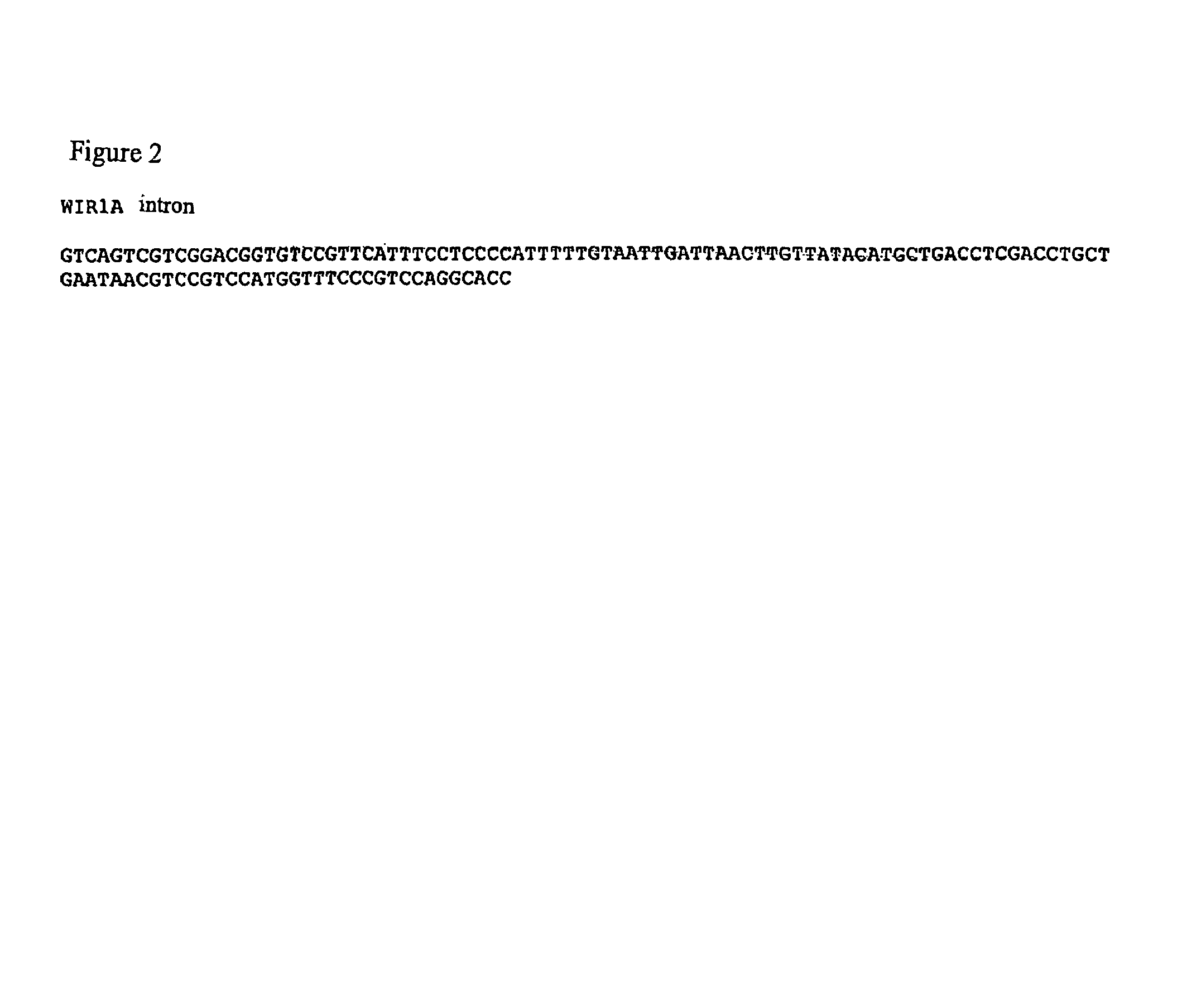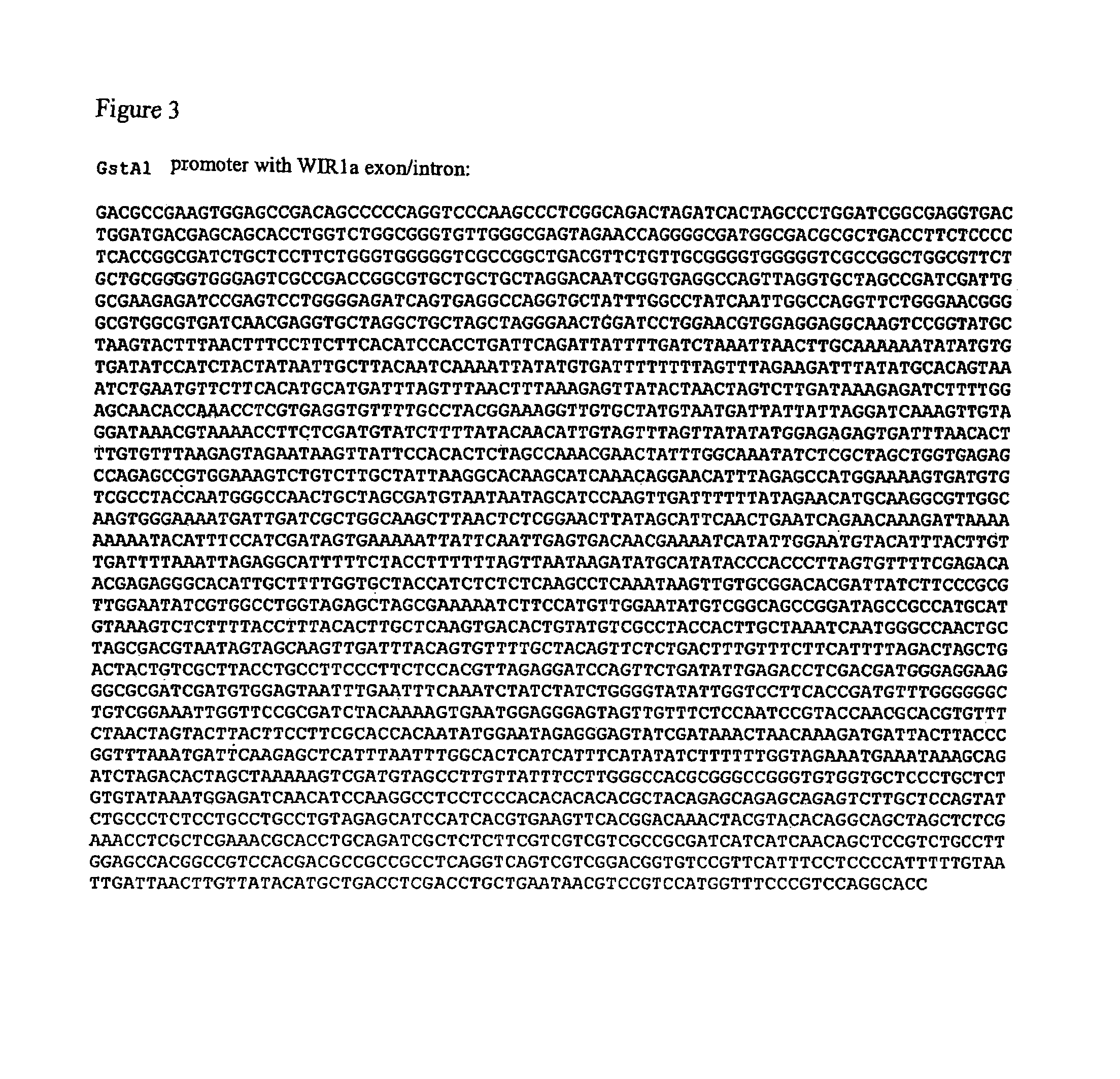Patents
Literature
31results about How to "Modulating gene expression" patented technology
Efficacy Topic
Property
Owner
Technical Advancement
Application Domain
Technology Topic
Technology Field Word
Patent Country/Region
Patent Type
Patent Status
Application Year
Inventor
RNA interference mediated inhibition of gene expression using chemically modified short interfering nucleic acid (siNA)
InactiveUS20050020525A1Improve various propertyModulate its functionCompounds screening/testingSugar derivativesDouble strandOrganism
The present invention concerns methods and reagents useful in modulating gene expression in a variety of applications, including use in therapeutic, diagnostic, target validation, and genomic discovery applications. Specifically, the invention relates to synthetic chemically modified small nucleic acid molecules, such as short interfering nucleic acid (siNA), short interfering RNA (siRNA), double-stranded RNA (dsRNA), micro-RNA (miRNA), and short hairpin RNA (shRNA) molecules capable of mediating RNA interference (RNAi) against target nucleic acid sequences. The small nucleic acid molecules are useful in the treatment of any disease or condition that responds to modulation of gene expression or activity in a cell, tissue, or organism.
Owner:SIMA THERAPEUTICS ICN
RNA interference mediated inhibition of gene expression using chemically modified short interfering nucleic acid (SiNA)
InactiveUS20050032733A1Improve various propertyModulate its functionCompounds screening/testingSpecial deliveryBiological bodyNucleic acid sequencing
The present invention concerns methods and reagents useful in modulating gene expression in a variety of applications, including use in therapeutic, diagnostic, target validation, and genomic discovery applications. Specifically, the invention relates to synthetic chemically modified small nucleic acid molecules, such as short interfering nucleic acid (siNA), short interfering RNA (siRNA), double-stranded RNA (dsRNA), micro-RNA (miRNA), and short hairpin RNA (shRNA) molecules capable of mediating RNA interference (RNAi) against target nucleic acid sequences. The small nucleic acid molecules are useful in the treatment of any disease or condition that responds to modulation of gene expression or activity in a cell, tissue, or organism.
Owner:SIRNA THERAPEUTICS INC
RNA interference mediated inhibition of gene expression using multifunctional short interfering nucleic acid (multifunctional siNA)
ActiveUS7858769B2Down regulating or inhibiting the expression of one or more target nucleicInhibit and reduce expressionSugar derivativesPeptide/protein ingredientsDiseaseBiological body
The present invention concerns methods and nucleic acid based reagents useful in modulating gene expression in a variety of applications, including use in therapeutic, veterinary, agricultural, diagnostic, target validation, and genomic discovery applications. Specifically, the invention relates to multifunctional short interfering nucleic acid (multifunctional siNA) molecules that modulate the expression of one or more genes in a biologic system, such as a cell, tissue, or organism via RNA interference (RNAi). The bifunctional short interfering nucleic acid (multifunctional siNA) molecules of the invention can target more than one regions of nucleic acid sequence in a single target nucleic acid molecule or can target regions of nucleic acid sequence in differing target nucleic acid molecules. The self multifunctional siNA molecules are useful in the treatment of any disease or condition that responds to modulation of gene expression or activity in a cell, tissue, or organism.
Owner:SIRNA THERAPEUTICS INC
RNA interference mediated inhibition of gene expression using chemically modified short interfering nucleic acid (siNA)
InactiveUS20070004664A1Improve various propertyModulating gene expressionBiocideOrganic active ingredientsBiological bodyNucleic acid sequencing
The present invention concerns methods and reagents useful in modulating gene expression in a variety of applications, including use in therapeutic, diagnostic, target validation, and genomic discovery applications. Specifically, the invention relates to synthetic chemically modified small nucleic acid molecules, such as short interfering nucleic acid (siNA), short interfering RNA (siRNA), double-stranded RNA (dsRNA), micro-RNA (miRNA), and short hairpin RNA (shRNA) molecules capable of mediating RNA interference (RNAi) against target nucleic acid sequences. The small nucleic acid molecules are useful in the treatment of any disease or condition that responds to modulation of gene expression or activity in a cell, tissue, or organism.
Owner:SIRNA THERAPEUTICS INC
RNA Interference Mediated Inhibition of Gene Expression Using Chemically Modified Short Interfering Nucleic Acid (siNA)
InactiveUS20100240730A1Improve various propertyModulate its functionOrganic active ingredientsSugar derivativesDiseaseNucleic acid sequencing
Owner:MERCK SHARP & DOHME CORP
iRNA agents targeting VEGF
ActiveUS20060094032A1Improve propertiesImprove the immunityOrganic active ingredientsSenses disorderVascular endothelial growth factorEndothelium
The features of the present invention relate to compounds, compositions and methods useful for modulating the expression of vascular endothelial growth factor (VEGF), such as by the mechanism of RNA interference (RNAi). The compounds and compositions include iRNA agents that can be unmodified or chemically-modified.
Owner:ALNYLAM PHARM INC
Method for improving age-related physiological deficits and increasing longevity
InactiveUS20050100617A1Retarding and reversing age associated oxidative damagePrevent and delay mitochondrial dysfunctionOrganic active ingredientsSenses disorderCaloric restrictionsAntioxidant
A method for mimicking the effects of caloric restriction by administration of a food substrate having carnitine or a carnitine derivative and an antioxidant. The food substrate is capable of modulating gene expression in a way similar to caloric restriction.
Owner:NESTEC SA
RNA interference mediated inhibition of gene expression using chemically modified short interfering nucleic acid (SINA)
InactiveUS8273866B2Modulating gene expressionImprove various propertySugar derivativesGenetic material ingredientsDiseaseBiological body
The present invention concerns methods and reagents useful in modulating gene expression in a variety of applications, including use in therapeutic, diagnostic, target validation, and genomic discovery applications. Specifically, the invention relates to synthetic chemically modified small nucleic acid molecules, such as short interfering nucleic acid (siNA), short interfering RNA (siRNA), double-stranded RNA (dsRNA), micro-RNA (miRNA), and short hairpin RNA (shRNA) molecules capable of mediating RNA interference (RNAi) against target nucleic acid sequences. The small nucleic acid molecules are useful in the treatment of any disease or condition that responds to modulation of gene expression or activity in a cell, tissue, or organism.
Owner:SIRNA THERAPEUTICS INC
RNA Interference Mediated Inhibition of Gene Expression Using Chemically Modified Short Interfering Nucleic Acid (siNA)
InactiveUS20090023675A1Modulate its functionImprove various propertySenses disorderNervous disorderDiseaseBiological body
The present invention concerns methods and reagents useful in modulating gene expression in a variety of applications, including use in therapeutic, diagnostic, target validation, and genomic discovery applications. Specifically, the invention relates to synthetic chemically modified small nucleic acid molecules, such as short interfering nucleic acid (siNA), short interfering RNA (siRNA), double-stranded RNA (dsRNA), micro-RNA (miRNA), and short hairpin RNA (shRNA) molecules capable of mediating RNA interference (RNAi) against target nucleic acid sequences. The small nucleic acid molecules are useful in the treatment of any disease or condition that responds to modulation of gene expression or activity in a cell, tissue, or organism.
Owner:SIRNA THERAPEUTICS INC
IRNA agents targeting VEGF
ActiveUS20060223770A1Improve propertiesImprove the immunityOrganic active ingredientsSenses disorderVascular endothelial growth factorEndothelium
The features of the present invention relate to compounds, compositions and methods useful for modulating the expression of vascular endothelial growth factor (VEGF), such as by the mechanism of RNA interference (RNAi). The compounds and compositions include iRNA agents that can be unmodified or chemically-modified.
Owner:ALNYLAM PHARMA INC
RNA interference mediated inhibition of gene expression using chemically modified short interfering nucleic acid (siNA)
InactiveUS20090137500A1Improve various propertyModulating gene expressionOrganic active ingredientsSugar derivativesDiseaseBiological body
The present invention concerns methods and reagents useful in modulating gene expression in a variety of applications, including use in therapeutic, diagnostic, target validation, and genomic discovery applications. Specifically, the invention relates to synthetic chemically modified small nucleic acid molecules, such as short interfering nucleic acid (siNA), short interfering RNA (siRNA), double-stranded RNA (dsRNA), micro-RNA (miRNA), and short hairpin RNA (shRNA) molecules capable of mediating RNA interference (RNAi) against target nucleic acid sequences. The small nucleic acid molecules are useful in the treatment of any disease or condition that responds to modulation of gene expression or activity in a cell, tissue, or organism.
Owner:SIRNA THERAPEUTICS INC
RNA interference mediated inhibition of gene expression using chemically modified short interfering nucleic acid (siNA)
InactiveUS20060276635A1Improve various propertyModulate its functionSugar derivativesPeptide/protein ingredientsDouble strandOrganism
The present invention concerns methods and reagents useful in modulating gene expression in a variety of applications, including use in therapeutic, diagnostic, target validation, and genomic discovery applications. Specifically, the invention relates to synthetic chemically modified small nucleic acid molecules, such as short interfering nucleic acid (siNA), short interfering RNA (siRNA), double-stranded RNA (dsRNA), micro-RNA (miRNA), and short hairpin RNA (shRNA) molecules capable of mediating RNA interference (RNAi) against target nucleic acid sequences. The small nucleic acid molecules are useful in the treatment of any disease or condition that responds to modulation of gene expression or activity in a cell, tissue, or organism.
Owner:SIRNA THERAPEUTICS INC
RNA interference mediated inhibition of gene expression using chemically modified short interfering nucleic acid (siNA)
InactiveUS20080039414A1Improve various propertyModulate its functionOrganic active ingredientsSugar derivativesBiological bodyNucleic acid sequencing
The present invention concerns methods and reagents useful in modulating gene expression in a variety of applications, including use in therapeutic, diagnostic, target validation, and genomic discovery applications. Specifically, the invention relates to synthetic chemically modified small nucleic acid molecules, such as short interfering nucleic acid (siNA), short interfering RNA (siRNA), double-stranded RNA (dsRNA), micro-RNA (miRNA), and short hairpin RNA (shRNA) molecules capable of mediating RNA interference (RNAi) against target nucleic acid sequences. The small nucleic acid molecules are useful in the treatment of any disease or condition that responds to modulation of gene expression or activity in a cell, tissue, or organism.
Owner:SIMA THERAPEUTICS
RNA interference mediated inhibition of gene expression using chemically modified short interfering nucleic acid (siNA)
InactiveUS20060217335A1Improve various propertyModulating gene expressionSugar derivativesActivity regulationDiseaseNucleic acid sequencing
Owner:SIRNA THERAPEUTICS INC
RNA interference mediated inhibition of gene expression using chemically modified short interfering nucleic acid (siNA)
InactiveUS20060217337A1Improve various propertyModulating gene expressionSugar derivativesPeptide/protein ingredientsDiseaseBiological body
The present invention concerns methods and reagents useful in modulating gene expression in a variety of applications, including use in therapeutic, diagnostic, target validation, and genomic discovery applications. Specifically, the invention relates to synthetic chemically modified small nucleic acid molecules, such as short interfering nucleic acid (siNA), short interfering RNA (siRNA), double-stranded RNA (dsRNA), micro-RNA (miRNA), and short hairpin RNA (shRNA) molecules capable of mediating RNA interference (RNAi) against target nucleic acid sequences. The small nucleic acid molecules are useful in the treatment of any disease or condition that responds to modulation of gene expression or activity in a cell, tissue, or organism.
Owner:SIRNA THERAPEUTICS INC
RNA interference mediated inhibition of gene expression using chemically modified short interfering nucleic acid (siNA)
InactiveUS20060217334A1Improve various propertyModulating gene expressionSugar derivativesActivity regulationDiseaseGenetics
The present invention concerns methods and reagents useful in modulating gene expression in a variety of applications, including use in therapeutic, diagnostic, target validation, and genomic discovery applications. Specifically, the invention relates to synthetic chemically modified small nucleic acid molecules, such as short interfering nucleic acid (siNA), short interfering RNA (siRNA), double-stranded RNA (dsRNA), micro-RNA (miRNA), and short hairpin RNA (shRNA) molecules capable of mediating RNA interference (RNAi) against target nucleic acid sequences. The small nucleic acid molecules are useful in the treatment of any disease or condition that responds to modulation of gene expression or activity in a cell, tissue, or organism.
Owner:SIRNA THERAPEUTICS INC
RNA interference mediated inhibition of gene expression using chemically modified short interfering nucleic acid (siNA)
InactiveUS20060217336A1Improve various propertyModulating gene expressionSugar derivativesActivity regulationDiseaseNucleic acid sequencing
The present invention concerns methods and reagents useful in modulating gene expression in a variety of applications, including use in therapeutic, diagnostic, target validation, and genomic discovery applications. Specifically, the invention relates to synthetic chemically modified small nucleic acid molecules, such as short interfering nucleic acid (siNA), short interfering RNA (siRNA), double-stranded RNA (dsRNA), micro-RNA (miRNA), and short hairpin RNA (shRNA) molecules capable of mediating RNA interference (RNAi) against target nucleic acid sequences. The small nucleic acid molecules are useful in the treatment of any disease or condition that responds to modulation of gene expression or activity in a cell, tissue, or organism.
Owner:SIRNA THERAPEUTICS INC
RNA interference mediated inhibition of gene expression using chemically modified short interfering nucleic acid (siNA)
InactiveUS8232383B2Modulating gene expressionImprove various propertySenses disorderNervous disorderDiseaseBiological body
The present invention concerns methods and reagents useful in modulating gene expression in a variety of applications, including use in therapeutic, diagnostic, target validation, and genomic discovery applications. Specifically, the invention relates to synthetic chemically modified small nucleic acid molecules, such as short interfering nucleic acid (siNA), short interfering RNA (siRNA), double-stranded RNA (dsRNA), micro-RNA (miRNA), and short hairpin RNA (shRNA) molecules capable of mediating RNA interference (RNAi) against target nucleic acid sequences. The small nucleic acid molecules are useful in the treatment of any disease or condition that responds to modulation of gene expression or activity in a cell, tissue, or organism.
Owner:SIRNA THERAPEUTICS INC
Resveratrol-Containing Compositions And Their Use In Modulating Gene Product Concentration Or Activity
InactiveUS20090169585A1Increase concentrationHigh activityBiocideHydroxy compound active ingredientsCancer preventionPhytic acid
The present invention relates to a resveratrol-containing composition capable of modulating gene expression to an extent greater than that observed with resveratrol alone or with calorie restriction. The invention particularly pertains to such resveratrol-containing compositions that comprise resveratrol, a chelator, hyaluronic acid, and / or vitamin D and which upon administration to a recipient, increases the concentration or activity of a survival / longevity gene product and / or decreases the concentration or activity of a gene product that induces or causes cellular damage. Most preferably, the resveratrol-stabilizing composition will comprise the chelator phytic acid (inositol hexaphosphate; IP6), hyaluronic acid, and vitamin D. The invention further pertains to the use of such compositions in the treatment or prevention of cancer, cardiovascular disease, diseases associated with aging, and other conditions and illnesses.
Owner:RESVERATROL PARTNERS
Rna Interference Mediated Inhibition of Gene Expression Using Multifunctional Short Interfering Nucleic Acid (Multifunctional Sina)
ActiveUS20080039412A1Improve bioavailabilityHigh potencySugar derivativesPeptide/protein ingredientsBiological bodyNucleic acid sequencing
The present invention concerns methods and nucleic acid based reagents useful in modulating gene expression in a variety of applications, including use in therapeutic, veterinary, agricultural, diagnostic, target validation, and genomic discovery applications. Specifically, the invention relates to multifunctional short interfering nucleic acid (multifunctional siNA) molecules that modulate the expression of one or more genes in a biologic system, such as a cell, tissue, or organism via RNA interference (RNAi). The bifunctional short interfering nucleic acid (multifunctional siNA) molecules of the invention can target more than one regions of nucleic acid sequence in a single target nucleic acid molecule or can target regions of nucleic acid sequence in differing target nucleic acid molecules. The self multifunctional siNA molecules are useful in the treatment of any disease or condition that responds to modulation of gene expression or activity in a cell, tissue, or organism.
Owner:SIRNA THERAPEUTICS INC
Compositions and Methods for Yeast Extracellular Vesicles as Delivery Systems
InactiveUS20160331686A1Less availableGreat range of targetSpecial deliveryPeptide/protein ingredientsDiseaseA-DNA
The present invention provides compositions of yeast extracellular vesicles comprising biologically active molecules, methods for making the same, and methods for the use of the yeast extracellular vesicles to deliver biologically active molecules to target cells. In addition, the invention provides cells and compositions comprising the biologically active molecules and vesicles, which can be used as transfection reagents. The invention further provides methods for producing said compositions of biologically active molecules with vesicles as well as the cells that produce those compositions. Compositions and methods for delivering biologically active molecules, such as a small molecule, a DNA expression plasmid, an RNA molecule, a peptide, or a protein, to cells and / or tissues are provided. The compositions and cells are useful, for example, in delivering biologically active RNA molecules to cells to modulate target gene expression in the diagnosis, prevention, amelioration, and / or treatment of diseases, disorders, or conditions in a subject or organism.
Owner:CLSN LAB
RNA INTERFERENCE MEDIATED INHIBITION OF GENE EXPRESSION USING CHEMICALLY MODIFIED SHORT INTERFERING NUCLEIC ACID (siNA)
InactiveUS20150267200A1Improve various propertyModulating gene expressionSpecial deliverySugar derivativesDiseaseBiological body
Owner:SIRNA THERAPEUTICS INC
RNA INTERFERENCE MEDIATED INHIBITION OF GENE EXPRESSION USING CHEMICALLY MODIFIED SHORT INTERFERING NUCLEIC ACID (siNA)
InactiveUS20130012567A1Improve various propertyModulating gene expressionAntibacterial agentsOrganic active ingredientsDiseaseNucleic acid sequencing
Owner:SIRNA THERAPEUTICS INC
RNA INTERFERENCE MEDIATED INHIBITION OF GENE EXPRESSION USING CHEMICALLY MODIFIED SHORT INTERFERING NUCLEIC ACID (siNA)
InactiveUS20150148530A1Improve various propertyModulate its functionSpecial deliverySugar derivativesDiseaseNucleic acid sequencing
The present invention concerns methods and reagents useful in modulating gene expression in a variety of applications, including use in therapeutic, diagnostic, target validation, and genomic discovery applications. Specifically, the invention relates to synthetic chemically modified small nucleic acid molecules, such as short interfering nucleic acid (siNA), short interfering RNA (siRNA), double-stranded RNA (dsRNA), micro-RNA (miRNA), and short hairpin RNA (shRNA) molecules capable of mediating RNA interference (RNAi) against target nucleic acid sequences. The small nucleic acid molecules are useful in the treatment of any disease or condition that responds to modulation of gene expression or activity in a cell, tissue, or organism.
Owner:SIRNA THERAPEUTICS INC
RNA INTERFERENCE MEDIATED INHIBITION OF GENE EXPRESSION USING CHEMICALLY MODIFIED SHORT INTERFERING NUCLEIC ACID (siNA)
InactiveUS20150105445A1Improve various propertyModulating gene expressionSenses disorderNervous disorderDiseaseNucleic acid sequencing
The present invention concerns methods and reagents useful in modulating gene expression in a variety of applications, including use in therapeutic, diagnostic, target validation, and genomic discovery applications. Specifically, the invention relates to synthetic chemically modified small nucleic acid molecules, such as short interfering nucleic acid (siNA), short interfering RNA (siRNA), double-stranded RNA (dsRNA), micro-RNA (miRNA), and short hairpin RNA (shRNA) molecules capable of mediating RNA interference (RNAi) against target nucleic acid sequences. The small nucleic acid molecules are useful in the treatment of any disease or condition that responds to modulation of gene expression or activity in a cell, tissue, or organism.
Owner:SIRNA THERAPEUTICS INC
Multifunctional nanoparticles
InactiveUS20140050670A1Low toxicityIncreasing and decreasing and eliminating levelPowder deliveryNervous disorderMultifunctional nanoparticlesNanometre
The invention provides a nanoparticle for delivery of therapeutic agents, comprising a polymeric nanosphere and one or more detection agents, said detection agents for use in detecting the location of the nanoparticle. The invention further provides a transfection agent comprising an aforementioned nanoparticle.
Owner:UNIV OF WESTERN AUSTRALIA +1
RNA INTERFERENCE MEDIATED INHIBITION OF GENE EXPRESSION USING CHEMICALLY MODIFIED SHORT INTERFERING NUCLEIC ACID (siNA)
InactiveUS20160244760A1Improve various propertyModulating gene expressionSpecial deliverySugar derivativesDiseaseNucleic acid sequencing
Owner:SIRNA THERAPEUTICS INC
RNA INTERFERENCE MEDIATED INHIBITION OF GENE EXPRESSION USING CHEMICALLY MODIFIED SHORT INTERFERING NUCLEIC ACID (siNA)
InactiveUS20160053269A1Improve various propertyModulate its functionSugar derivativesSpecial deliveryDiseaseBiological body
The present invention concerns methods and reagents useful in modulating gene expression in a variety of applications, including use in therapeutic, diagnostic, target validation, and genomic discovery applications. Specifically, the invention relates to synthetic chemically modified small nucleic acid molecules, such as short interfering nucleic acid (siNA), short interfering RNA (siRNA), double-stranded RNA (dsRNA), micro-RNA (miRNA), and short hairpin RNA (shRNA) molecules capable of mediating RNA interference (RNAi) against target nucleic acid sequences. The small nucleic acid molecules are useful in the treatment of any disease or condition that responds to modulation of gene expression or activity in a cell, tissue, or organism.
Owner:SIRNA THERAPEUTICS INC
Synergistic interaction of NOTCH-1 inhibitors with glucocorticoids
InactiveUS8633179B2Good curative effectModulating gene expressionBiocideOrganic active ingredientsDiseaseGlucocorticoid
The present invention relates to methods and compositions for preventing and / or treating various conditions in a patient, including for example, T-cell lymphoblastic leukemia and lymphoma as well as neurodegenerative diseases, such as for example, Alzheimer's disease. In one preferred embodiment of the invention, such methods include providing a patient with an effective amount of a combination of a NOTCH-1 inhibitor and glucocorticoid. The present invention further encompasses methods for increasing the efficacy of, and mitigating resistance to, glucocorticoids in the treatment of T-cell lymphoblastic leukemia and lymphoma, which generally include providing a patient with an effective amount of one or more NOTCH-1 inhibitors.
Owner:THE TRUSTEES OF COLUMBIA UNIV IN THE CITY OF NEW YORK
Promoters for epidermis-specific expression of desired coding sequences in transgenic plants
InactiveUS7608756B2Modulating gene expressionPrevent intrusionSugar derivativesClimate change adaptationCuticleTransgene
The invention relates to methods of producing transgenic plants including pathogen resistant plants with recombinant nucleic acid molecules comprising promoter regions which provides expression of a desired transgene in epidermis-specific manner, and transgenic plants produced by said methods.
Owner:MAX PLANCK GESELLSCHAFT ZUR FOERDERUNG DER WISSENSCHAFTEN EV +2
Features
- R&D
- Intellectual Property
- Life Sciences
- Materials
- Tech Scout
Why Patsnap Eureka
- Unparalleled Data Quality
- Higher Quality Content
- 60% Fewer Hallucinations
Social media
Patsnap Eureka Blog
Learn More Browse by: Latest US Patents, China's latest patents, Technical Efficacy Thesaurus, Application Domain, Technology Topic, Popular Technical Reports.
© 2025 PatSnap. All rights reserved.Legal|Privacy policy|Modern Slavery Act Transparency Statement|Sitemap|About US| Contact US: help@patsnap.com
